The Pyeongchang Winter Olympics are underway. The Los Angeles Times will be providing live updates, analysis and features on the events and athletes from around the world.
For the best photos from the Winter Olympics, click here.
Also, get all the useful information on TV schedules and what is live and what isn’t in one spot.
- Share via
Olympics say goodbye to Pyeongchang with one big party

Photo gallery: Olympic closing ceremony
After 16 days of sliding, skating, jumping and sweeping, the Pyeongchang Games have come to a close with one last party.
The Winter Olympics concluded Sunday night with a bash at the Pyeongchang Olympic Stadium, a final hurrah for the venue before it’s demolished.
Among the participants were the Olympic Athletes From Russia, who lost an appeal earlier in the day to march under the Russian flag following a massive doping scandal. The show also included a rocking guitar solo, roller-skating panda bears and performances from K-pop super group EXO and singer CL.
- Share via
Sunday’s Winter Olympics TV schedule
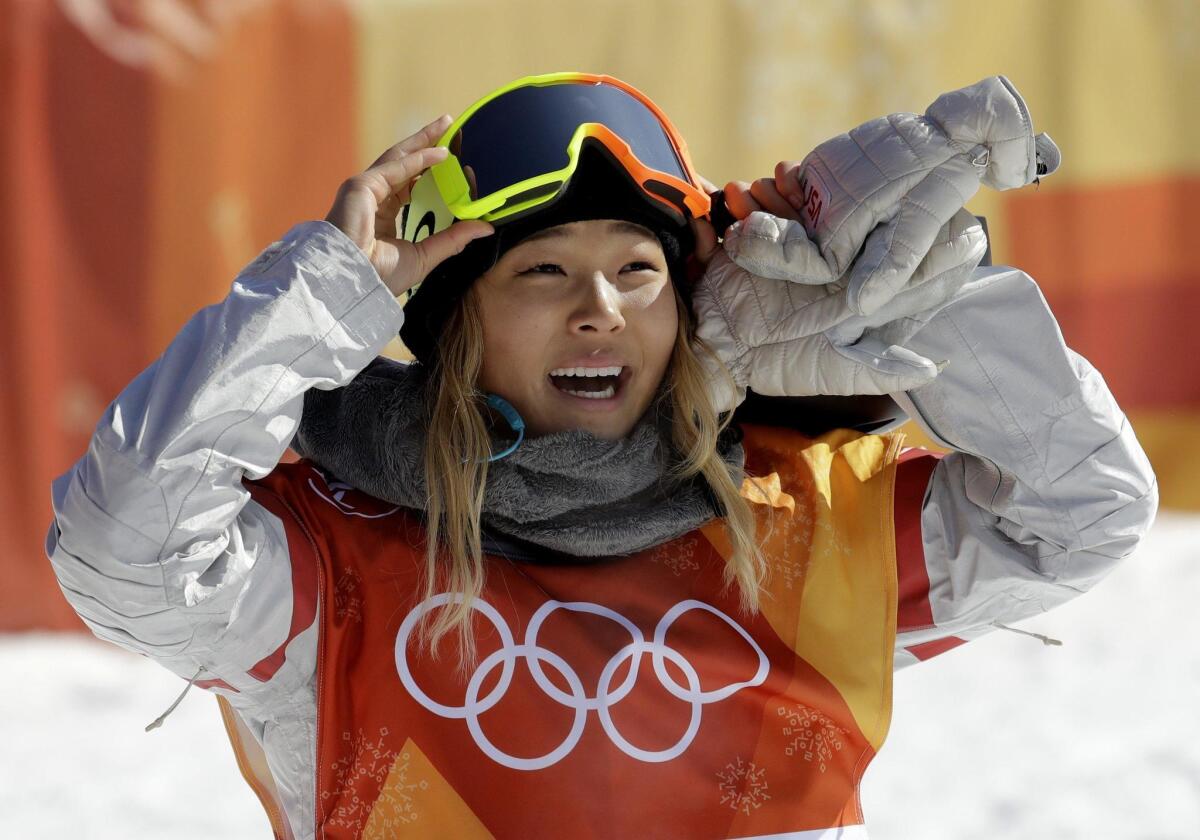
Sunday’s Winter Olympics TV schedule. All times Pacific.
11 a.m.: Winter Olympics review of best moments. NBCSN
12:45 p.m.: Repeat broadcast of women’s hockey gold medal match. NBCSN
5 p.m.: Closing Ceremony. NBC
8:30 p.m.: Repeat of 5 p.m. broadcast. NBC
11:35 p.m.: Repeat of 5 p.m. broadcast. NBC
- Share via
Closing ceremony is underway, and it’s cold!
- Share via
Crowds start filling stadium before the closing ceremony
We are about an hour from the start of the Pyeongchang 2018 Games closing ceremony. It is considerably warmer than the frigid weather at the opening ceremony.
The crowd has started filling the stadium and it seems a much more festive mood than at the opening.
We’ll be on the lookout for any Donald Trump and Kim Jong Un impersonators and any evidence of a cyberattack.
- Share via
Olympic Athletes From Russia win men’s hockey gold with 4-3 overtime victory over Germany
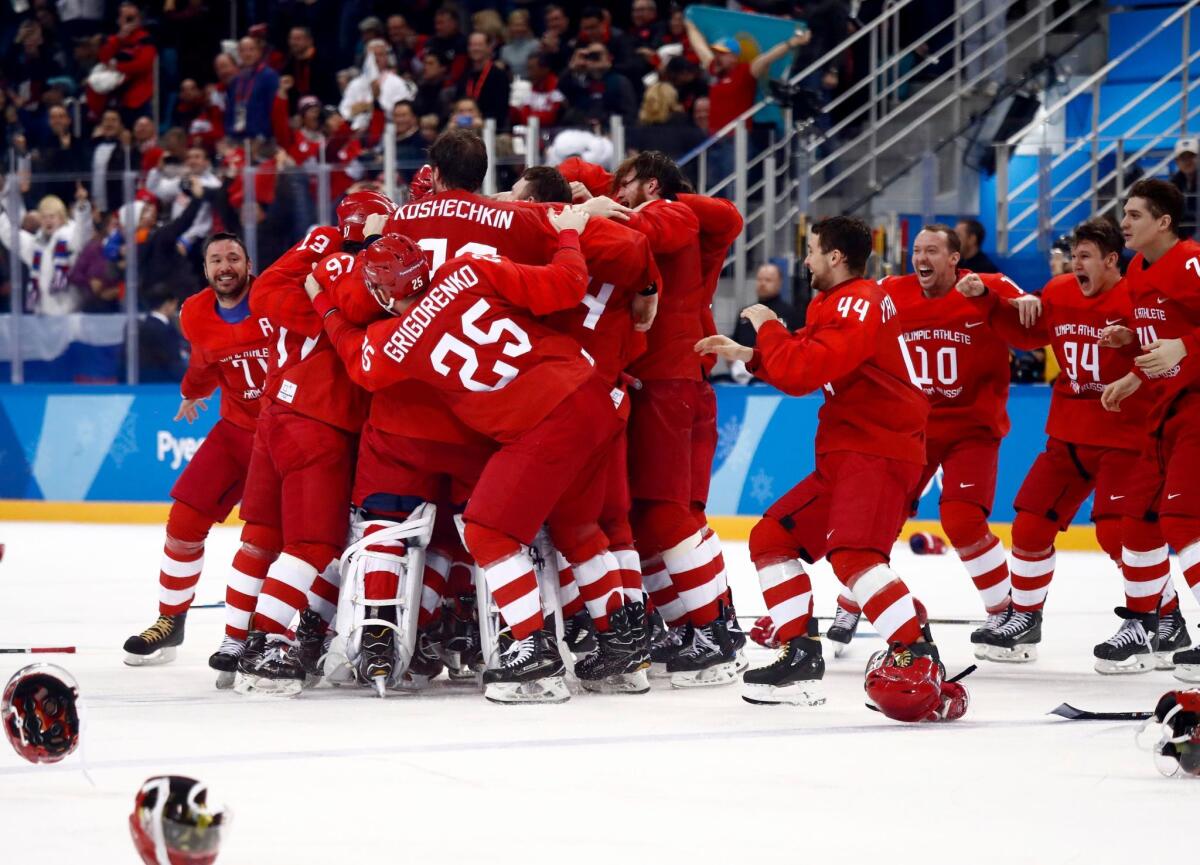
Kirill Kaprizov’s quick shot from the right circle during a power play gave the Olympic Athletes From Russia a 4-3 overtime victory over surprise finalist Germany and the gold medal in the men’s Olympic hockey tournament.
Kaprizov, whose NHL rights are owned by the Minnesota Wild, had a goal and four assists after he ended the game and the tournament nine minutes and 40 seconds into sudden-death play. Teammate Nikita Gusev, whose rights are owned by the Vegas Golden Knights, had two goals and two assists.
The gold medal was the first won by the team known variously as the Olympic Athletes From Russia / Russia / the Unified Team since a 1992 triumph in Albertville, France, as the Unified Team.
Former Kings defenseman Slava Voynov gave the Russians the lead with a half-second remaining in the first period. Germany failed to clear its zone and Russia controlled the puck, with former Tampa Bay forward Gusev eventually finding Voynov in the high slot for a quick shot that zipped past Germany goalie Danny Aus Den Birken. Kirill Kaprizov got the second assist.
Gusev’s NHL rights were traded by the Lightning to the Vegas Golden Knights last June. Voynov remains suspended by the NHL as a result of a domestic violence incident. He pleaded no contest to a misdemeanor charge and spent two months in jail. Afterward, he returned to Russia and signed a three-year contract with St. Petersburg of the KHL in 2015.
Germany tied it at 9:32 of the second period on a close-in shot that Russia goaltender Vasili Koshechkin knocked into the net with his own blocker. The goal was credited to Felix Schutz, a onetime Buffalo Sabres draft pick.
Germany tested Koshechkin several times in the second period, but he came up with some big saves.
The teams exchanged goals in the third period, with Gusev scoring from a sharp angle over the German goalie’s shoulder at 13:21 and Dominik Kahun cashing in from the slot off a pass from Frank Mauer at 13:31. Germany took the lead with 3:16 left in the third period on a shot by Jonas Muller from between the faceoff circles, but Russia tied it while killing a penalty. With Koshechkin pulled in favor of an extra skater, the Russians worked the puck down low and let Gusev work his magic. He again scored from a sharp angle deep on the left side, with 55.5 seconds left in the third, putting the puck over the helpless goalie’s shoulder.
Aus Den Birken made a memorable save in a generally conservative overtime, getting his left pad on a dangerous shot by former NHL standout Ilya Kovalchuk about 6 ½ minutes into four-on-four overtime. Kaprizov’s goal triggered cheers from a spirited crowd that was dominated by supporters of Russia. Fans chanted, waved Russian flags and banners, and a group sitting on the upper level, to the right of the goal at which the Russians shot in the first and third periods, wore shirts with letters that spelled out “Russia in my heart.”
- Share via
‘Team Reject’ gave U.S. historic medal in curling
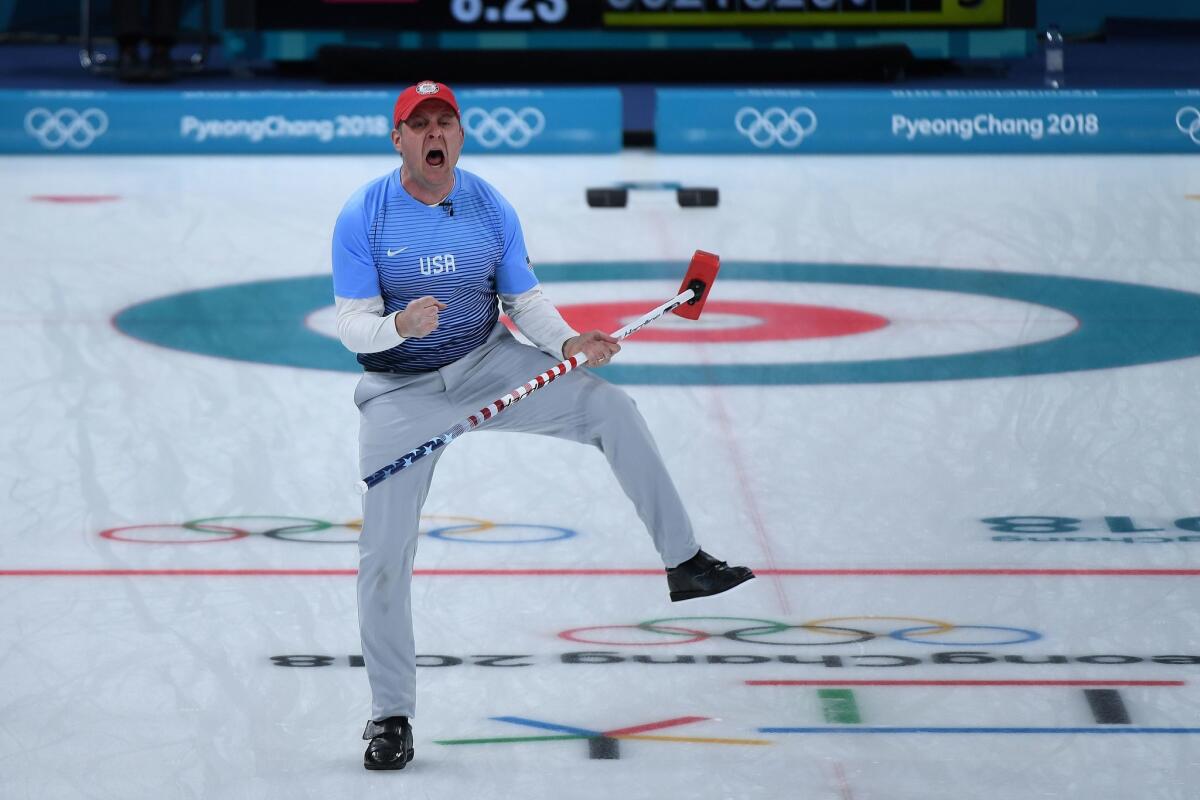
Their gold medals were intended for the women’s curling champions.
But that didn’t seem to bother John Shuster and the rest of the U.S. men’s curling team at the Gangneung Curling Center.
After all, minutes earlier they had shocked Sweden 10-7 on Saturday to win the first-ever U.S. gold medal in curling. The history was enough, even if the medals were wrong.
“A gold medal in curling is a gold medal in curling,” John Shuster, the team’s leader, said afterward.
Shuster and his motley crew had already been through enough to get to this place.
The small inscription on the medal didn’t matter.
After Shuster’s team finished second-to-last at the Sochi Olympics, USA Curling’s high-performance program rejected him. So, the easygoing former bartender, who is a part-time employee at Dick’s Sporting Goods, persuaded Tyler George, Matt Hamilton and John Landsteiner to go it alone.
They quickly came up with an unusual nickname.
“I don’t think ‘team of rejects’ is the right term,” said Shuster, who also competed at the Turin and Vancouver Games. “I think it was just ‘team reject.’ ”
The rejects eventually won the national championship in 2015 -- beating the two high-performance-program teams. They represented the U.S. at the world championship the same year, then were added to the high-performance program in 2016.
“We never held it against anybody who didn’t want us in the program,” Shuster said.
The path at the Pyeongchang Olympics wasn’t much easier.
Shuster’s group dropped four of their first six matches and faced long odds to qualify for the medal round. But they defeated Canada, Great Britain and Switzerland -- three of the world’s top teams -- to advance.
In the semifinals, the U.S. beat Canada -- the defending Olympic champion -- to reach the gold-medal match against Sweden, the second-ranked group in the world.
And they ended up with gold medals, even if they were for the women’s winners.
“From the day the 2014 Olympics came to an end, every single day was with this journey in mind and I was extremely lucky with these incredible guys ... went along with me in not being selected for the high-performance program because this wouldn’t have ever happened,” Shuster said. “My family has a mantra and I have a mantra that everything happens for a reason. It’s days like today that you just have to believe.”
- Share via
Norovirus outbreak at Pyeongchang Olympics appears over
As the Pyeongchang Olympics winds down, the norovirus outbreak that’s lurked in the background of the Games is doing the same.
In the latest numbers released Saturday by the Korean Centers for Disease Control and Prevention, 321 staff and volunteers have been diagnosed with norovirus, but only two remain quarantined.
The outbreak of the highly contagious disease was traced to contaminated water used in food preparation at the Horeb Youth Center.
The outbreak, initially among security personnel, spread from Pyeongchang to the coastal town of Gangneung, which hosts indoor events at the Games.
- Share via
IOC upholds ban on Russia because of doping scandal
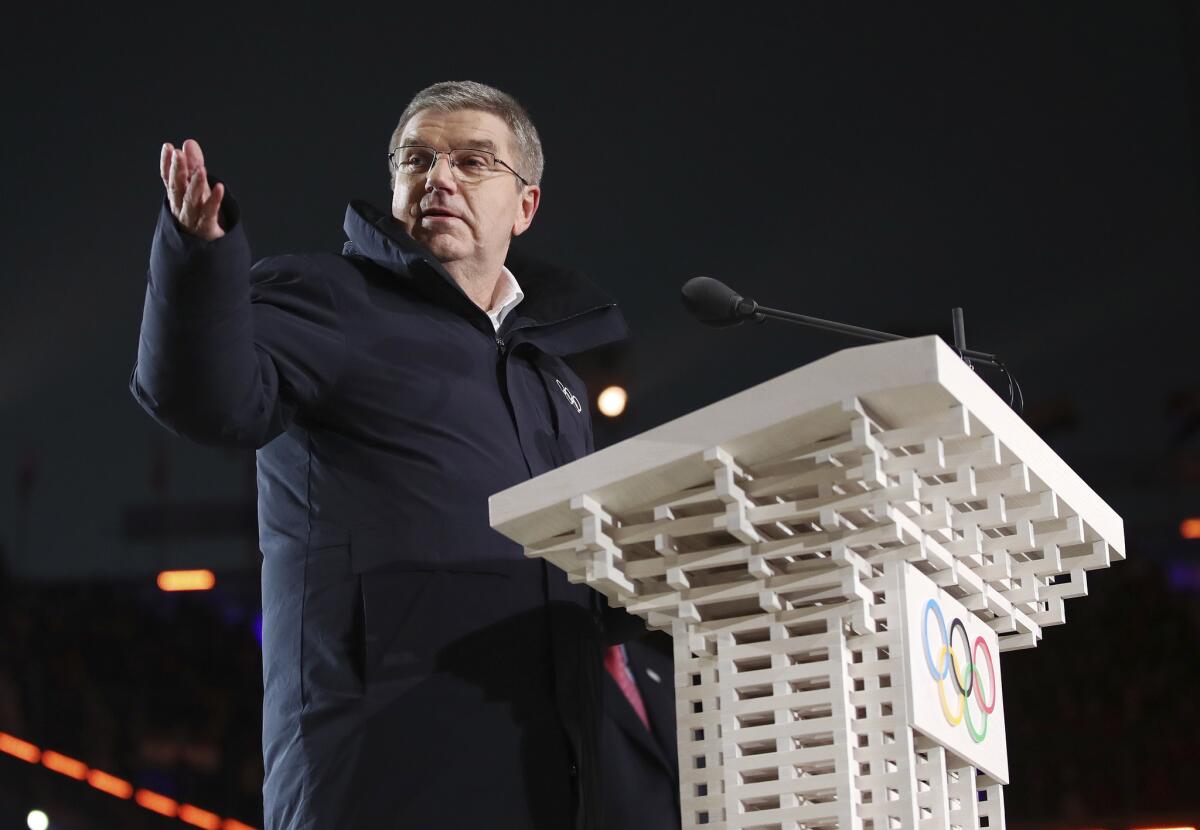
The International Olympic Committee executive board has recommended upholding the ban of Russia from the Pyeongchang Winter Games because of a massive doping scandal.
The full membership will vote on the proposal Sunday ahead of the closing ceremony.
The IOC could readmit the Russian team, continue the ban or hedge with what it has described as a “partial solution.”
IOC President Thomas Bach says a condition for Russia’s reinstatement is no further positive drug tests at these Olympics. Two of the four athletes who tested positive in Pyeongchang were competing as “Olympic Athletes from Russia.”
Russia was banned from the Olympics because of widespread doping at the 2014 Sochi Games.
- Share via
Do you believe in miracles? U.S. men top Sweden for curling gold
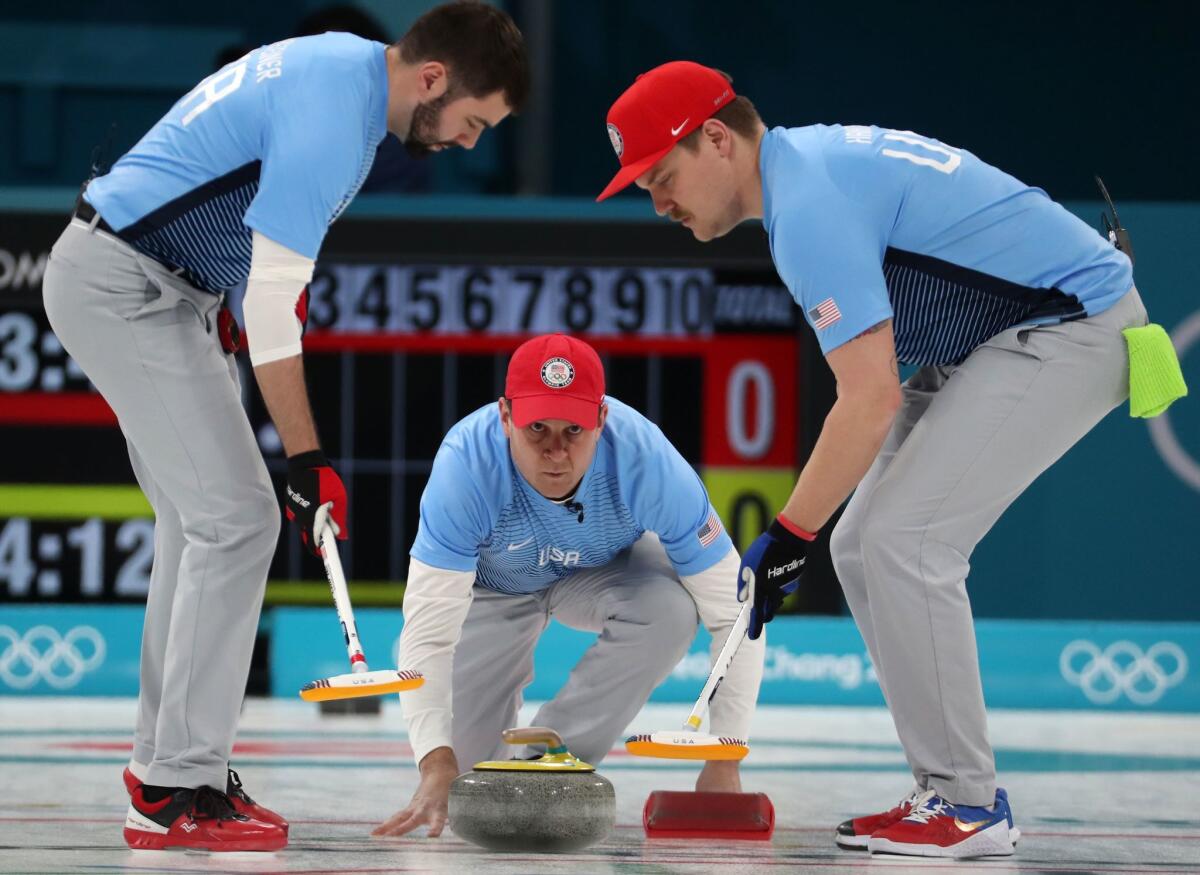
John Shuster’s last throw in the eighth end of the Olympic curling final clacked off one Swedish stone and knocked it into another, sending them both skittering out of scoring range.
Five yellow-handled American rocks were left behind.
The score, known as a five-ender, is so rare it has only been topped once before in the history of the men’s or women’s Olympic final. And it effectively clinched gold for Shuster’s erstwhile “rejects,” who rallied from the brink of pool play elimination to claim only the second curling medal ever for the United States.
“It’s hard to rationalize wanting to do it,” vice-skip Tyler George said after the Americans beat favored Sweden 10-7 in nine ends in the gold medal match on Saturday. “But then days like this happen.”
With the King of Sweden and Ivanka Trump looking on — and bolstered by social media messages from actor Mr. T., NFL quarterback Aaron Rodgers and speedskater Dan Jansen — Shuster skipped the Americans from a 2-4 record at the start of pool play to five wins in a row, starting with a victory over three-time defending Olympic champion Canada.
No U.S. curling team, men or women, had ever beaten Canada at the Winter Games.
Shuster’s team did it again in the semifinals.
That set up a gold medal match with Sweden, the world championship runner-up and top winner in pool play, including a 10-4 victory over the Americans on Feb. 16.
After three back-and-forth ends in the final, the Swedes squandered a point in the fourth despite having the last-rock advantage, known as the hammer. (The call was too close to be made with the naked eye; an umpire measured it with a gadget that is calibrated to the millimeter.)
From there, Sweden was playing catch-up.
Tied 5-5 in the eighth, but with the Americans controlling the hammer, Sweden skip Niklas Edin failed on a double-takeout, clearing away just one of the two stones he was aiming for. That left Shuster with a relatively routine shot for an almost unprecedented score. (Canada’s six-ender in the 2006 men’s final was the only other score of more than four in an Olympic gold medal match).
“During the entire end we could kind of feel it building. Their margin for error got really small,” Shuster said in the news conference with teammates team Tyler George, Matt Hamilton, John Landsteiner and alternate Joe Polo. “I can’t tell you how un-nervous I was sitting in the hack to throw it. Just let it go.”
The Americans played defense in the ninth end to avoid giving up a big score. Sweden scored two, but with the hammer going to the United States for the 10th, a victory was out of reach.
On his second-to-last stone, Edin made a spin-o-rama out of the starting block, bringing laughter from the crowd.
Then he shook hands to concede the match.
“When I missed [in the eighth], we knew for sure he was going to make that double, and we knew we were going to lose,” said Edin, who said he threw in the spin move to lighten the mood so that perhaps he could “get a silver medal without throwing it into the sea.”
“I don’t know if I would use the word ‘fun’ in that situation,” Edin said. “Instead of just shaking hands, it was one of those moves that you’re trying to give the crowd, all the disappointment we felt, give them a little something back.”
With Trump, the president’s daughter, clapping along, the American fans in the crowd chanted, “U-S-A!”
Switzerland, which beat Canada in the third-place game on Friday, joined the finalists on the podium to receive its bronze medals. Sweden got silver.
But when the Americans looked at the medals draped around their necks, there was a problem: They had been given the ones engraved for the women’s winners. The correct medals were quickly swapped out.
Shuster brushed it off: “A gold medal in curling is a gold medal in curling.”
South Korea will play Sweden in the women’s final on Sunday. Japan beat Britain 5-3 in the women’s bronze medal match on Saturday.
A four-time Olympian who won bronze in 2006 with Polo — the United States’ only other curling medal — Shuster left that team after Turin to form his own foursome and skipped them back to the Winter Games in Vancouver.
But he performed so badly he was benched, and then finished ninth of 10 teams in Sochi. After failing to make the national training program the next year, Shuster teamed up with two of the others who were cut (and George, who hadn’t even tried out) and called themselves “Team Reject.”
They beat all of the teams chosen instead of them.
“From the day the 2014 Olympics came to an end, every single day was with this journey in mind,” said Shuster, adding that he was inspired by Jansen’s ability to bounce back from six years of tragedy and Olympic failure to win his final speedskating race.
“Time and time again, he got back up and he wrote his story, and he’s an Olympic champion,” Shuster said. “I’m so proud that I was able to do something similar.”
- Share via
Saturday’s Winter Olympics TV schedule
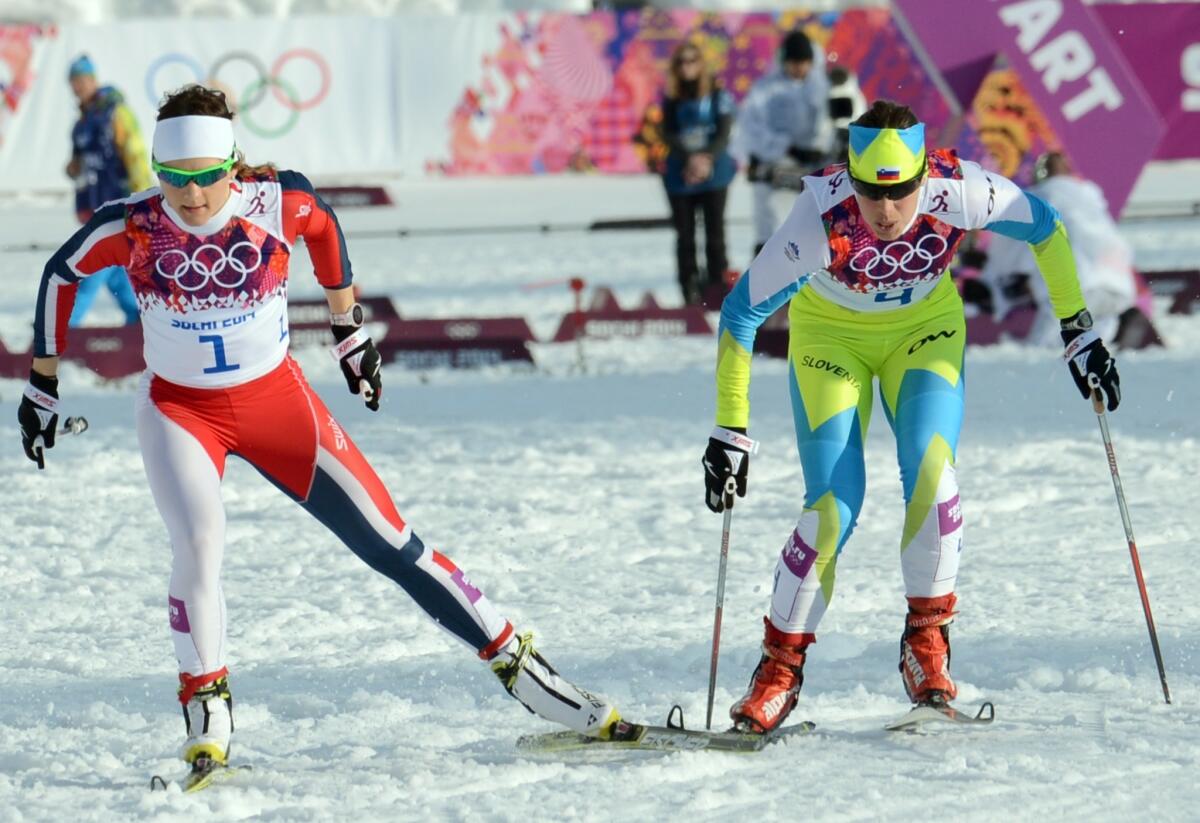
Saturday’s Winter Olympics TV schedule. All times Pacific.
6:30 a.m.: Curling (men’s gold-medal match, U.S. vs. Sweden). NBCSN
9:30 a.m.: Speedskating (men’s and women’s mass start). NBCSN
10:30 a.m.: Curling (women’s bronze-medal match). NBCSN
Noon: Speedskating (men’s and women’s mass start), cross-country skiing (men’s 50-kilometer race). NBC
1 p.m.: Men’s hockey (bronze-medal match). NBCSN
4:05 p.m.: Curling (women’s gold-medal match). NBCSN
5 p.m.: Bobsled (men’s four-man, final two runs), figure skating (gala exhibition). NBC
7:30 p.m.: Men’s hockey (gold-medal game). NBCSN
8 p.m.: Repeat of 5 p.m. broadcast. NBC
11 p.m.: Cross-country skiing (women’s 30-kilometer).
12:30 a.m. (Sunday morning): Repeat of 5 p.m. broadcast. NBC
1 a.m. (Sunday morning): Figure skating gala exhibition. NBCSN
3 a.m. (Sunday morning): Men’s hockey (gold-medal game). NBCSN
- Share via
Kyle Mack wins silver medal in Olympic debut of Big Air
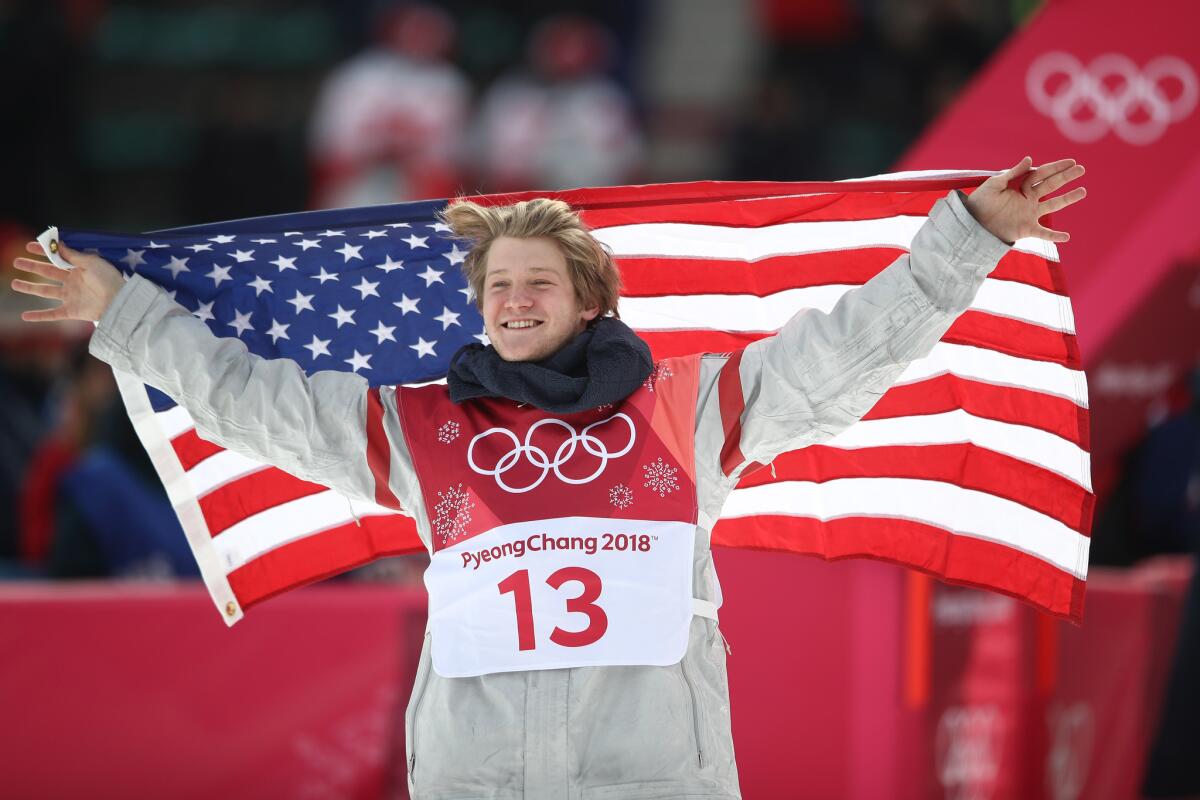
Canadian snowboarder Sebastien Toutant has soared to gold in the Olympic debut of men’s Big Air.
Toutant scored a 174.25 in the final to give Team Canada its 11th gold of the Pyeongchang Games.
Kyle Mack of the United States took second with a score of 168.75. He had a chance to better Toutant but sat down on his third and final jump.
Billy Morgan of Great Britain earned bronze in front of a boisterous crowd at Alpensia Ski Jumping Centre.
Ivanka Trump was also in attendance. The daughter of president Donald Trump took in the finals as part of a whirlwind tour during the penultimate day of the games. Wearing a red ski suit with a blue knit USA cap, Trump joined Kim Jung-sook, wife of South Korean president Moon Jae-in.
Red Gerard, who captured the first gold medal for the United States in Pyeongchang in the slopestyle event two weeks ago, finished fifth.
- Share via
Jessie Diggins will carry the flag for the U.S. at closing ceremony

This has been a good week for Kikkan Randall and Jessie Diggins.
On Wednesday night, they became the first U.S. women to earn a medal in cross-country skiing, winning the team sprint free. The next day, Randall was elected as an athlete representative on the International Olympic Committee.
Friday, it was Diggins’ turn for more good news as her teammates selected her to serve as flag-bearer for the American squad in the closing ceremony of the 2018 Winter Games.
“This is such an incredible honor for me,” Diggins said. “I’m really humbled and moved that the athletes voted for me.”
The two-time Olympian joins a list of former closing ceremony flag-bearers that includes Dan Jansen, Bonnie Blair and Eric Heiden.
“Jessie’s breakthrough performances here in Pyeongchang have been inspirational and historic,” U.S. Olympic Committee Chief Executive Scott Blackmun said.
The closing ceremony is scheduled for Sunday night at Olympic Stadium.
- Share via
Germany upsets defending champion Canada to reach men’s gold medal hockey game against Olympic Athletes from Russia
Germany recorded the biggest upset of the men’s Olympic hockey tournament by holding off Canada for a 4-3 semifinal victory on Friday, setting up an unexpected gold medal matchup on Sunday against the Olympic Athletes from Russia.
“Sounds crazy, right?” said Germany coach Marco Sturm, a former NHL player who briefly played for the Kings.
That it did. Germany, seeded 10th among the 12 entrants, last won an Olympic medal in 1976, a bronze. Germany didn’t qualify for the 2014 Sochi Olympic tournament. The Olympic Athletes from Russia defeated the Czech Republic 3-0 in the first semifinal on Friday at the Gangneung Hockey Center, a victory clinched on an empty-net goal by former NHL standout Ilya Kovalchuk.
Top-seeded Canada won the last two men’s Olympic gold medals but had a roster built around NHL stars on those occasions. The NHL did not permit players to participate in the Pyeongchang Games, leaving teams to draw players from leagues across Europe. That became an equalizer and helped boost the chances of teams such as Germany that have few NHL players.
Germany forward Brooks Macek, who was born in Winnipeg, Canada and was eligible to play for Germany because his father was born there, said he almost couldn’t believe what he and his teammates had done. “It’s amazing. It took every single guy in that dressing room to put forth their best effort for the whole 60 minutes and I think we did that. It’s an amazing feeling,” said Macek, who was drafted by the NHL’s Detroit Red Wings but never signed with them. “This is absolutely huge in Germany. The main sport is soccer and there’s nothing else. It’s just all soccer. If there’s kids back home back in Germany watching this game, maybe it will push them towards playing ice hockey I think it’s absolutely massive for the sport in Germany.”
Macek gave Germany a 1-0 lead in the first period with a five-on-three power-play goal. The Germans added second-period goals by Matthias Plachta and Frank Mauer before Canada’s Gilbert Brule converted a power-play chance at 8:17. Brule was ejected later in the period for a check to the head and neck of Germany’s David Wolf.
Patrick Hager padded Germany’s lead to 4-1, but Canada’s Mat Robinson trimmed that to 4-2 at 2:42 of the third. Canada goaltender Kevin Poulin, playing in place of the injured Ben Scrivens, stopped a penalty shot by Dominik Kahun at 3:21 of the third to keep Canada in the game. Canada closed the gap to 4-3 on a power-play goal by Derek Roy from close range at 9:42 of the third period but Germany goalie Danny Aus Den Birken, who plays in his country’s elite league, withstood intense pressure and held on for the win.
“It’s the greatest day in German hockey,” said defenseman Christian Ehrhoff, another former King.
It was a dark day for Canada, which will face the Czech Republic for the bronze medal on Saturday.
“They came out ready to play. We didn’t. They were the better team today,” Canada forward Rob Klinkhammer said. “There’s no reason not to be ready. Just credit to them. I know it’s a huge win for them. Best of luck to them.
“It stings a lot right now with the opportunity we had. We let a big one get away from us.”
- Share via
Friday’s Winter Olympics TV schedule
Friday’s Winter Olympics TV schedule. All times Pacific.
6:30 a.m.: Curling (men’s bronze-medal match, Canada vs. Sweden). NBCSN
9:30 a.m.: Curling (women’s semifinal, teams TBD). NBCSN
Noon: Biathlon (men’s 30-meter relay), Figure skating (review of women’s competition). NBC
12:30 p.m.: Medal ceremonies from various events. NBCSN
1 p.m.: Hockey (teams TBD). NBCSN
2:30 p.m.: Curling (women’s semifinal, teams TBD). CNBC
5 p.m.: Bobsled (men’s four-man, runs 1 and 2), speedskating (men’s 1,000 meters), snowboarding (men’s big air). Alpine skiing (team event). NBC
5 p.m.: Biathlon (men’s 30-meter relay). NBCSN
6:30 p.m.: Curling (women’s semifinal, teams TBD. NBCSN
8:35 p.m.: Snowboarding (men’s and women’s parallel giant slalom). NBC
9 p.m.: Cross-country Skiing (men’s 50-kilometer). NBCSN
10:35 p.m.: Repeat of 5 p.m. broadcast. NBC
Midnight: Curling (men’s gold-medal match, U.S. vs. Sweden). NBCSN
1:35 a.m. (Saturday morning): Repeat of 5 p.m. broadcast. NBC
3:30 a.m. (Saturday morning): Men’s hockey (bronze-medal game, teams TBD). NBCSN
- Share via
Second Russian athlete fails doping test at Olympics
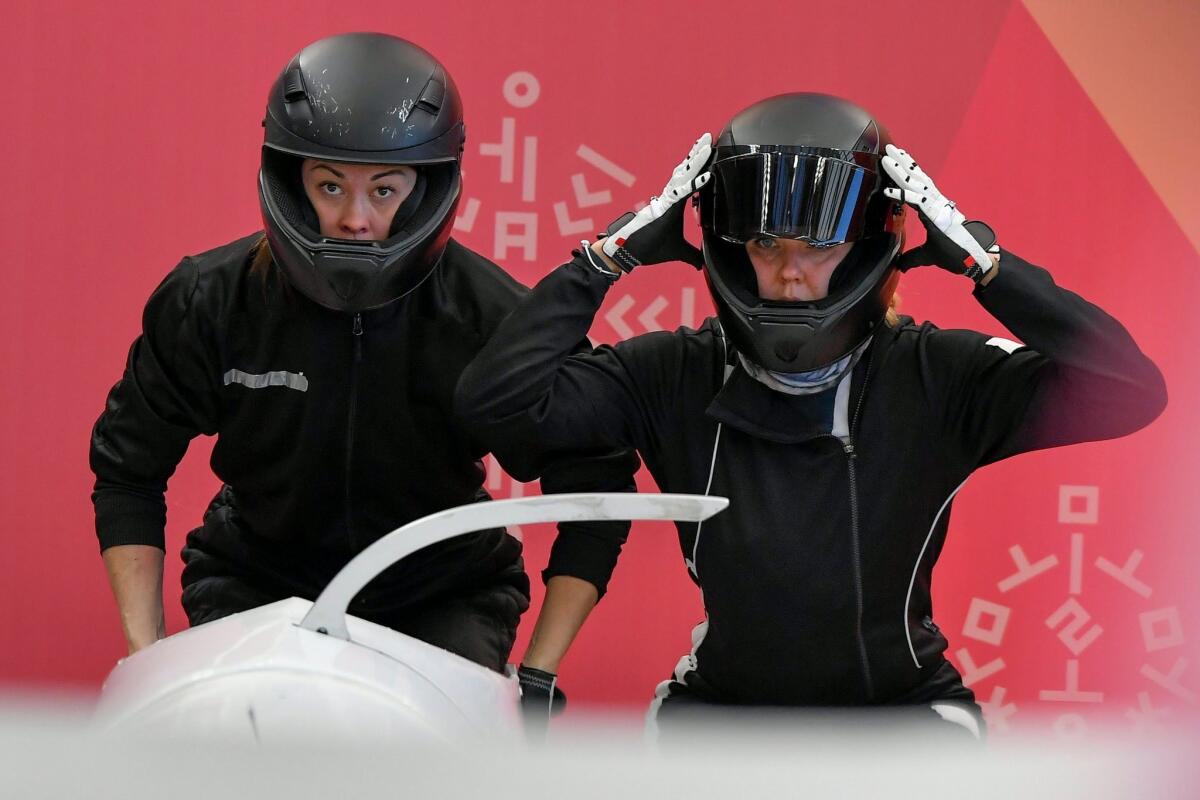
A second Russian athlete has failed a doping test at the Pyeongchang Games, a day before the International Olympic Committee’s executive board is to decide whether to reinstate the country for Sunday’s closing ceremony.
Russian Bobsled Federation President Alexander Zubkov told the Associated Press on Friday that a drug-test sample that pilot Nadezhda Sergeeva gave on Sunday was positive.
The Russian delegation at the Pyeongchang Olympics said in a statement that the substance found was trimetazdine, a medication used for angina sufferers that is listed by the World Anti-Doping Agency as a banned substance affecting the metabolism.
“She confirms she took no such medication and the team confirms she was not issued any medication,” said Zubkov, a former bobsledder who himself was stripped of two Olympic gold medals for the Russian doping scheme at the 2014 Sochi Games. “Federation representatives at the Olympics” are starting to prepare a defense, he said.
Zubkov also said a sample she had given five days earlier was negative.
“I can tell you that on the 13th it was clean, but on the 18th it gave a positive result for the heart medication,” he said.
Sergeeva’s crew finished 12th in the women’s bobsled competition on Wednesday, after she had given the sample that later came back positive.
The Russian team was barred from the Olympics in December for doping at the Sochi Games, but the IOC invited 168 athletes from the country to compete under the Olympic flag.
“This won’t win us any extra credit,” Russian delegation leader Stanislav Pozdnyakov said in comments reported by Russian media. “Unfortunately this case speaks to negligence by the athlete. She has let us down.”
Earlier this month, Sergeeva told the AP that competitors from other countries had warmed to her after she passed IOC vetting for Pyeongchang, which included an examination of her drug-testing history.
“I don’t know why, but they’ve started talking to us more than ever before. I feel it. Maybe it’s a sign to them that we’re clean,” Sergeeva said. “There’s a lot of people coming up and saying, `We’re happy you’re here.“’
At the time, she was training in a T-shirt with the words “I Don’t Do Doping.” Sergeeva used to compete in track and field as a heptathlete before switching sports in 2010.
It is the fourth doping case of the Games. Russian curler Alexander Krushelnitsky was stripped of his bronze medal Thursday after testing positive for the banned substance meldonium. Slovenian hockey player Ziga Jeglic and Japanese speedskater Kei Saito also left the Games after testing positive.
Trimetazidine, the substance found in Sergeeva’s sample, has been detected in previous doping cases. Chinese swimmer Sun Yang, an Olympic gold medalist, was banned for three months in 2014 by his country’s sports authorities after testing positive for the substance.
Sun said he had been prescribed the drug for a medical condition and hadn’t known it was banned. The perceived leniency of that three-month ban led to Sun receiving criticism from swimmers from other countries at the 2016 Olympics in Rio de Janeiro, where he won another gold medal.
Russia’s bobsled program has been in the spotlight for drug use for several years.
Zubkov and four other bobsledders were disqualified from the Sochi Games for doping, though four other bobsledders have been reinstated. Another gold medalist, Dmitry Trunenkov, was banned last year for failing a doping test.
- Share via
Shani Davis refuses to address media after seventh-place finish in 1,000-meter speedskating
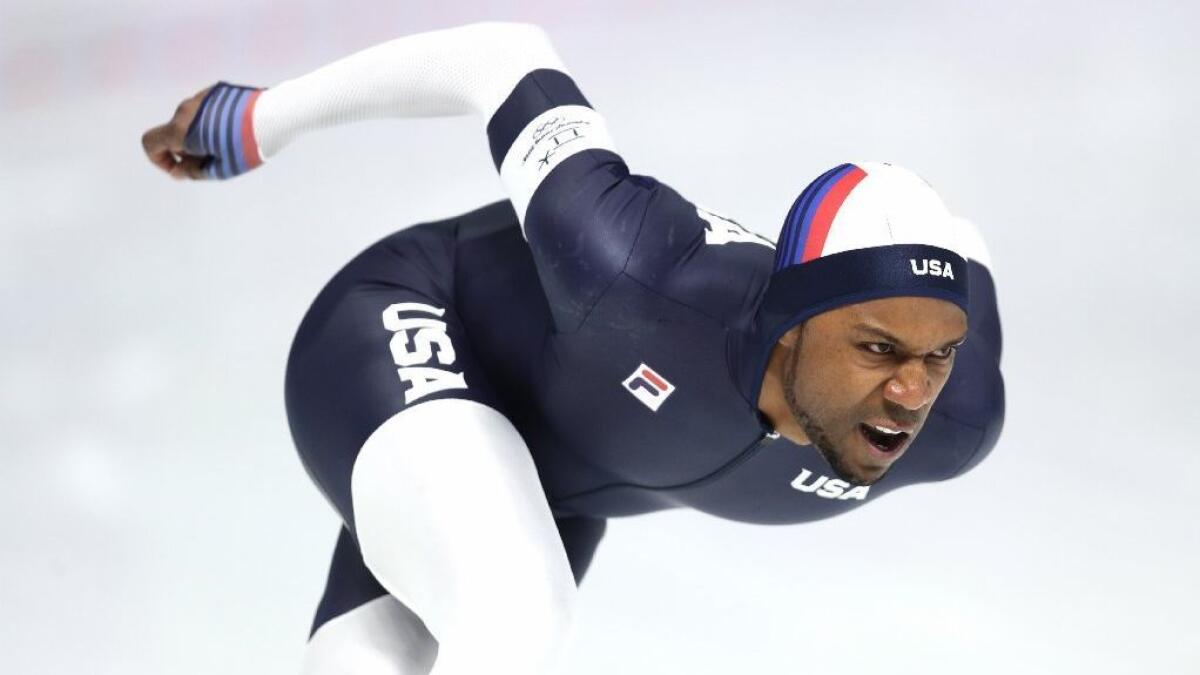
In what is probably Shani Davis’ last Olympic Games, the decorated speedskater decided not to address the media after his seventh-place finish in the men’s 1,000-meter race at the Gangneung Ice Arena.
Davis has courted controversy in these Games by criticizing the way the United States Olympic Committee selected the person who carried the U.S. flag during the opening ceremony.
- Share via
Cashing in medals for money is tough sledding for most U.S. Olympians
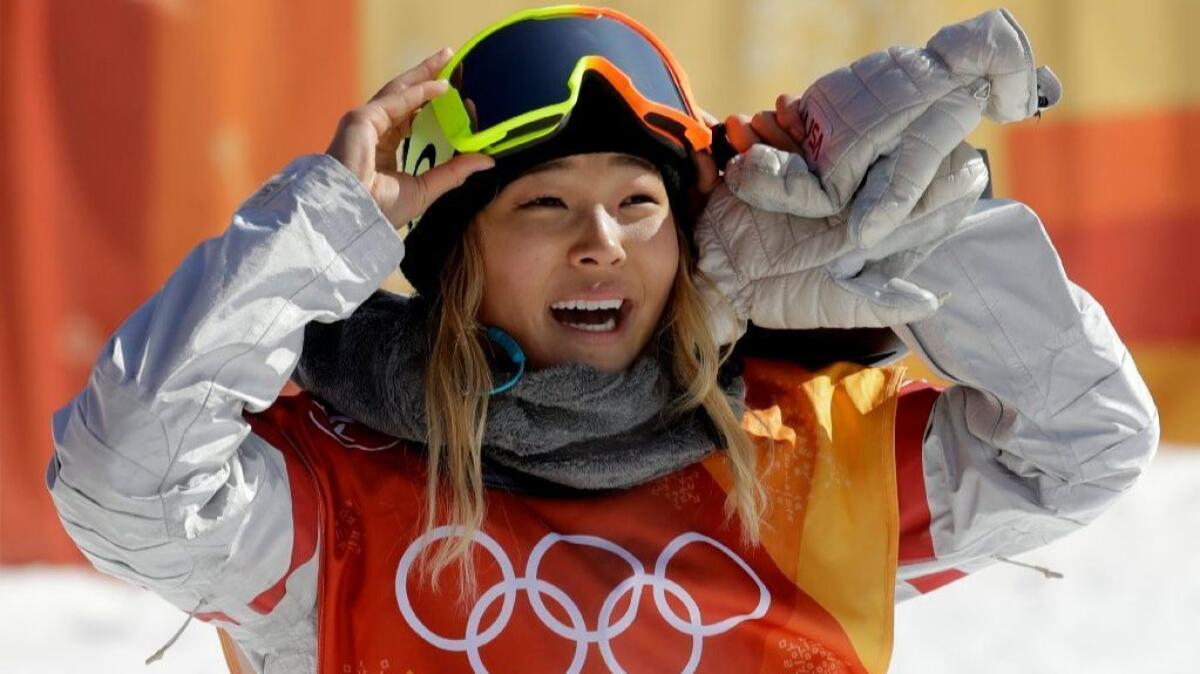
When she arrived for the Winter Olympics in South Korea, Chloe Kim already was an accomplished snowboarder with a handful of endorsement deals from the likes of Visa Inc., Nike Inc. and Toyota Motor Corp.
Then came her dominating performance to win the gold medal in the women’s snowboarding halfpipe in Pyeongchang, and the charismatic 17-year-old Southern Californian instantly became a breakout star of the Olympic Games with a future likely to include much more lucrative sponsorship deals.
- Share via
Alina Zagitova wins figure skating gold with thrilling performance
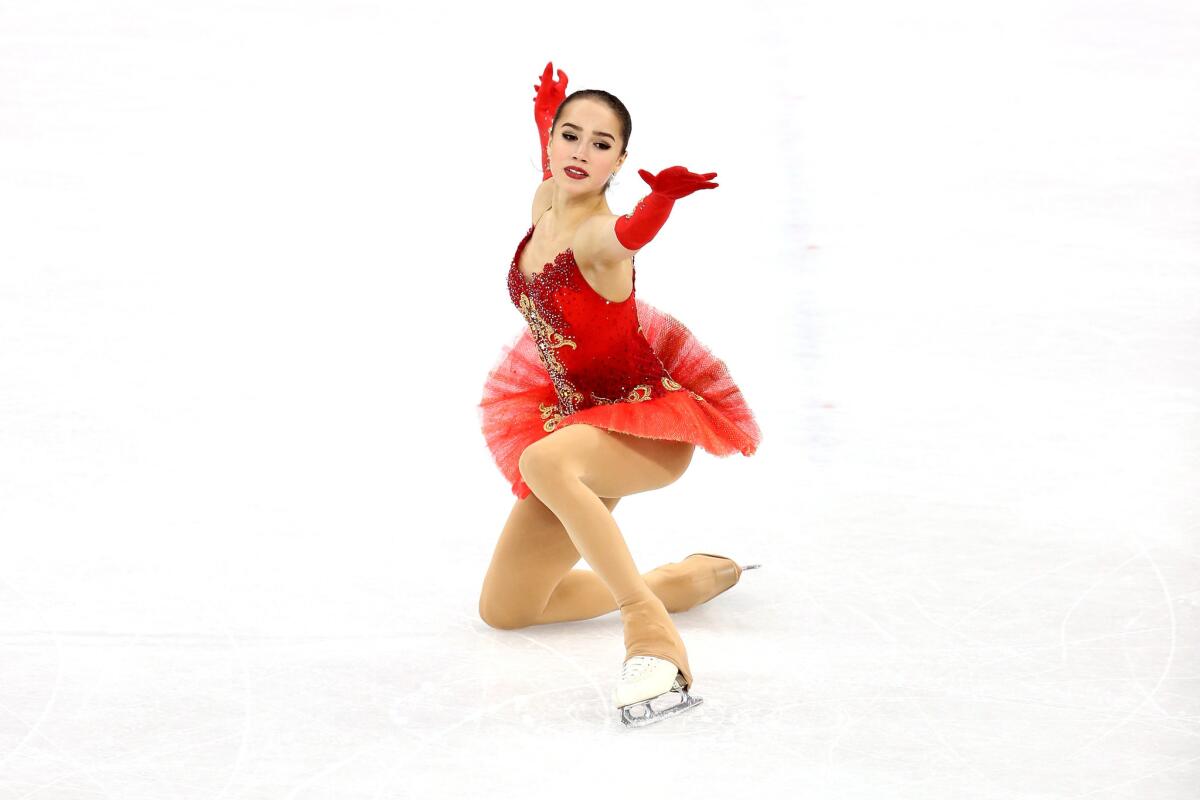
Alina Zagitova has won the women’s figure skating competition, becoming the first Russian gold medalist at the Pyeongchang Olympics.
The 15-year-old Zagitova edged her friend and training partner Evgenia Medvedeva to end the gold drought for the Olympic Athletes from Russia. That’s the designation given to the nation’s competitors after Russia was officially banned by the IOC for a doping scandal.
Zagitova and Medvedeva tied in the free skate, a rare occurrence, but Zagitova had won the short program Wednesday, so she got gold.
Kaetlyn Osmond has won bronze, giving Canada four overall medals in figure skating.
- Share via
Figure Skating Live: Worst showing ever for U.S. women in figure skating
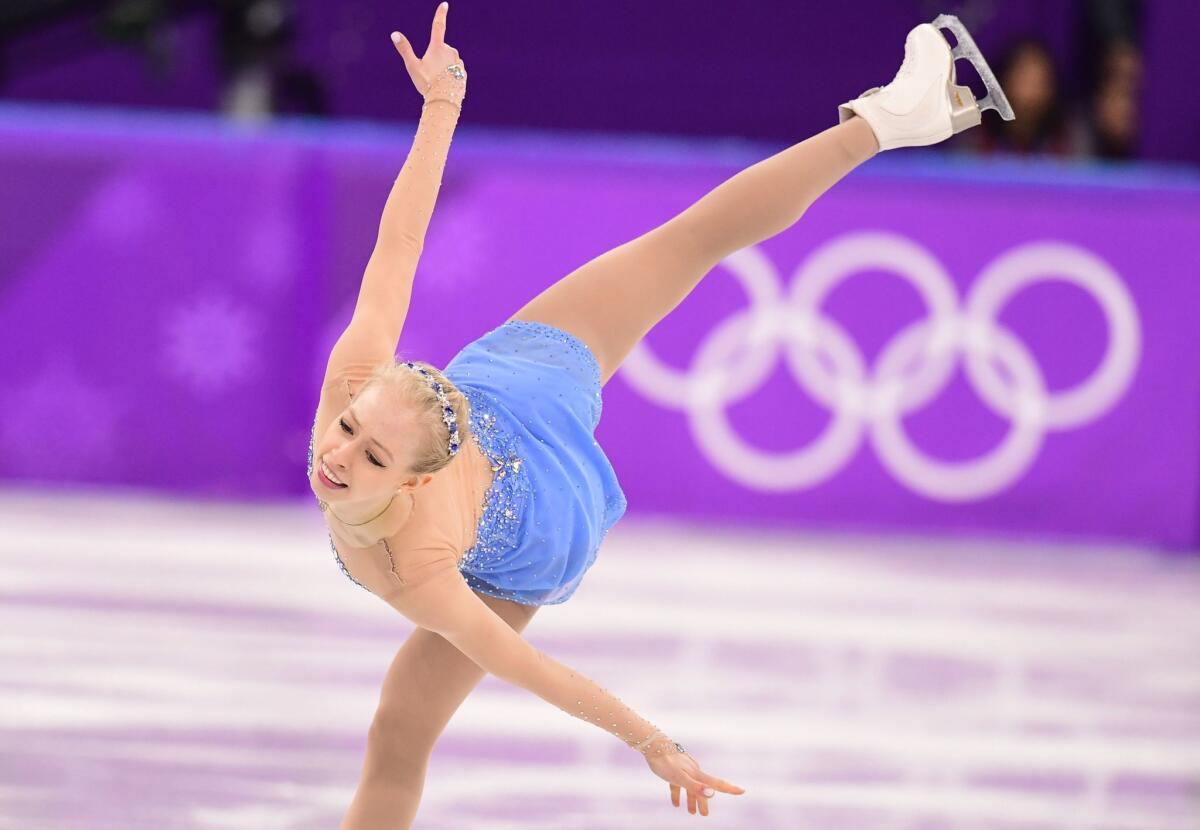
8:10 p.m.
The Americans secured their worst showing in modern-era Olympic women’s figure skating with Mirai Nagasu failing to get any lift on her triple axel and popping a triple lutz.
The 24-year-old Nagasu was fourth at the 2010 Vancouver Games but never got going in the individual competition at the Pyeongchang Games after helping the U.S. win a team bronze. She hit her triple axel in that event, becoming the first American woman and third overall to do so in an Olympics. But she slipped below U.S. champion Bradie Tennell in the standings after Friday’s free skate, with 2017 national champ Karen Chen just behind.
With the top six skaters to go, the Americans almost certainly will wind up ninth, 10th and 11th. Since World War II, at least one American woman finished sixth or higher.
8:00 p.m.
Marai Nagasu didn’t have the performance she needed to put a scare into the leaders after she missed on a couple of her signature jumps. Nagasu slotted into fourth place between teammates Tennell and Chen and looks to finish near or in the top 10.
The top skaters are now getting to skate and this is where the true drama will take place.
7:40 p.m.
Americans Bradie Tennell and Karen Chen started at 10th and 11th, respectively at the free skate portion of the women’s figure skating event and that looks to where they will end after the final long program.
Tennell and Chen currently sit second and third behind Maria Sotskova of Olympics Athletes of Russia with eight skaters to go, including their teammate Mirai Nagasu.
Alina Zagitova and Evgenia Medvedeva are the two favorites heading into the final groups of the evening.
- Share via
David Wise wins halfpipe gold after enduring adversity on and off the slopes
There were moments during the last four years when David Wise wasn’t sure if he would survive.
The defending Olympic ski halfpipe gold medalist endured the worst two seasons of his career. He suffered three concussions, plus serious injuries to his shoulder and back. His wife, Alexandra, experienced severe postpartum depression. Sponsors fled. His sister, Christy, lost her right leg in a boating accident and nearly died. One of Wise’s students committed suicide.
“There are two ways to react to adversity in life,” Wise, 27, wrote on his blog recently. “One way is to feel slighted and to allow yourself to be bitter. The other is to use the adversity to your advantage and gain strength and momentum from it. I choose the latter.”
- Share via
What time is the Winter Olympics closing ceremony and when can I watch it?
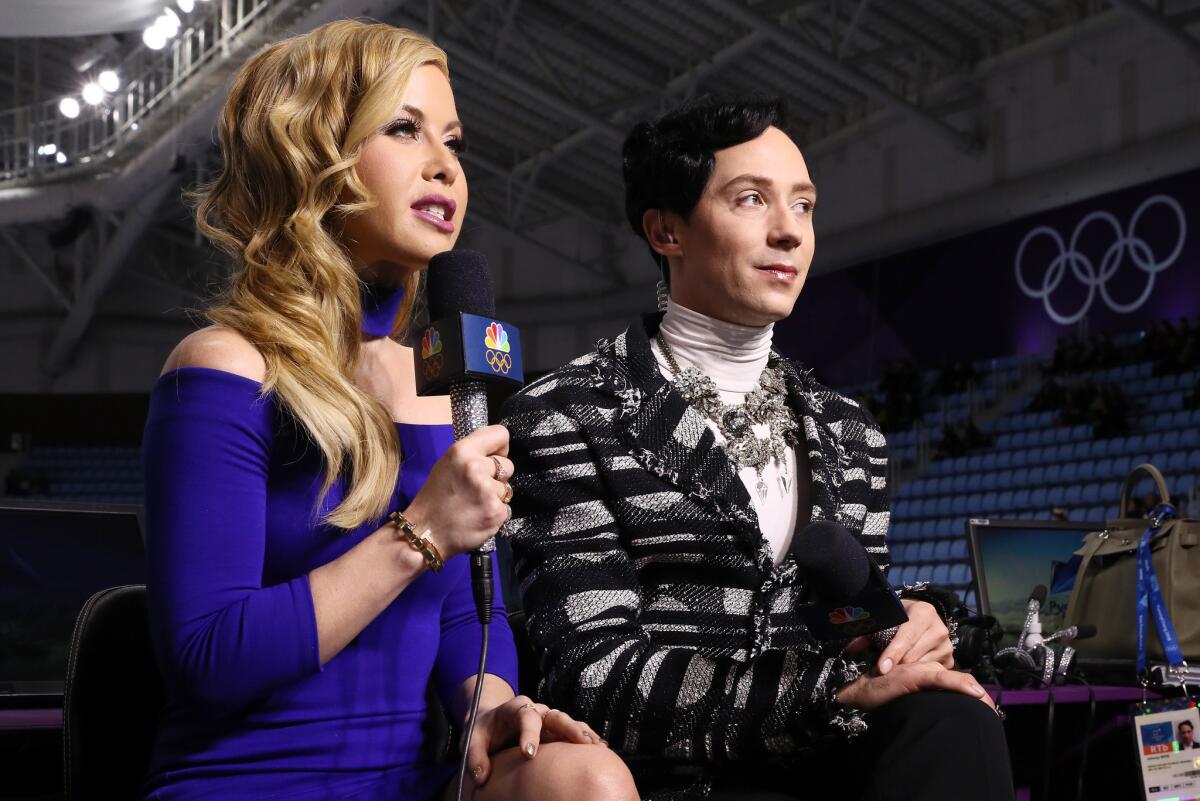
Tara Lipinski and Johnny Weir will be there. So will Ivanka Trump. And very likely so will at least one K-Pop star, as well as many of the athletes we’ve grown to know and love during the two-plus weeks of the Pyeongchang Winter Olympics.
But the majority of us will not be at this weekend’s closing ceremony in South Korea. Lucky for us, though, there’s several opportunities to watch.
Anyone who feels the need to watch the event as it unfolds Sunday at 3 a.m. Pacific time can do so at NBCOlympics.com or by using the NBC Sports app. Those who prefer to be well rested while they watch can tune in to taped broadcasts of the ceremony on NBC at 5 p.m. and again at 8 p.m.
Skating commentators Lipinkski and Weir, along with their broadcast partner Terry Gannon, will host the event during the prime-time broadcasts. Trump, daughter of and senior advisor to President Trump, will lead the U.S. delegation at the ceremony.
- Share via
Sven Kramer apologizes after he and teammates injure fans by throwing a large object into a crowd
Dutch speedskater Sven Kramer has issued an apology after he and several teammates accidentally injured two fans by throwing a giant replica of a bronze medal into a crowd during a promotional event at the Pyeongchang Olympics.
Kramer won his third straight Olympic gold medal in the 5,000 meters earlier in these Games. He and teammates Jan Blokhuijsen, Patrick Roest and Koen Verweij also won bronze in the team pursuit, bringing Kramer’s career Olympic medal count to nine.
Those four speedskaters were onstage at an event held at the Heineken House on Wednesday night when they received a giant replica of their bronze medal and somehow thought it would be a good idea to toss it into the crowd.
Two women were injured, with one of them needing to go to a hospital, according to multiple media reports citing Dutch media.
Kramer later sent out an apology in Korean.
According to Yahoo, part of it roughly translates to: “I apologize for the injury last night in the Heineken House representing our team. You came here to cheer the Netherlands’ ice sports team. But accidents happen and I apologize for this. And I hope for a quick recovery.”
- Share via
U.S. men advance to gold medal game in curling
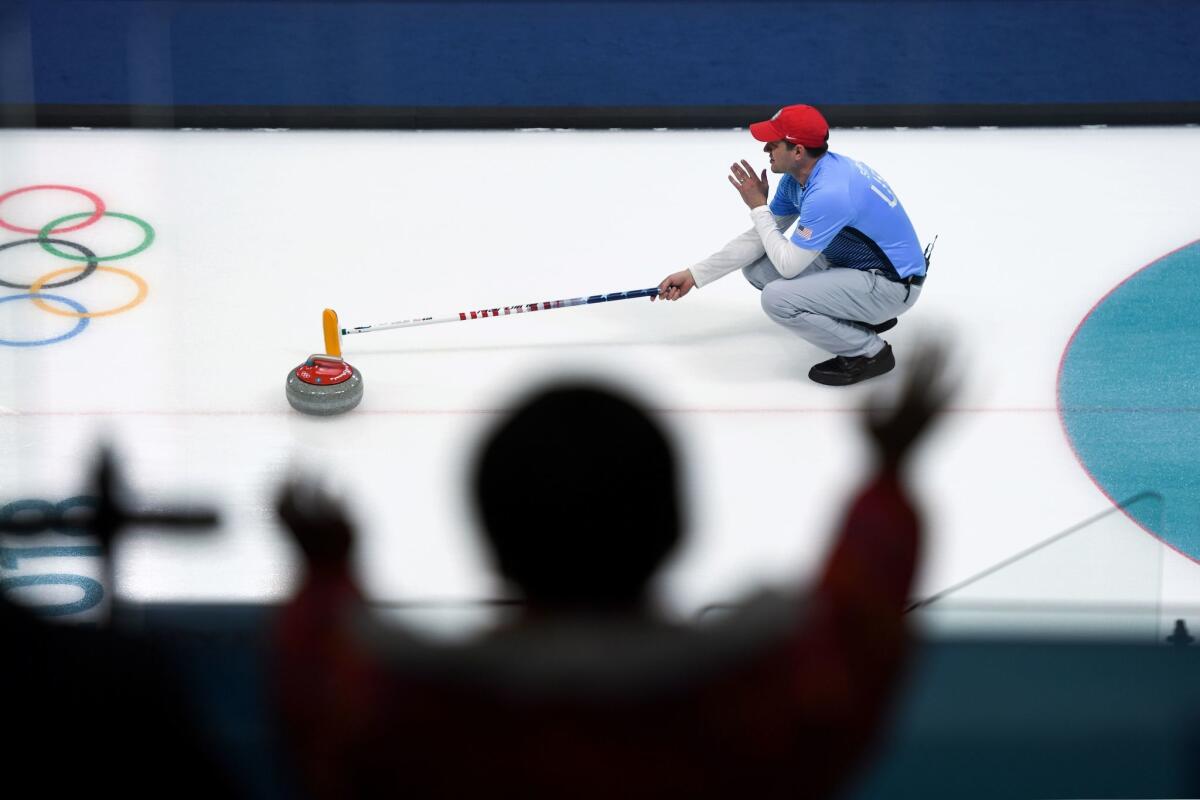
The United States will compete for a gold medal in men’s curling after knocking out their Canadian opponents 5-3 in a tense semifinals showdown at the Pyeongchang Olympics.
The U.S. victory on Thursday is a remarkable turnaround for a team that hasn’t made the Olympic podium since the 2006 Turin Games, when they won a bronze medal.
Just as remarkable was the loss for Canada, which has won the gold medal in men’s curling at the last three Winter Olympics. The Canadian women’s team, meanwhile, didn’t even make the semifinals, despite being the defending world champions.
The U.S. will face off against Sweden for the gold. The Swedish team beat Switzerland 9-3 in another semifinals match on Thursday.
Sweden picked up two points in the first end and then four in the fourth to take a 6-1 lead. Still trailing 9-3 after eight frames, the Swiss conceded defeat.
- Share via
Thursday’s Winter Olympics TV schedule
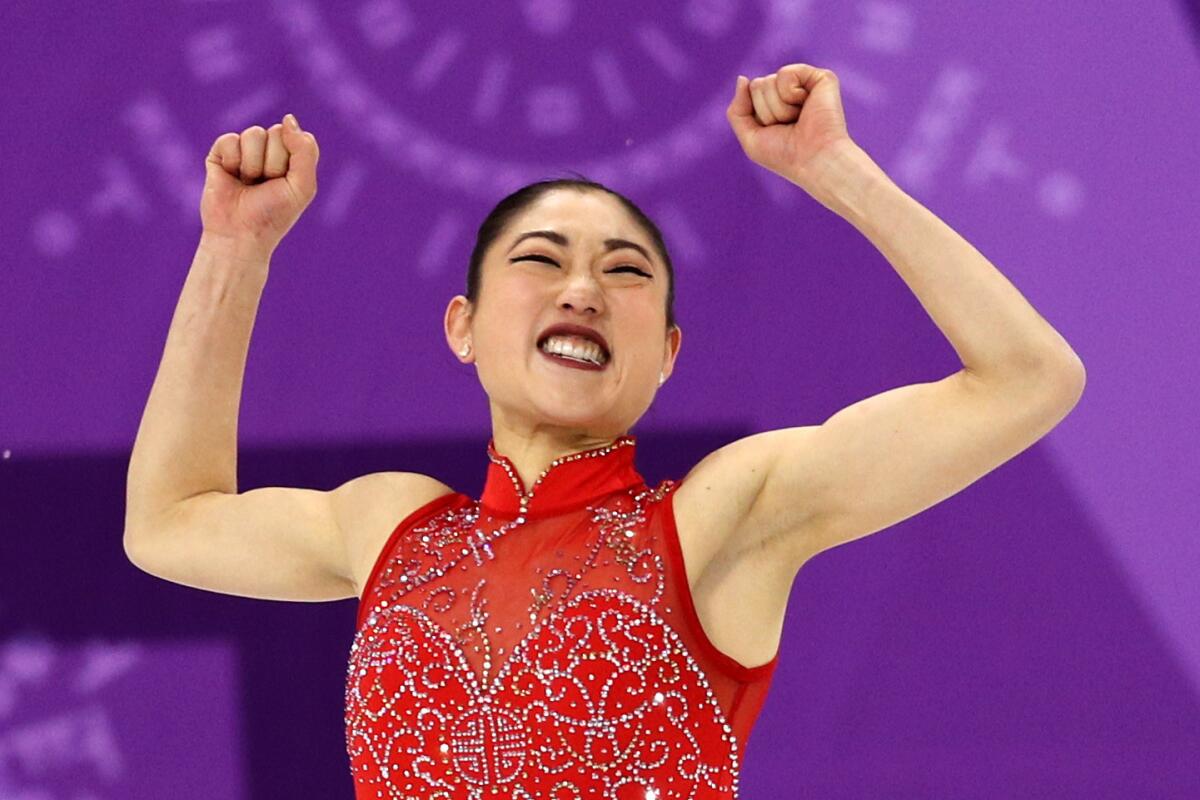
Thursday’s Winter Olympics TV schedule. All times Pacific.
6 a.m.: Short-track speedskating (men’s 500 meters, women’s 1,000 meters, men’s 5,000-meter relay). NBCSN
8:15 a.m.: Biathlon (women’s 24-kilometer relay). NBCSN
10 a.m.: Curling (men’s semifinal, teams TBD). NBCSN
Noon: Nordic combined (men’s team large hill portion), Biathlon (women’s 24-kilometer relay). NBC
1:30 p.m.: Hockey (teams TBD). NBCSN
2 p.m.: Curling (men’s semifinal, teams TBD). CNBC
5 p.m.: Short-track speedskating (men’s 500 meters, women’s 1,000 meters, men’s 5,000-meter relay), Snowboarding (women’s big air), Alpine skiing (women’s super combined, downhill portion), Figure skating (women’s free skate). NBC
5 p.m.: Figure skating (women’s free skate, early groups).
7 p.m.: Biathlon (women’s 24-kilometer relay), Nordic combined (men’s cross-country portion). NBCSN
9:30 p.m.: Short-track speedskating (men’s 500 meters, women’s 1,000 meters, men’s 5,000-meter relay). NBCSN
9:35 p.m.: Alpine skiing (women’s super combined, slalom portion), freestyle skiing (women’s ski cross). NBC
11:15 p.m.: Hockey (men’s semifinal, Czech Republic vs. Olympic Athletes of Russia). NBCSN
11:35 p.m.: Repeat of 5 p.m. broadcast. NBC
2 a.m. (Friday morning): Speedskating (men’s 1,000 meters). NBCSN
3:35 a.m. (Friday morning): Repeat of 5 p.m. broadcast. NBC
3:45 a.m. (Friday morning): Hockey (men’s semifinal, teams TBD). NBCSN.
- Share via
U.S. beats rival Canada and wins Olympic gold in women’s hockey
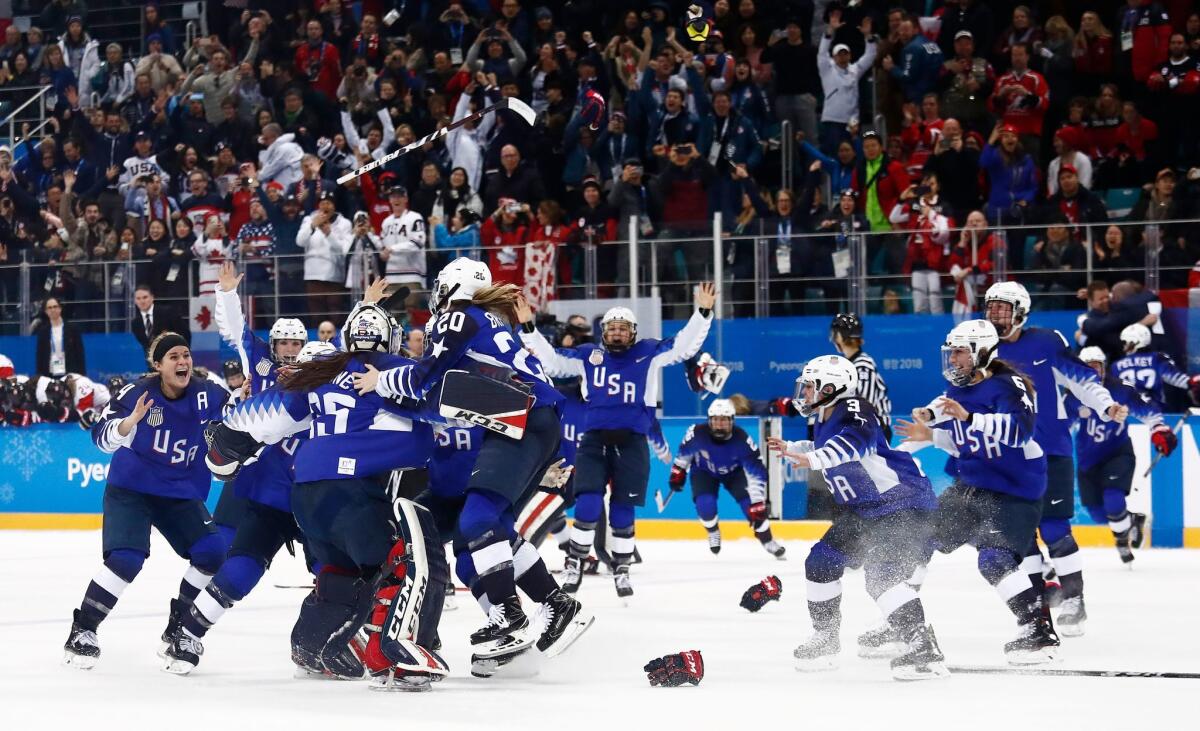
The long wait is over for the U.S. women’s Olympic hockey team.
Jocelyne Lamoureux-Davidson scored in the sixth round of the tie-breaking shootout and goaltender Maddie Rooney stopped Meghan Agosta to give the Americans a 3-2 victory over Canada and the first Olympic gold medal for the women’s team since the inaugural women’s tournament in 1998 at Nagano, Japan.
The American players jumped off the bench, hurling their sticks and gloves in the air as they hugged each other and cried on the ice at the Gangneung Hockey Centre to celebrate a victory that showcased the two best teams in the sport on Thursday before a spirited crowd at Gangneung Hockey Centre.
Canada had won the previous four Olympic tournaments, three of them at the expense of the U.S.
Chants of “USA!” alternated with chants of “Go Canada Go!” as the overtime continued, with fans aware of the gold-medal possibilities on every foray up ice and every shot.
The game was played at a breathtaking pace and with a physical edge that often exceeded the rules but was sometimes ignored by officials whose skills didn’t match those of the players. The U.S. killed a penalty in overtime, but just barely, sending the game to the decisive shootout.
Second-period goals by Canada forwards Haley Irwin and Marie-Philip Poulin — who both played college hockey in the U.S. — had given Canada a 2-1 lead.
But a bad line change by Canada gave the Americans an opening, and they took advantage of it to pull even at 2-2 at 13:39 of the third period. Monique Lamoureux-Morando took a lead pass from linemate Kelly Pannek and got behind Canada’s defense, giving her time to go from her forehand to her backhand and then to the forehand again to lift a shot into the upper-right corner of the net.
The U.S. players and team executives had focused on this game for the past four years, since its defeat at Sochi, creating a residency program in Florida that would allow players to practice and train together for several months and retooling the roster to bring in young, swift skaters with the aim of increasing its speed.
The team was fast and it got strong goaltending from 20-year-old Olympic rookie Maddie Rooney,who stopped 29 shots on Thursday and yielded two goals in the shootout.
Capitalizing on the third of three straight advantages they gained in the first period, the U.S. women scored the game’s first goal.
Defenseman Sidney Morin, who was among the last players added to the U.S. roster in late November, made the goal possible when she controlled the puck in the left circle and launched a low shot on net.
Hilary Knight, playing in her third Olympic hockey tournament, was in position in front of the net to redirect Morin’s shot past goaltender Shannon Szabados at 19:34 of the period.
As the players filed off the ice to their respective locker rooms, Canada coach Laura Schuler — who had been exasperated with the officials’ call of interference against Sarah Nurse on that third penalty — summoned the officials to the bench to chat before they left the ice. The referees were Nicole Hertrich of Germany and Katarina Timglas of Germany, and the linesmen were Lisa Linnek of Germany and Johanna Tauriainen of Finland.
Canada pulled even early in the second period. Blayre Turnbull deked past U.S. defenseman Lee Stecklein and sent a centering pass to Haley Irwin, who batted the puck out of midair and past Maddie Rooney at the two-minute mark. Irwin played college hockey at the University of Minnesota-Duluth.
Canada pulled ahead soon after, when Meghan Agosta took control of the puck in the neutral zone and slid a pass to an onrushing Marie-Philip Poulin, who went to one knee for a shot from the inside edge of the right circle that found room inside the left post at 6:55. Poulin, who played her college hockey at Boston University, has been a nemesis for the U.S.: She scored the tying and winning goals for Canada in the gold medal game four years ago at Sochi.
The Americans couldn’t take advantage of a power play they gained late in the second period, continuing their scoring woes against the better teams in this tournament. They probably should have gotten a power play early in the third period, when Poulin elbowed Brianna Decker in the face in front of Canada’s net, but no penalty was called.
A bad line change by Canada was a key factor in Monique Lamoureux-Morando bringing the U.S. even at 2-2 at 13:39 of the third period. She took a lead pass from linemate Kelly Pannek and got behind Canada’s defense, giving her time to go from her forehand to her backhand and then to the forehand again to lift a shot into the upper-right corner of the net.
- Share via
Mikaela Shiffrin gets silver in Alpine combined; Vonn skis out
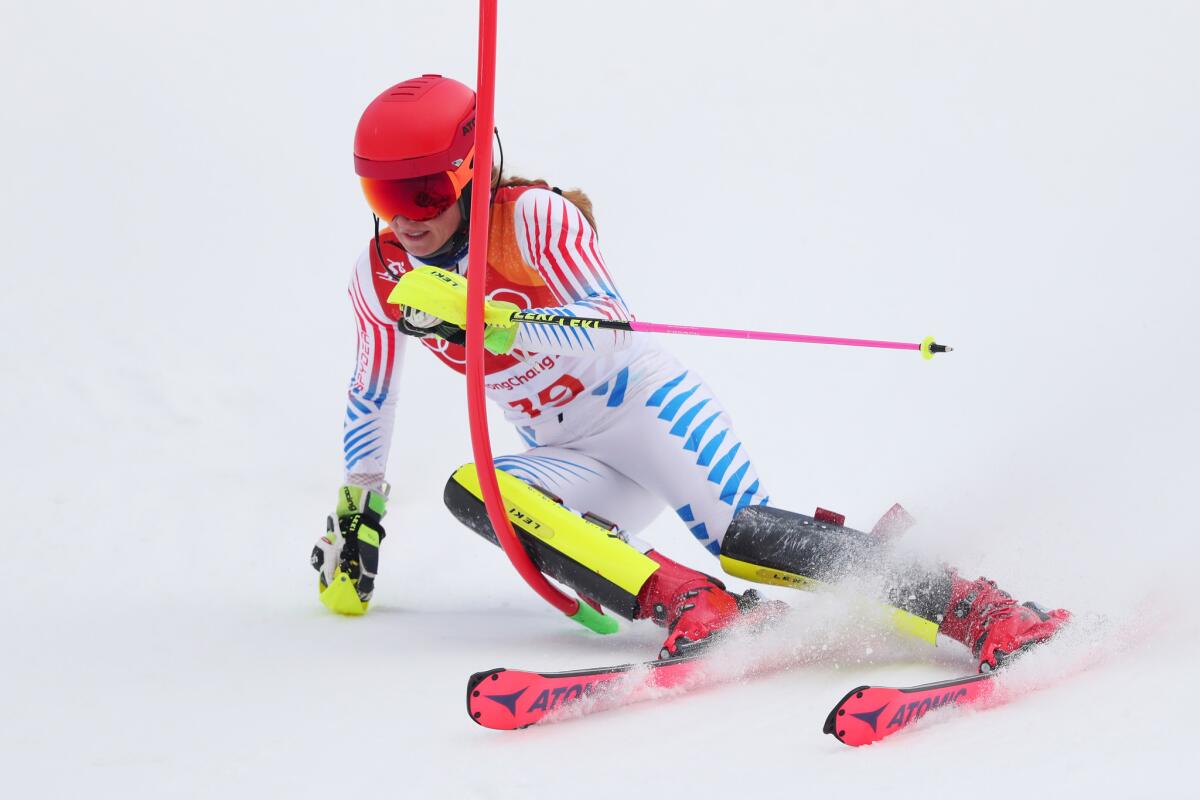
Michelle Gisin of Switzerland has won the women’s Alpine combined with an aggressive slalom run to edge American Mikaela Shiffrin at the Pyeongchang Olympics.
Lindsey Vonn, the leader after the downhill portion, made a mistake early in the slalom Thursday and didn’t finish in what’s likely her final Winter Games.
Gisin was nearly flawless in finishing in a combined time of 2 minutes, 20.90 seconds to hold off silver medalist Shiffrin by 0.97 seconds. Wendy Holdener of Switzerland earned the bronze.
Shiffrin adds the silver medal to the gold she won earlier in the games in the giant slalom.
It was very likely the first and only Olympic race between U.S. teammates Vonn and Shiffrin.
- Share via
Kikkan Randall to serve as athlete representative on the IOC
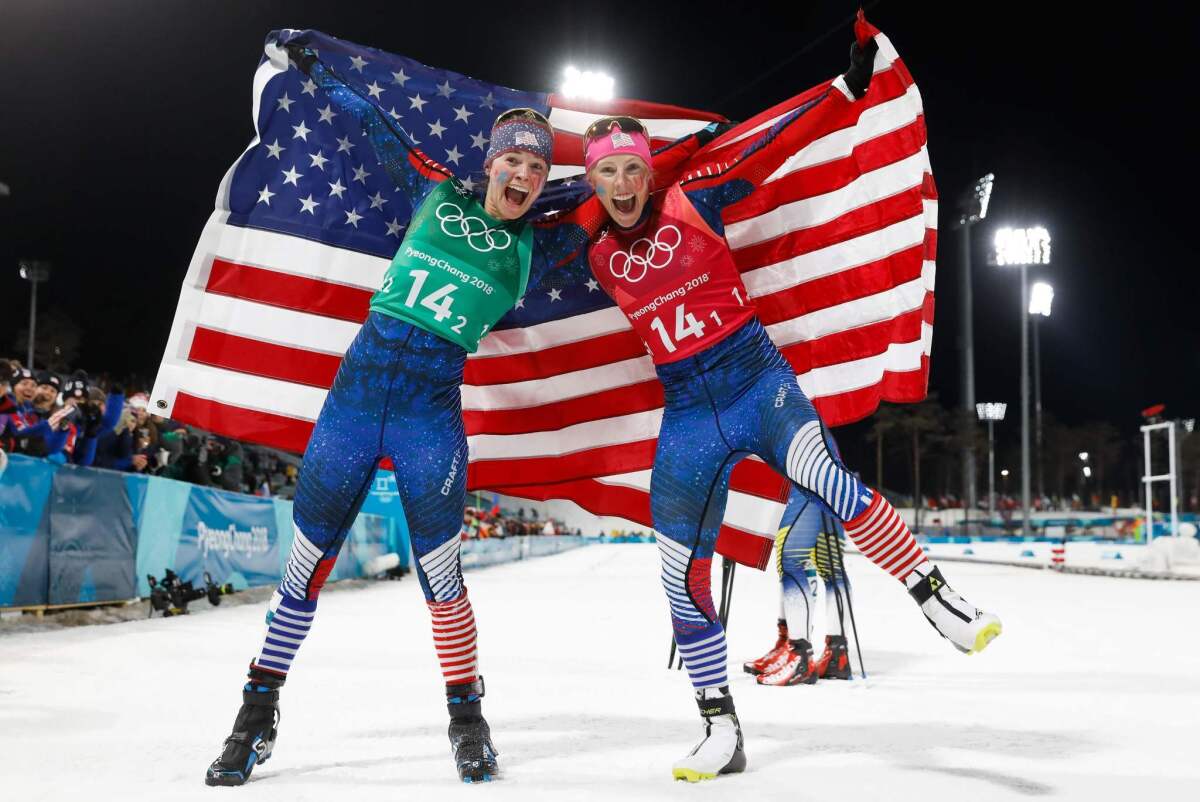
A day after helping the U.S. women win their first-ever gold medal in cross-country skiing, Kikkan Randall was elected to serve as an athlete representative on the International Olympic Committee.
Randall and Finnish hockey player Emma Terho will fill two spots that became open this week when previous members of the athletic commission – including former U.S. hockey player Angela Ruggiero – finished their eight-year terms.
“Wow, what amazing news to get today,” Randall said on Thursday, adding: “This is going to be a really fun ride.”
On Wednesday night, Randall and teammate Jessie Diggins made U.S. history by winning the team sprint free relay at the Alpensia Cross-Country Skiing Centre.
A five-time Olympian, Randall was elected to the 20-member IOC commission by her fellow athletes in Pyeongchang. The group aims to give athletes a voice in the Olympic movement.
“Kikkan has always represented Team USA to the highest levels,” said Scott Blackmun, chief executive of the U.S. Olympic Committee. “She’s a selfless and consummate athlete, professional, wife, mother, and advocate, and will no doubt have an extremely positive impact on the IOC Athletes’ Commission.”
- Share via
David Wise takes gold, Adam Ferreira finishes second in men’s freestyle skiing halfpipe
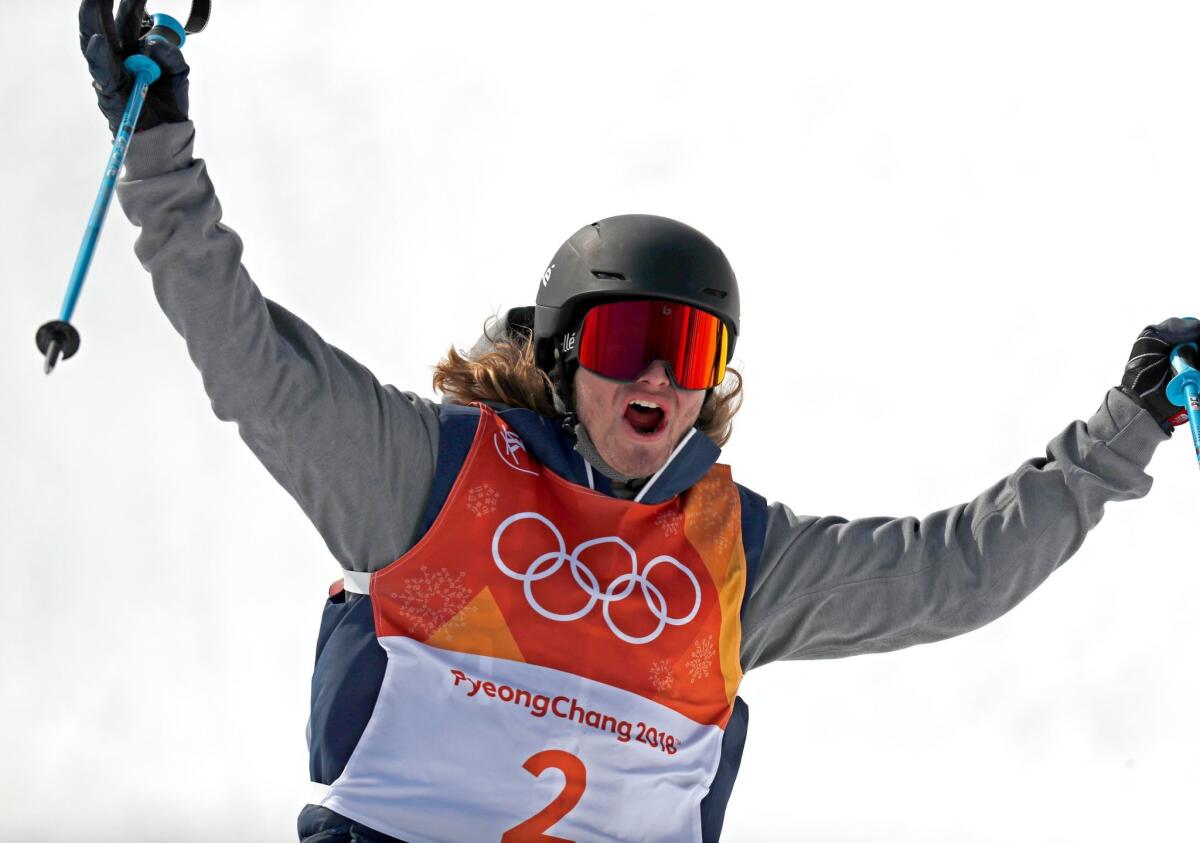
At least the Americans have the Phoenix Snow Park halfpipe.
Freestyle skier David Wise successfully defended his gold medal Thursday, breaking through on his final run to give the U.S. its third gold medal in the halfpipe at the Pyeongchang Olympics.
Wise wiped out on his first two runs before sneaking past countryman Alex Ferreira on his third with a score of 97.20. Wise landed double corks in all four directions — front left, front right, switch (backward) left and switch right — a goal he set for himself entering these games.
It’s the seventh gold medal for the U.S. in Pyeongchang, five of which have come at Phoenix Snow Park. Chloe Kim and Shaun White won snowboard halfpipe gold last week, and Red Gerard and Jamie Anderson won at snowboard slopestyle.
The snowboard and freestyle skiing crews have picked up the slack for the U.S. team in these Olympics. Those competitors have accounted for 10 of the country’s 19 medals, many of them at the snow park located an hour away from the Gangneung Olympic Plaza.
Ferreira took silver, and 16-year-old Nico Porteous from New Zealand got bronze. It was the second medal of the day for the Kiwis after snowboarder Zoi Sadowski Synnott won bronze in big air to end New Zealand’s 26-year Winter Games drought.
Porteous momentarily pushed past Ferreira for the top spot with his second run, shocking even himself with a score of 94.80. His jaw dropped and he pumped his arms when it was announced.
Porteous finished 12th at least year’s world championships and ranked 11th in qualification. His brother, Miguel, won silver in the halfpipe at the 2017 X Games.
Porteous didn’t even bother trying on Run 3, cruising through the halfpipe without a trick and waiting at the bottom for the other competitors.
Ferreira stormed past Porteous on his second run. The 23-year-old American spun his right ski pole over his head at the bottom of the halfpipe, then threw up his hands when the judges gave him a 96.00.
Wise put down his double-cork dream run a few minutes later, and Ferreira could only counter with a 96.40.
Wise had a big cheering section of family and friends at the bottom of the halfpipe, and most of them had “David Wise” drawn on their faces. Wise’s sister, Christy, is an Air Force rescue pilot who lost a leg in a paddleboarding accident in 2015, and Wise is giving 10 percent of all his earnings this season to a foundation he and his sisters created: One Leg Up On Life.
The Americans had eyed a podium sweep in the halfpipe, with Torin Yater-Wallace and Aaron Blunck also among the favorites. Yater-Wallace failed to complete a clean run, including a gnarly crash midway through his third try, and finished ninth. Blunck’s best effort was an 84.80 on his final run, good for seventh.
The U.S. last swept a podium in Sochi, when Joss Christensen, Gus Kenworthy and Nick Goeppel won the men’s skiing slopestyle. The U.S. also swept the 2002 men’s snowboard halfpipe and the 1956 men’s figure skating.
- Share via
Lindsey Vonn in lead after downhill leg of Alpine combined
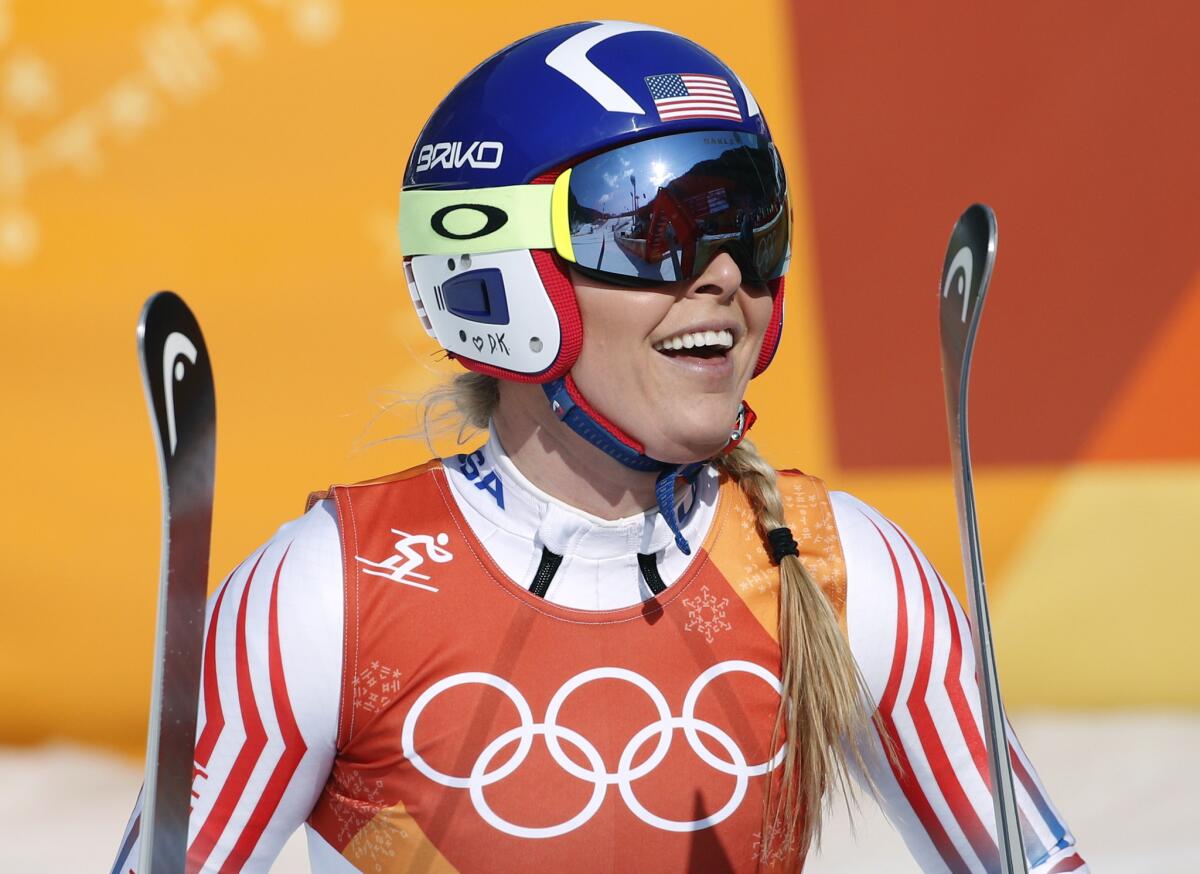
Lindsey Vonn has the lead after the downhill leg of the Olympic Alpine combined, with American teammate Mikaela Shiffrin right in the thick of things.
Vonn finished in a time of 1 minute, 39.37 seconds. Shiffrin is 1.98 seconds behind.
The race switches Thursday afternoon local time to Shiffrin’s specialty — the slalom. Both times are combined to determine the winner.
Vonn had the lead after the downhill leg at the 2010 Vancouver Games but didn’t finish the slalom.
Ragnhild Mowinckel of Norway had the second-fastest time in the downhill and is 0.74 seconds behind Vonn.
- Share via
USA’s Jamie Anderson wins silver in women’s big air snowboarding
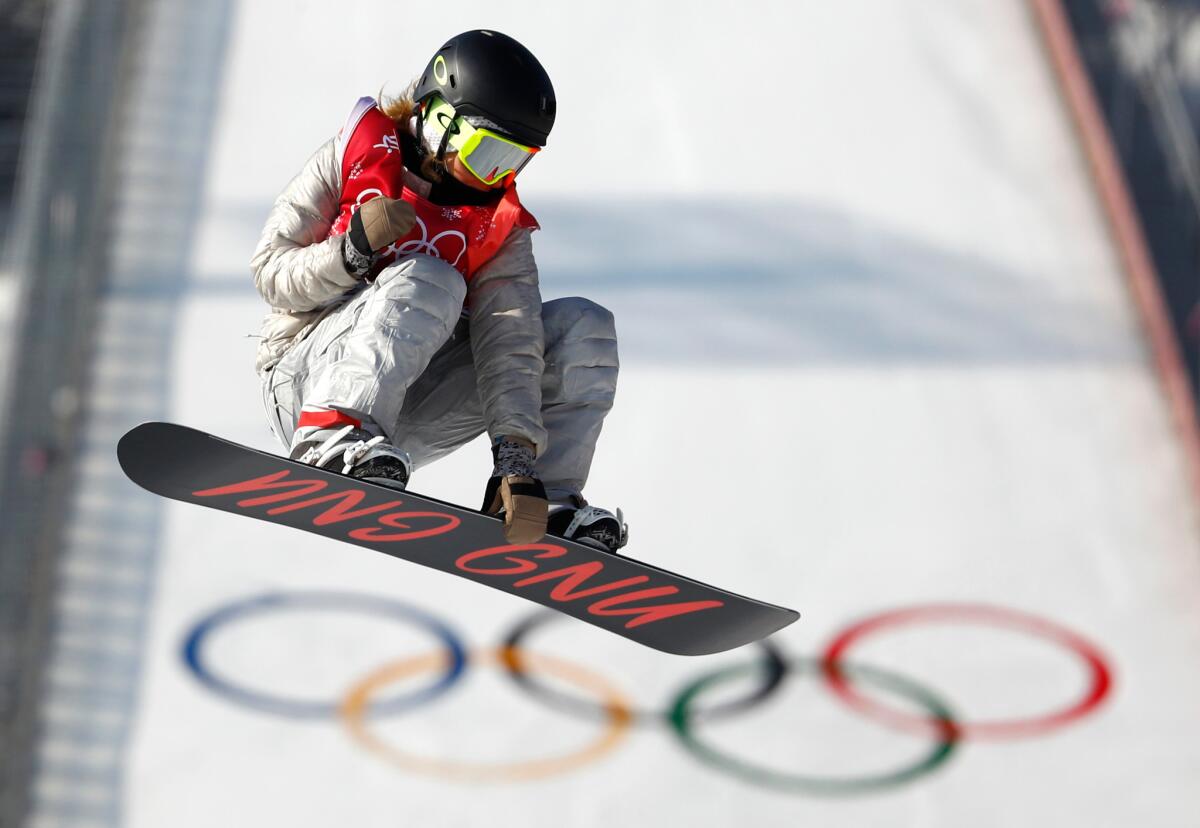
Anna Gasser edged two-time gold medalist Jamie Anderson to win gold in the Olympic debut of women’s big air snowboarding.
Gasser, the reigning world champion, stomped the last of her three jumps, a double cork 1080 that saw the Austrian flip twice while spinning three times. Her score of 96 was the highest of the day and gave her a total of 185.00.
Anderson, who last week captured her second Olympic gold in women’s slopestyle, led going into the final round but sat down while trying to land her last jump. Gasser took full advantage. The 26-year-old raised her arms in triumph and embraced Anderson after the score flashed.
Zoi Sadowski Synnott earned bronze to give New Zealand its first Winter Olympics medal in 26 years.
- Share via
Canada edges Finland 1-0 to reach men’s hockey semifinals and will meet surprise semifinalist Germany
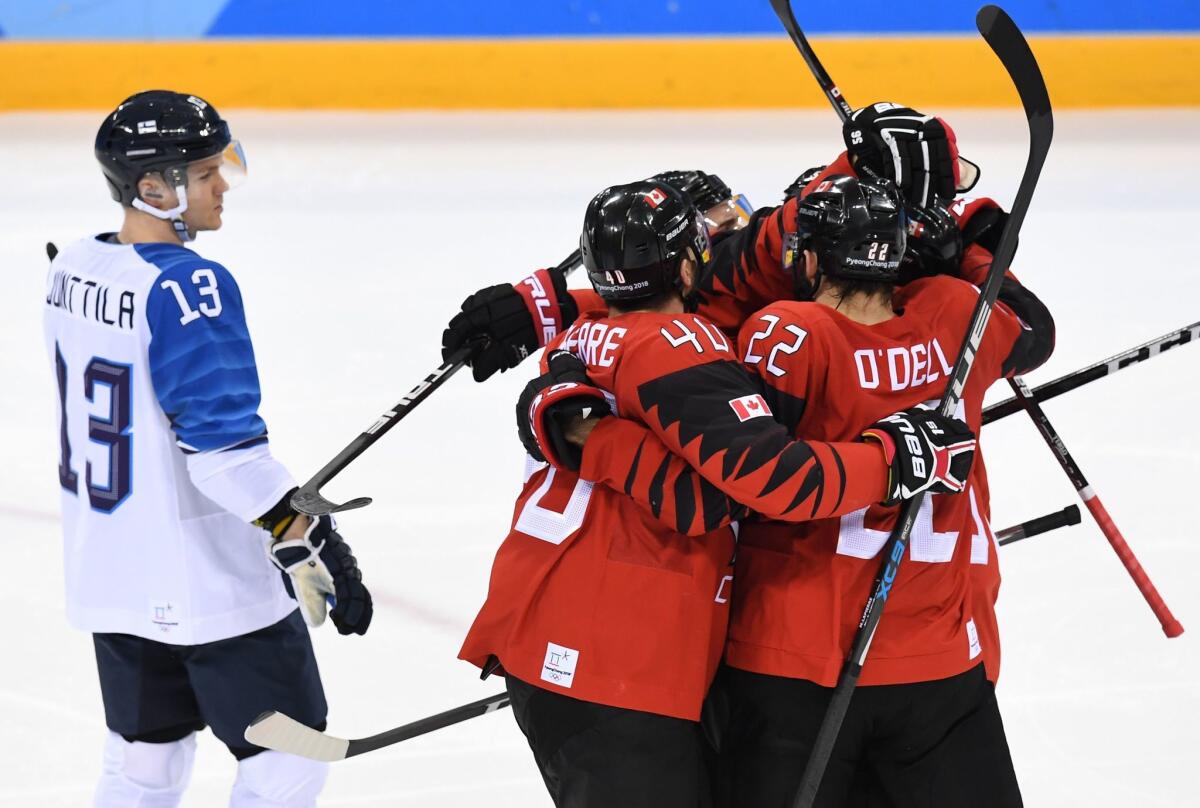
Backup goaltender Kevin Poulin made 15 saves in relief of injured starter Ben Scrivens on Wednesday night as Canada held on for a 1-0 quarterfinal victory over Finland at Gangneung Hockey Centre.
Canada, which relied on its wealth of NHL stars to win the last two men’s Olympic hockey tournaments, will face Germany in the semifinals on Friday. Germany was a surprise winner over Sweden, advancing on a goal by Patrick Reimer one minute and 30 seconds into overtime. Germany is coached by Marco Sturm, whose NHL stops included a stint with the Kings.
Defenseman Maxim Noreau, who played six NHL games with the Minnesota Wild and has spent the last two seasons in the Swiss League, scored Canada’s goal on Wednesday. Eric O’Dell, who was drafted by the Ducks in 2008 but never played for them, won a faceoff in Finland’s zone and slid the puck back to Noreau, whose slap shot beat Finland goalie Mikko Koskinen 55 seconds into the third period.
Poulin had replaced Scrivens early in the second period after Scrivens was involved in a goalmouth collision with Finland forward Veli-Matti Savinainen. Scrivens — a former Kings goaltender — played for a few seconds after the contact but left the game at 4:17 of the middle period after having stopped six shots. Canada coach Willie Desjardins said more would be known about Scrivens’ status Thursday morning.
“It was a great job tonight from Kevin, coming in like that and making some big saves,” forward Maxim Lapierre said.
Poulin’s teammates protected him well. “They had some chances, but we wanted to minimize the second chances,” forward Derek Roy said. “We know if we give [Poulin] a good look at the shot, he can make the save, and guys were literally jumping in front of pucks. We were diving everywhere. They would have taken one in the teeth for sure.”
Desjardins said he was surprised that Sweden had lost to Germany. “Sweden is a good team. Germany must be playing well,” said Desjardins, who coached the Vancouver Canucks for three seasons before being fired in April 2017. “You don’t get lucky in this tournament. You’ve got to play well. And Germany’s got some confidence and they’re going to be a tough team to play. … They play the world championships with that group, so they have some experience against high-end competition.”
- Share via
Germany wins gold, U.S. silver in women’s bobsled
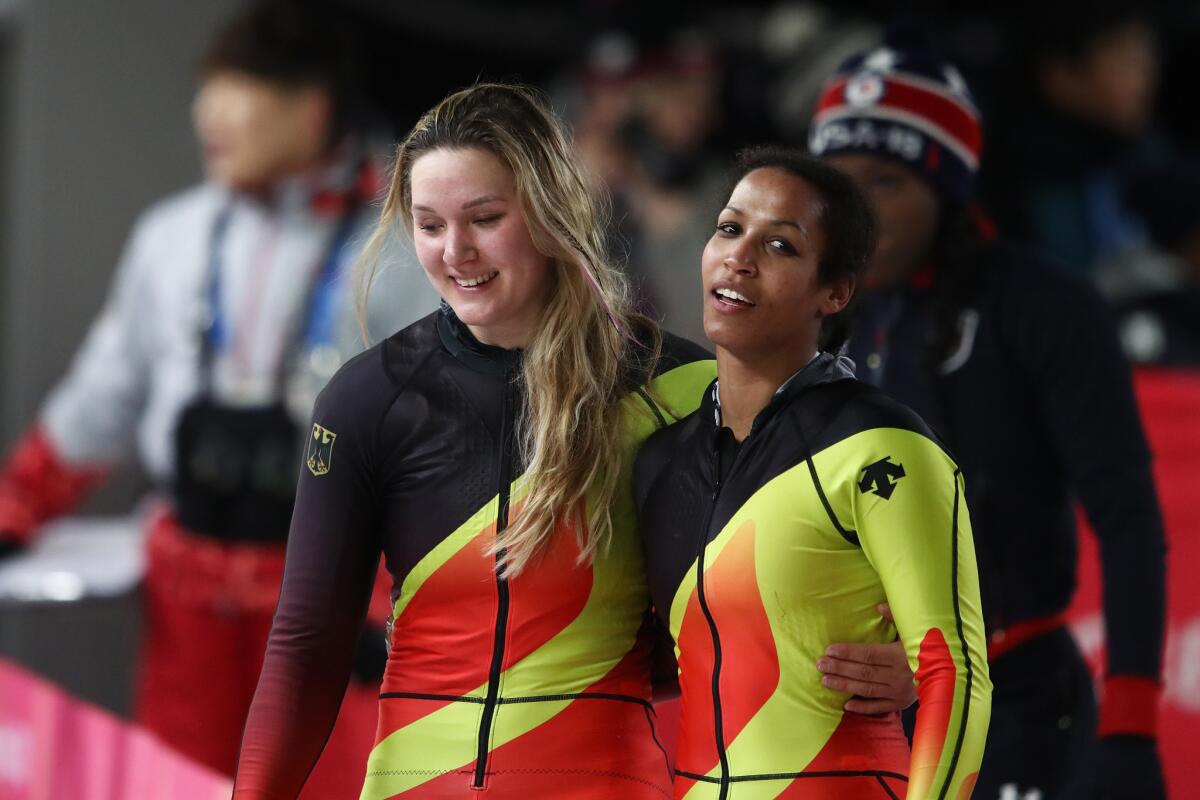
Women’s bobsledding has a new star, and a surprise Olympic champion.
Germany’s Mariama Jamanka -- a winner of exactly zero major international races in her life until now -- drove to gold in the women’s bobsled event at the Pyeongchang Games on Wednesday night, adding to her country’s dominant showing at the sliding track in these Olympics.
Jamanka and brakeman Lisa Buckwitz finished their four runs in 3 minutes, 22.45 seconds. Elana Meyers Taylor and Lauren Gibbs of the U.S. were second in 3:22.52, the 0.07-second margin being the closest between first and second in any Olympic women’s bobsled race.
Canada’s Kaillie Humphries teamed with Phylicia George to get third in 3:22.89.
It was the third consecutive medal for both Meyers Taylor and Humphries. Meyers Taylor won bronze as a push athlete in 2010 and silver as a driver in 2014; Humphries won gold in each of those Olympic races.
Both arrived in South Korea fully expecting gold. Jamanka had other ideas.
She showed absolute nerves of steel in the ultimate moment to win the 18th Olympic gold medal in German bobsled history, the second by a woman.
And there’s no question who the best team at the sliding track has been in these Pyeongchang Games. With eight of the nine events now complete in bobsled, skeleton and luge, Germany has won five golds and will be a favorite to grab yet another in the four-man event that ends on the final day of these Games on Sunday.
Stephanie Schneider of Germany was fourth, and Jamie Greubel Poser of the U.S. took fifth.
Nigeria, with pilot Seun Adigun and brakewomen Akuoma Omeoga and Ngozi Onwumere -- Omeoga was ill and couldn’t race Wednesday, so she was subbed out -- finished last in the 20-sled field, nearly four seconds behind 19th-place Jamaica.
The Nigerians were the first sled from an African nation to compete in women’s bobsled at the Olympics.
“All we have to give is everything we’ve got,” Adigun said.
Meyers Taylor and Jamanka were the last two sleds down the track, and the only two real remaining contenders for gold by that point in the race.
Meyers Taylor finished in 50.73 seconds, jumped out of her sled, threw her arms in the air and celebrated with Gibbs. And then everyone turned their attention to the top of the track, to see if Jamanka could pull off the win.
It wasn’t the greatest start for the Germans, and they trailed Meyers Taylor by 0.13 seconds in one of the early splits. But Jamanka picked the perfect line and kept picking up speed, overtaking Meyers Taylor’s time in one of the final turns.
Jamanka held a lead of 0.07 seconds after Tuesday’s first two runs, and she opened the third heat by breaking Meyers Taylor’s track record -- setting the tone for the night with a time of 50.49 seconds.
Undeterred, Meyers Taylor took the record right back.
She was next down the track, crossing the line in 50.46 seconds and cutting the deficit to 0.04 seconds going into the final run. With that, the stage to a gold medal was set for either the upstart German or the American veteran -- the one who carried the lead into the fourth heat of the Olympics four years ago and saw it slip away in one steering mistake.
There was no big mistake this time. Meyers Taylor was almost flawless. Jamanka was just a tiny bit better.
- Share via
Wednesday’s Winter Olympics TV schedule
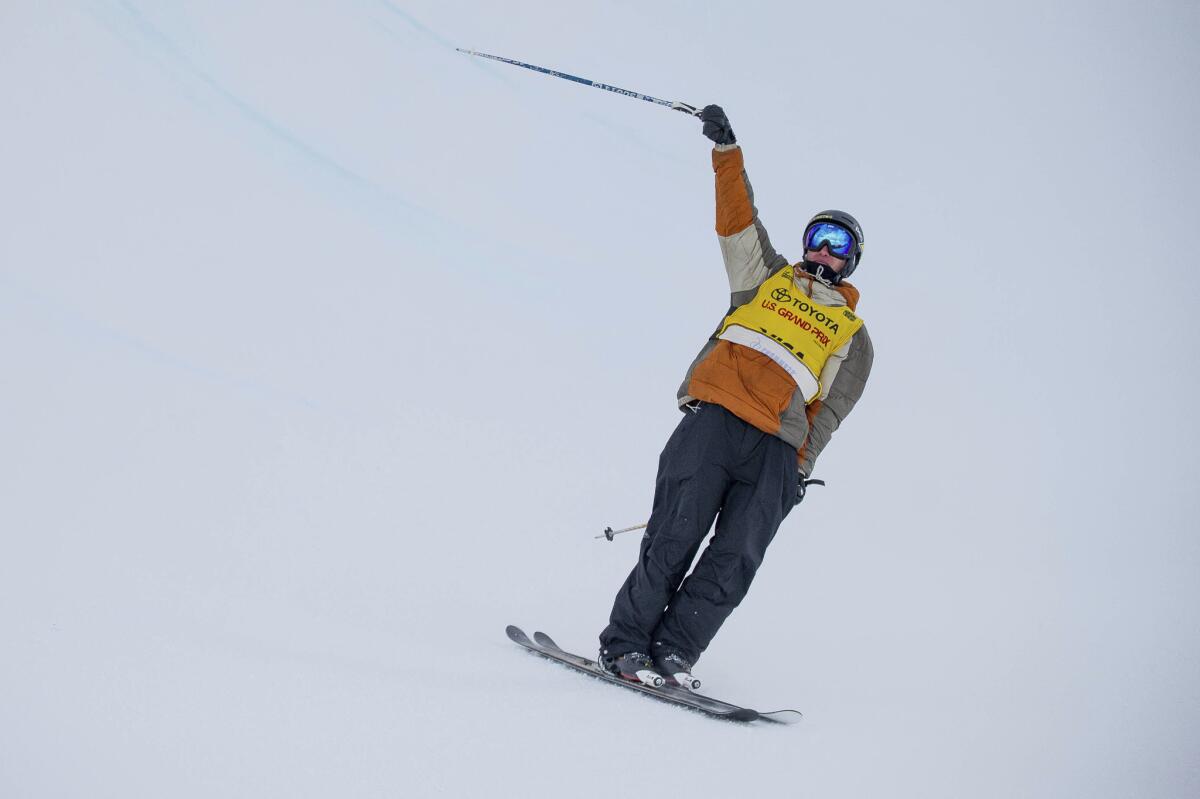
Wednesday’s Winter Olympics TV schedule. All times Pacific
6:30 a.m.: Bobsled (women, final runs). NBCSN
7:45 a.m.: Cross-country skiing (team sprint), speedskating (men’s and women’s team pursuit). NBCSN
10:30 a.m.: Medal ceremonies from various events. NBCSN
11 a.m.: Curling (men, U.S. vs. Britain). NBCSN
Noon: Cross-country skiing (team sprint), speedskating (men’s and women’s team pursuit). NBC
2 p.m.: Hockey, teams TBD. NBCSN
2 p.m.: Curling (women, U.S. vs. Sweden). CNBC
5 p.m.: Freestyle skiing (men’s halfpipe final), bobsled (women, final runs), Alpine skiing (women’s combined, downhill portion), Cross-county skiing (women’s team sprint). NBC
5 p.m.: Curling (women, Canada vs. Olympic Athletes from Russia). NBCSN
7:45 p.m.: Women’s hockey (gold-medal game, U.S. vs. Canada). NBCSN
8:35 p.m.: Alpine skiing (women’s combined, slalom portion; men’s slalom), Snowboarding (men’s and women’s parallel giant slalom qualifying). NBC
11 p.m.: Repeat of 5 p.m. broadcast. NBC
11 p.m.: Snowboarding (men’s and women’s parallel giant slalom qualifying), Nordic combined (team large hill event). NBCSN
12:15 a.m. (Thursday morning): Curling (men’s and women’s tiebreaker to determine semifinalists, if necessary. Teams TBD). NBCSN
1:05 a.m. (Thursday morning): Repeat of 5 p.m. broadcast. NBC
2:20 a.m. (Thursday morning): Nordic combined (20-meter cross-country relay), biathlon (women’s 24-meter relay). NBCSN
4:45 a.m. (Thursday morning): Short-track speedskating (men’s 500 meters, women’s 1,000 meters, men’s 5,000-meter relay.
- Share via
Olympic Athletes of Russia reach men’s hockey semifinals after rout of Norway
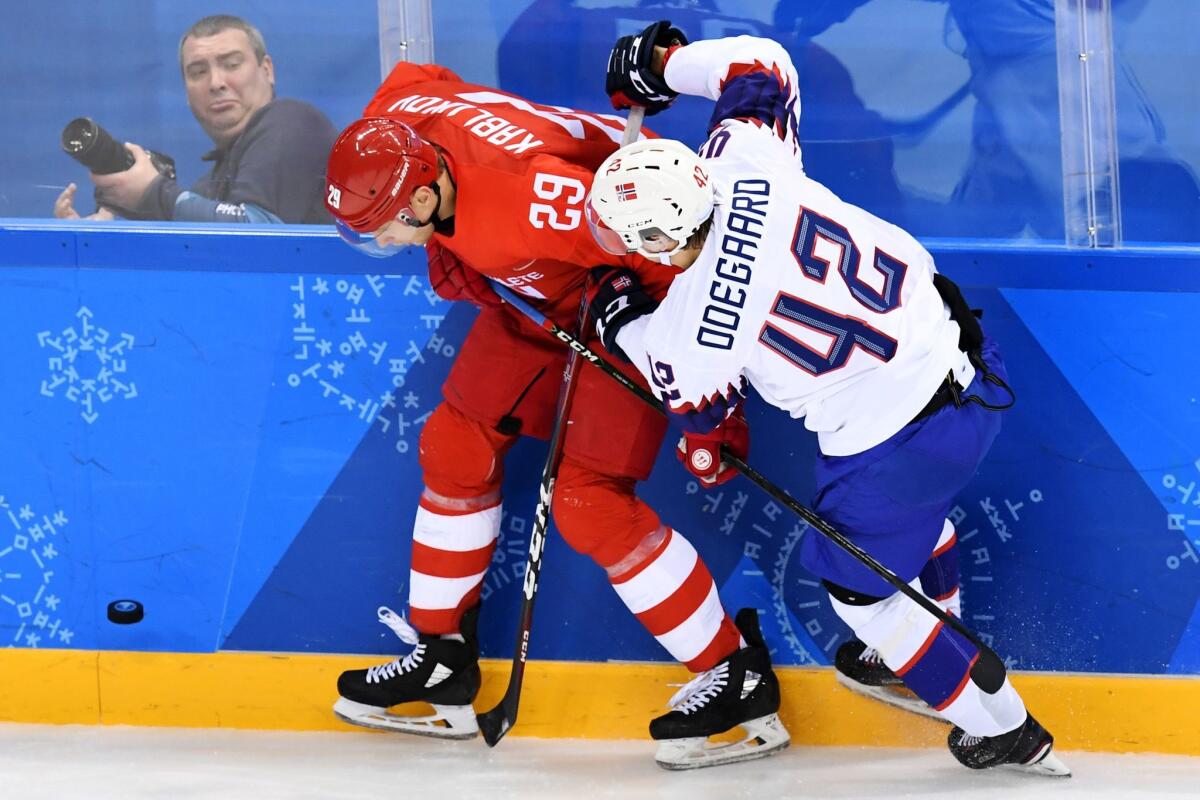
The Olympic Athletes of Russia, considered the favorite to win gold before the men’s Olympic hockey tournament began, advanced to the semifinals with a 6-1 rout of Norway on Wednesday at Gangneung Hockey Centre. Eleven players had at least one point, including many whose names are familiar to fans of NHL teams.
Former Kings defenseman Slava Voynov, who was permitted to play here despite serving nearly two months in jail following his no-contest plea to a charge of corporal abuse of a spouse, had a goal and an assist. He declined to talk after the game other than to say hello, and that he feels good. Former Detroit Red Wings standout Pavel Datsyuk had two assists, former Tampa Bay draft pick Nikita Gusev had a goal and two assists, and Mikhail Grigorenko, who played junior hockey in Quebec and later played for the Buffalo Sabres and Colorado Avalanche, contributed a goal and an assist.
The Olympic Athletes of Russia will face the Czech Republic in the semifinals on Friday. The Czechs moved with a quarterfinal shootout victory over the U.S. on Wednesday.
“They’re a really good team, good defensively and they have a good goalie,” Grigorenko said of Czech goalie Pavel Francouz. “A lot of their players play in the KHL so we know them.”
Datsyuk said the Russian team “can play better,” and will have to do so against the Czechs, who are unbeaten in four games. “They have a good team. They prove that already,” he said. “Will be a good game.”
- Share via
U.S. wins first-ever gold medal in women’s cross-country skiing
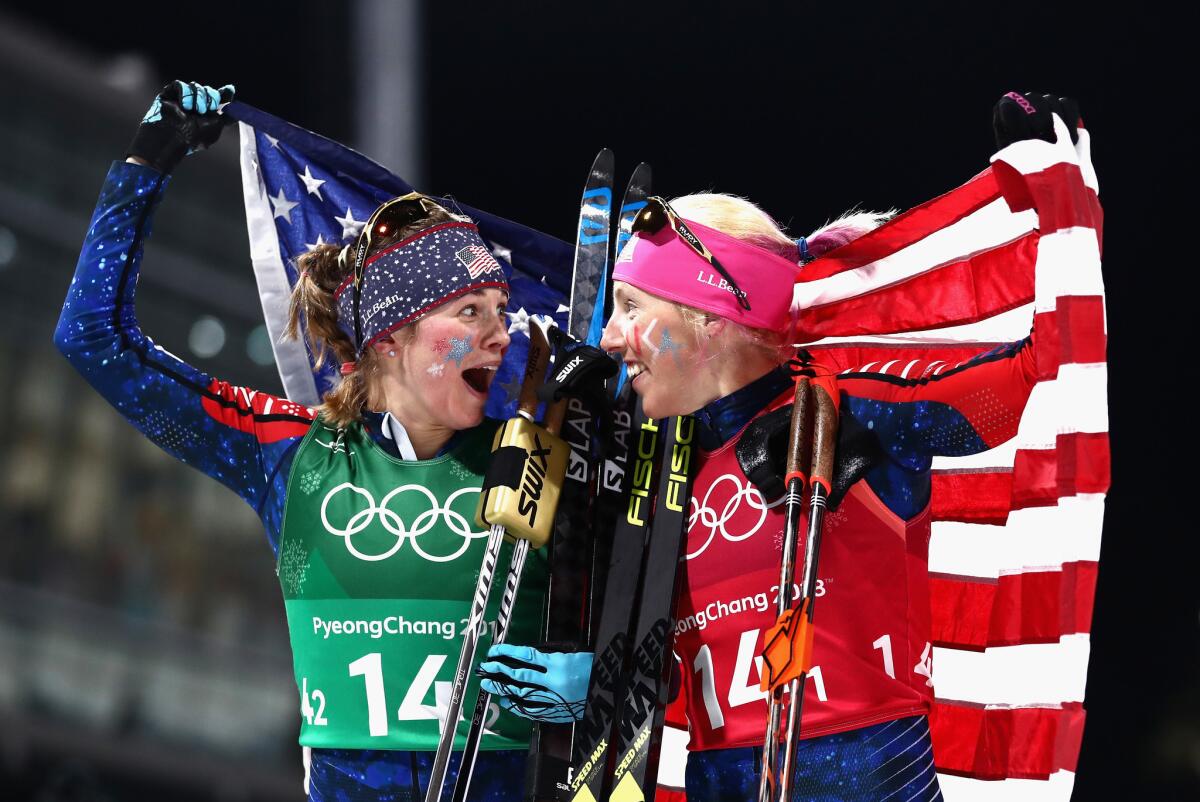
Marit Bjoergen made Olympic history and the United States women’s cross-country skiing team won its first medal ever — and it was gold.
Bjoergen won her 14th medal at the Winter Games by taking bronze with her Norwegian teammates on Wednesday in the team sprint. That made her the most decorated Winter Olympian of all time, breaking the tie she held with Norwegian biathlete Ole Einar Bjoerndalen.
Jessica Diggins and Kikkan Randall led the way as the American women pulled off a huge upset in the same race. The only other American to win a medal in cross-country skiing was Bill Koch, who took silver in the 30-kilometer race at the 1976 Innsbruck Games.
The Americans posted the fastest time in the semifinals and started on the front row in the final. Diggins passed the Swedes and the Norwegians on the final lap to win the first Olympic gold medal for the United States in the sport. Sweden took silver.
The 37-year-old Bjoergen has won four medals at the Pyeongchang Games. She took gold in the women’s 4x5-kilometer relay, silver in the 15-kilometer skiathlon and bronze in the 10-kilometer freestyle. She still has one event remaining — the 30-kilometer mass start on Sunday — if she chooses to participate.
- Share via
Czech Republic eliminates U.S. in men’s hockey
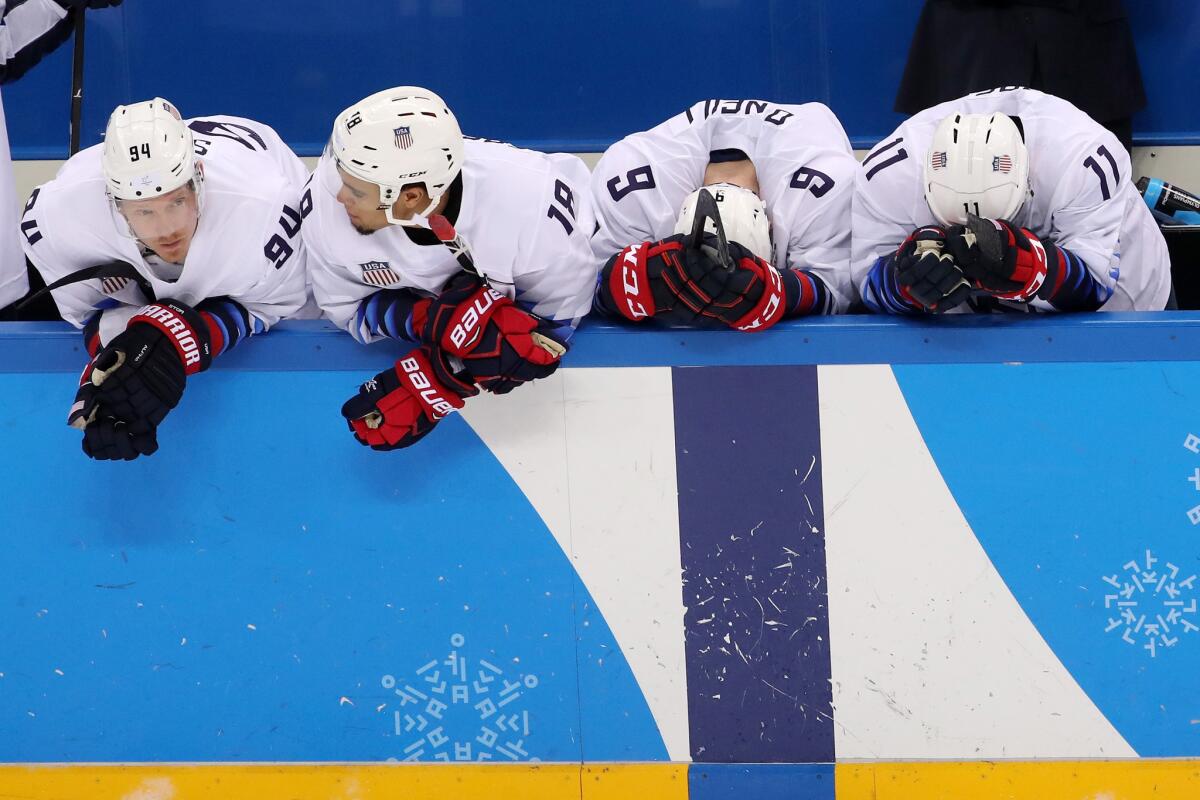
When the U.S. men’s hockey team looks back on the 2018 Winter Olympics, the key phrase might be “missed opportunities.”
The Americans came up short again on Wednesday, seeing their improbable medal run come to an end with a 3-2 overtime loss to the Czech Republic in the quarterfinals at Gangneung Hockey Centre in Pyeonechang, South Korea.
The U.S. failed to convert on several chances in extra time and came up empty in a taut shootout that decided the game.
It was a familiar story for a team that, during pool play, had let its opener against Slovenia slip away and had been shut out by Olympic Athletes From Russia.
On Wednesday, the Americans started quickly as Ryan Donato, their biggest offensive threat in Pyeongchang, scored his fifth goal of the tournament. But they could not hold the lead for long as Czech defenseman Jan Kolar tied things up late in the first period.
The teams continued going back and forth in the second, with Jim Slater scoring for the U.S. and Tomas Kundratek answering for the Czechs.
Twice the Americans failed to take advantage of power plays in a scoreless third period.
“We were really good on penalty killing and everybody worked and battled,” Kundratek said.
Once overtime began, the Americans applied pressure but ultimately had no answer for Czech goalie Pavel Francouz. After that, each team had five chances in the shootout.
Petr Koukal beat U.S. goalie Ryan Zapolski on the Czechs’ second attempt. It was the only goal that Zapolski would surrender.
But with Donato, Troy Terry and the other American players struggling to finish, it was all the Czechs needed.
“It is such a great feeling,” Kundratek said. “Our goalie was unbelievable.”
- Share via
Lindsey Vonn wins bronze medal in women’s downhill; Italy’s Goggia wins gold
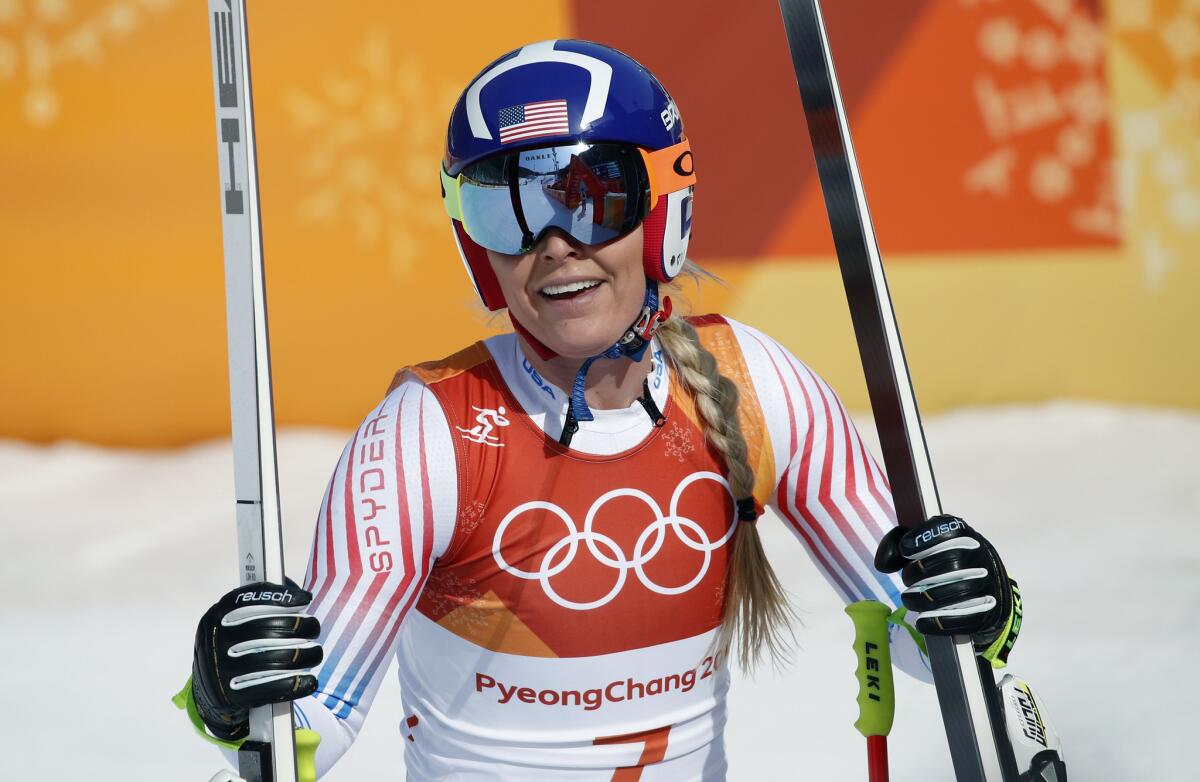
Lindsey Vonn cast a quick glance toward the sky after finishing what was likely her final Olympic downhill run, shrugged her shoulders at seeing her time and shook a friendly index finger at her good friend.
No one could catch Sofia Goggia of Italy.
Goggia won the women’s downhill Wednesday at Jeongseon Alpine Center as Vonn earned bronze. The American was looking at a higher finish, before Ragnhild Mowinckel of Norway turned in a surprise silver-medal performance as the 19th racer on the course.
Then again, shocking finishes seem to be the norm on this hill. Ester Ledecka of Czech Republic made a late charge last week from back in the pack to take the super-G title. She skipped the downhill to step back into the snowboarding realm and will go through qualifying Thursday in the parallel giant slalom.
Goggia finished in a time of 1 minute, 39.22 seconds to hold off Mowinckel by 0.09 seconds. Vonn was 0.47 seconds behind Goggia.
At 33, Vonn becomes the oldest female medalist in Alpine skiing at the Winter Games. The record was held by Austria’s Michaela Dorfmeister, who was just shy of her 33rd birthday when she won the downhill and the super-G at the 2006 Turin Olympics.
This particular track just seems to suit Goggia’s aggressive skiing. She also edged Vonn in March to win the only World Cup downhill contested on the hill.
Maybe mind games. Maybe a ploy. But each pointed to the other as the one to watch in the days leading up to the race. Goggia referred to Vonn as “definitely the favorite.”
Goggia was behind at the top, but found another speed near the bottom. Vonn couldn’t match it when she skied off two spots later.
This was Goggia’s first gold at an Olympics or a world championships. She has four World Cup wins.
Vonn has dedicated these Olympics to her grandfather, Don Kildow, who died in November. She wears his initials “DK” on the side of her helmet as a tribute.
The night before the race, she said on her Twitter account: “Tomorrow I will push out of the starting gate in what will most likely be my last Olympic Downhill race. I’m trying to enjoy the moment as much as I can and I am thankful to share this race with such amazing teammates. I know everyone expects a lot from me, and I expect even more of myself however there’s only one thing I can guarantee; I will give everything I have tomorrow. Count on it.”
Mikaela Shiffrin didn’t race downhill because of the altered Olympic program. When the Alpine combined was moved a day forward to Thursday, Shiffrin elected to skip the downhill race rather than compete in back-to-back days. The combined adds the times of a downhill and one run of slalom, her specialist discipline.
On social media, she said: “This. Track. Is. So. Fun! Only slightly bummed I’m not skiing it today cause we have 4 girls who are ready to hammer down and I can’t wait to watch!”
American Alice McKennis finished fifth.
- Share via
Russian skaters finish 1-2 in short program; Americans far from podium
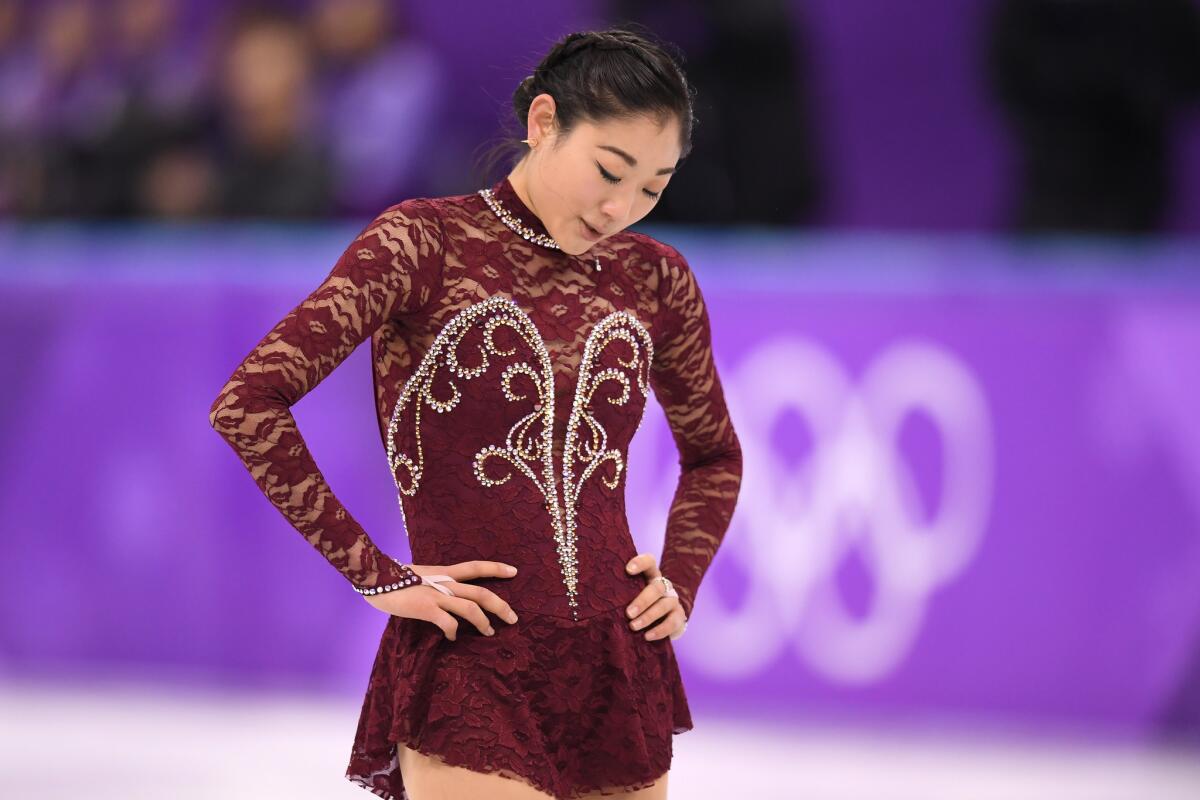
Alina Zagitova’s record-setting short program has given the 15-year-old Russian the lead over friend, training partner and two-time world champion Evgenia Medvedeva heading into Friday’s free skate.
Zagitova scored 82.92 points, breaking the mark of 81.61 that Medvedeva had set about 15 minutes earlier. Both scores topped the short program record Medvedeva set earlier in the Pyeongchang Games.
Kaetlyn Osmond of Canada was third with 78.87 points.
The American trio of Mirai Nagasu, Karen Chen and Bradie Tennell struggled with early mistakes in each of their programs. Nagasu was ninth with Chen and Tennell right behind her.
8:45 p.m.
Nine days after becoming the first U.S. woman and third overall to land a triple axel in the Olympics, Mirai Nagasu has taken to competitive ice again in the short program.
She came down on two feet on her opening triple axel, then fell to the surface. While the rest of her program was clean, Nagasu’s chances for an individual medal were damaged. She earned 66.93 points, a season’s best, but not likely to put her in position for the podium.
Nagasu, 24 and the fourth-place finisher at the Vancouver Games, helped the United States win a bronze medal in the team event with her historic jump and a spotless free skate.
7:45 p.m.
American figure skater Bradie Tennell fell during the opening combination in her short program at the Pyeongchang Olympics, such a rare mistake that not even she can remember the last time she made it.
Tennell, whose strength is her jumps, recovered to skate cleanly the rest of the way. The reigning national champion wound up with 64.01 points. As the first skater on the ice, that total should keep her in first place for quite a while.
The rest of the medal contenders all skate about two hours later.
“It was definitely unexpected,” Tennell said of her fall on a triple toe loop, “but things happen. We’re all human. We all make mistakes. You just have to get up and keep going.”
The starting order is determined in part by world rankings, and Tennell dealt with injuries much of last season and did not compete in the biggest events. That forced her into the opening group, and she drew the No. 1 starting spot from among those skaters
- Share via
Elizabeth Swaney basically attempted no tricks during her halfpipe runs in Pyeongchang. What was she doing at the Olympics?
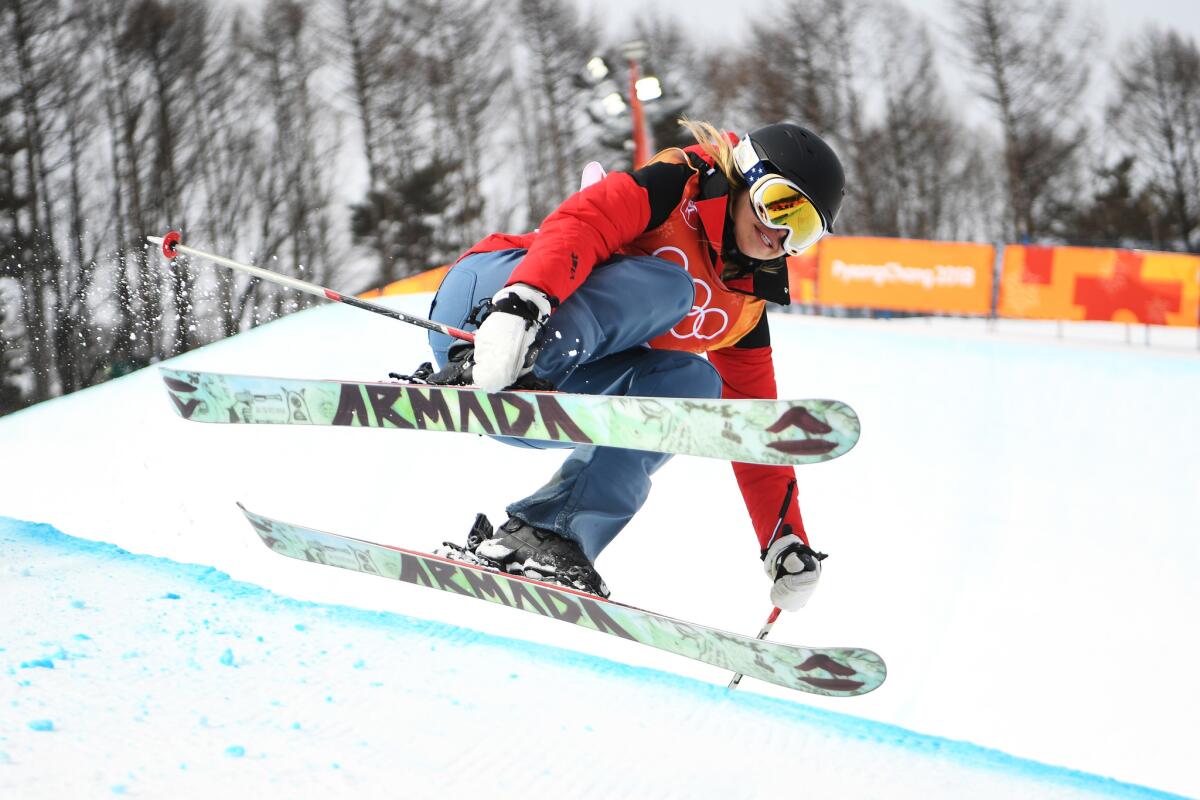
Elizabeth Swaney once ran for governor of California but lost to Arnold Schwarzenegger. She also once tried out to be an Oakland Raiders cheerleader and attempted to reach the Olympics as skeleton racer for Venezuela.
None of that panned out for her. But now the 33-year-old who has a master’s degree from Harvard and recruits software engineers in the Bay Area can say she competed in the Pyeongchang Winter Olympics as a freestyle skier.
OK, maybe “competed” isn’t the best word to describe what Swaney did in the qualifying round of the women’s halfpipe on Monday. She didn’t really do any tricks during her two runs at Phoenix Snow Park.
Basically, she went up the halfpipe wall, turned while barely in the air and went back down to the other side a number of times before finishing with her final ride with back-to-back “alley-oops,” another word for inward 180-degree turns.
She received 31.40 out of 100 possible points. Her score was more than 40 points behind the lowest score that qualified for the medal round.
“I didn’t qualify for finals so I’m really disappointed,” she said afterward, apparently with no trace of irony.
Those runs are pretty typical for Swaney, who has competed in 13 World Cup halfpipe events and placed at or near the bottom in every one. She has yet to earn a score of 40 or higher.
So how exactly did such an average skier make it to the Olympics? Swaney, whose maternal grandfather is from Hungary, merely had to finish in the top 30 at a World Cup event — something that wasn’t difficult to do since many such events don’t have close to that number of participants.
“The field is not that deep in the women’s pipe and she went to every World Cup, where there were only 24, 25 or 28 women,” longtime FIS ski halfpipe and slopestyle judge Steele Spence told the Denver Post. “She would compete in them consistently over the last couple years and sometimes girls would crash so she would not end up dead last.”
But Spence added that Swaney and others like her may have a more difficult time qualifying for future Games.
“There are going to be changes to World Cup quotas and qualifying to be eligible for the Olympics,” he said. “Those things are in the works so technically you need to qualify up through the system.”
Swaney insists her endeavor is a serious one, not some sort of publicity stunt. She’s primarily self-funded and has trained with Park City Ski & Snowboard since 2013, learning some spins off the facility’s water ramps that she hasn’t yet been able to transfer to the snow-covered halfpipe.
“Her persistence is probably her biggest strength, so she’s always there and she’s gone to all the World Cups and she’s put in the time and the miles,” Chris Haslock, a 1988 Olympic aerials athlete who is now Park & City’s free ski and snowboard program director, told the Denver Post.
“She has made some significant improvements on the water ramp, but wasn’t necessarily able to take those tricks to snow.”
Still, Swaney will forever be able to call herself an Olympic athlete.
“I’m just trying to do the best for myself and represent Hungary as best as I can,” she said on Sunday. “I really hope to inspire others in Hungary to take up freestyle skiing and I hope that contributes to a greater number of people out there freestyle skiing.”
- Share via
Tuesday’s Winter Olympics TV schedule
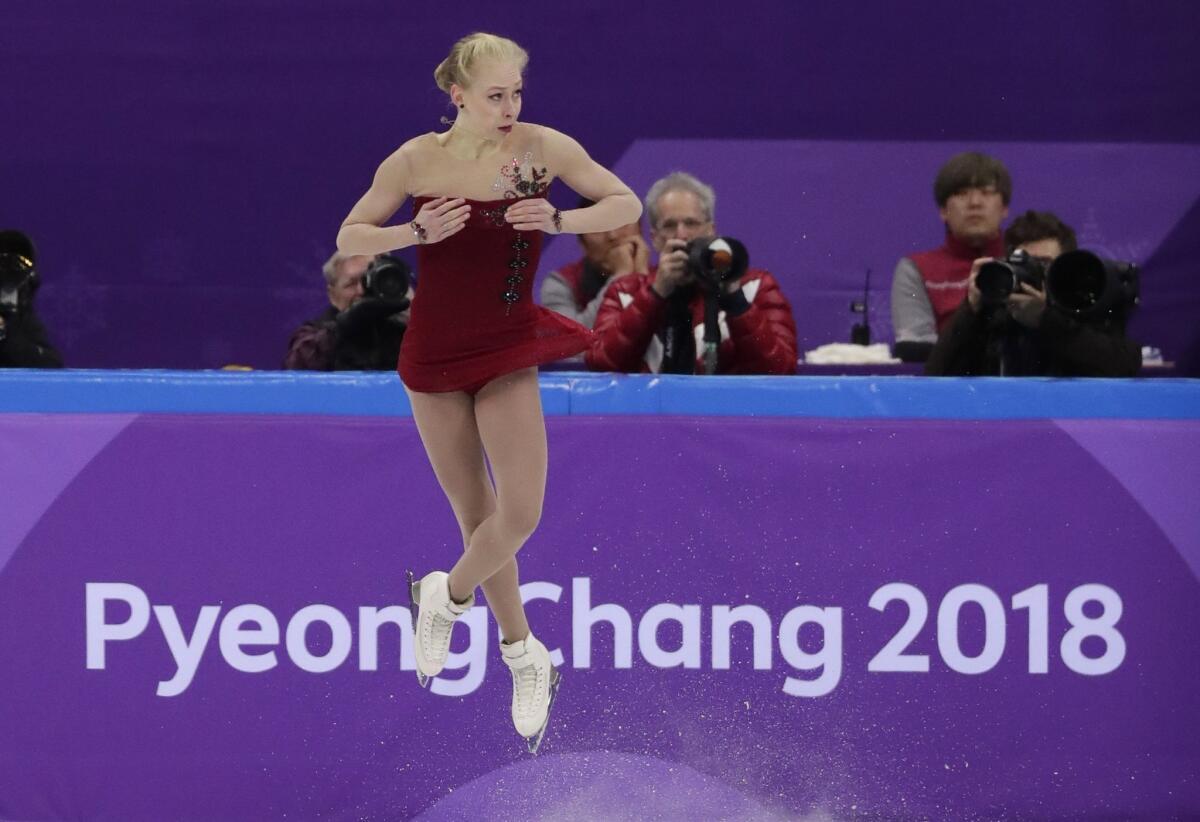
Tuesday’s Winter Olympics TV schedule. All times Pacific.
6:30 a.m.: Nordic Combined (ski jumping phase). NBCSN
7:30 a.m.: Biathlon (mixed relay). NBCSN
9 a.m.: Nordic Combined (cross-country phase). NBCSN
9:45 a.m.: Short-track Speedskating (women’s 3,000-meter relay, women’s 1,000-meter qualifying, men’s 500 meters qualifying). MSNBC
11 a.m.: Curling (women, U.S. vs. South Korea). MSNBC
Noon: Nordic Combined (ski jumping phase), Biathlon (mixed relay). NBC
2 p.m.: Hockey, teams TBD. NBCSN
2 p.m.: Curling (men, U.S. vs. Switzerland). CNBC
5 p.m.: Snowboarding (men’s big air), Bobsled (women), Alpine Skiing (women’s downhilll), Figure Skating (women’s short program). NBC
5 p.m.: Figure Skating (women’s short program, early groups). NBCSN
7 p.m.: Men’s Hockey (Quarterfinal game, TBD). CNBC
7:45 p.m.: Curling (women, Canada vs. Great Britain). NBCSN
9:05 p.m.: Freestyle Skiing (ski cross), Short-track Speedskating (women’s 3,000-meter relay, women’s 1,000-meter qualifying, men’s 500 meters qualifying). NBC
9:30 p.m.: Curling (women, South Korea vs. Olympic Athletes from Russia). NBCSN
10:35 p.m.: Repeat of 5 p.m. broadcast. NBC
11:40 p.m.: Men’s Hockey (Quarterfinal game, TBD). NBCSN
11:30 p.m.: Women’s Hockey (Bronze medal game, TBD). USA
2 a.m. (Wednesday): Curling (men, U.S. vs. Great Britain). NBCSN
2 a.m. (Wednesday): Curling (men, Sweden vs. Norway). USA
2:05 a.m. (Wednesday): Repeat of 5 p.m. broadcast. NBC
4:10 a.m. (Wednesday): Men’s Hockey (Quarterfinal game, TBD). NBCSN
4:10 a.m. (Wednesday): Men’s Hockey (Quarterfinal game, TBD). USA
- Share via
U.S. advances to quarterfinals in hockey; will meet Czech Republic
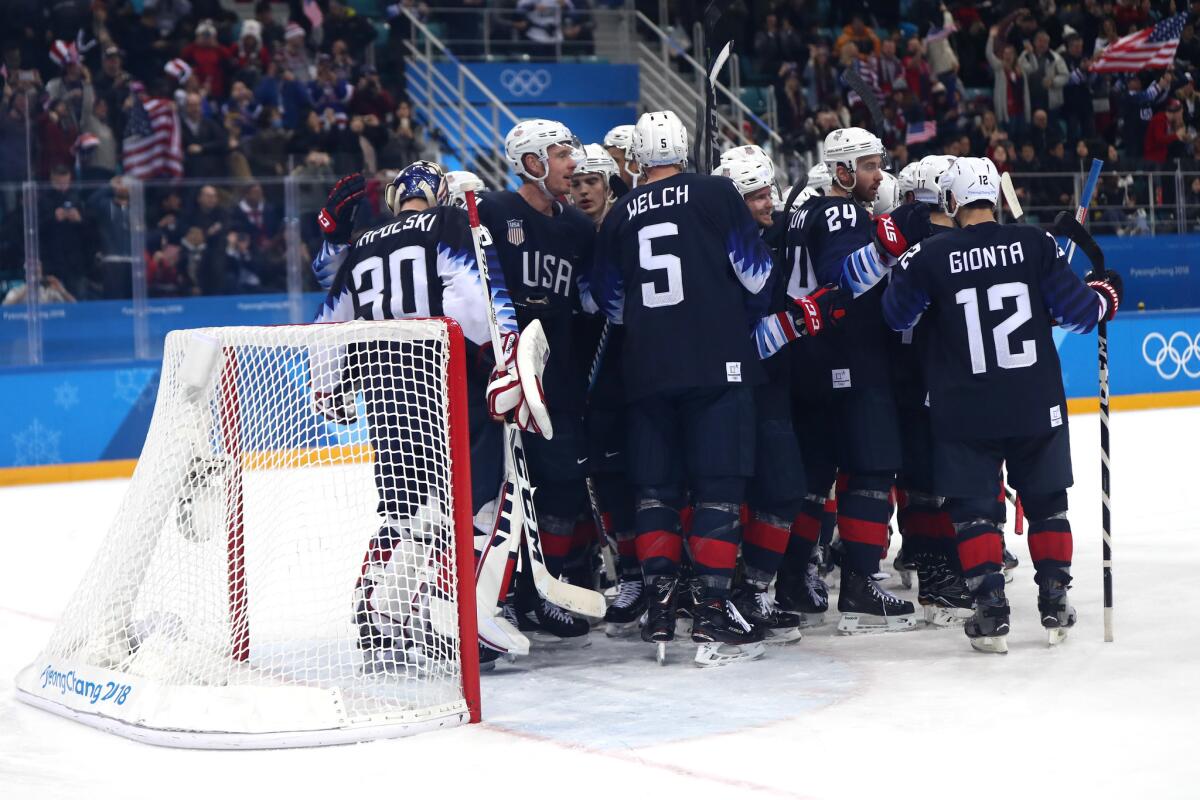
Maybe a touch of frustration had worked its way into the locker room of the U.S. men’s hockey team.
The players talked about creating opportunities but not scoring enough. It was a problem that needed fixing as they faced their first do-or-die game at the 2018 Winter Olympics.
“We came in with the idea of being confident,” forward Ryan Donato said. “If we played on our heels and kind of played worried, it would have affected our game.”
The Americans found an immediate solution in the form of a 5-1 victory over Slovakia on Tuesday afternoon, a win that advances them to the quarterfinals against the undefeated Czech Republic.
All those goals might also have given them some momentum.
“It’s as good a defensive team as probably there is in the tournament,” Coach Tony Granato said of Slovakia. “So for us to get five against them is progress.”
With a roster of college players and veterans from outside the NHL, the U.S. has struggled at times in Pyeongchang, notably in a 4-0 loss to the Olympic Athletes from Russian last week.
Their offensive woes continued in the first period against Slovakia as both sides had chances but failed to capitalize. It would take a little longer for the U.S. to finally gel.
The Americans found their rhythm as the second period got off to a wild start.
Donato, the biggest offensive threat on the roster so far, kicked things off by picking up a loose puck and shooting past Slovak goalie Jan Laco on the glove side.
About 30 seconds later, in a reckless exchange, Slovakia drew two penalties, one for goalkeeper interference and another for checking to the head and neck area when Michal Cajkovsky hit Donato high.
“It felt not too great, I’m not going to lie,” Donato said. “But it created a five-on-three.”
James Wisniewski quickly took advantage with a one-timer from the faceoff circle. Then, after Slovakia killed off the rest of the five-on-four penalty, Troy Terry, a highly regarded Ducks draft pick, wheeled behind the goal and fed Mark Arcobello out front to make the score 3-0.
The Americans had been in this position before, holding a sizable lead over Slovenia in the tournament opener. That time, they ran out of gas in the third period and ultimately lost in overtime.
The stumble might have been on their minds when Slovakia closed the gap to 3-1 late in the second period, Peter Ceresnak scoring on a power play. There were more troubles at the start of the third, with defenseman Bobby Sanguinetti sent off for tripping.
But Slovakia gave the favor right back, misplaying a puck at center ice and getting called for slashing.
That allowed the Americans to regain control and fashion another offensive burst at the end.
Garrett Roe converted a centering pass from Broc Little to make the score 4-1. Donato finished things off by flicking a shot past Laco with 3:14 remaining.
With the quarterfinals looming, there was a different mood among the U.S. players.
“It’s fun to win a game like this,” Arcobello said. “Hopefully we can build on it.”
- Share via
Canadian pair win ice dance gold; Shibutani siblings win bronze
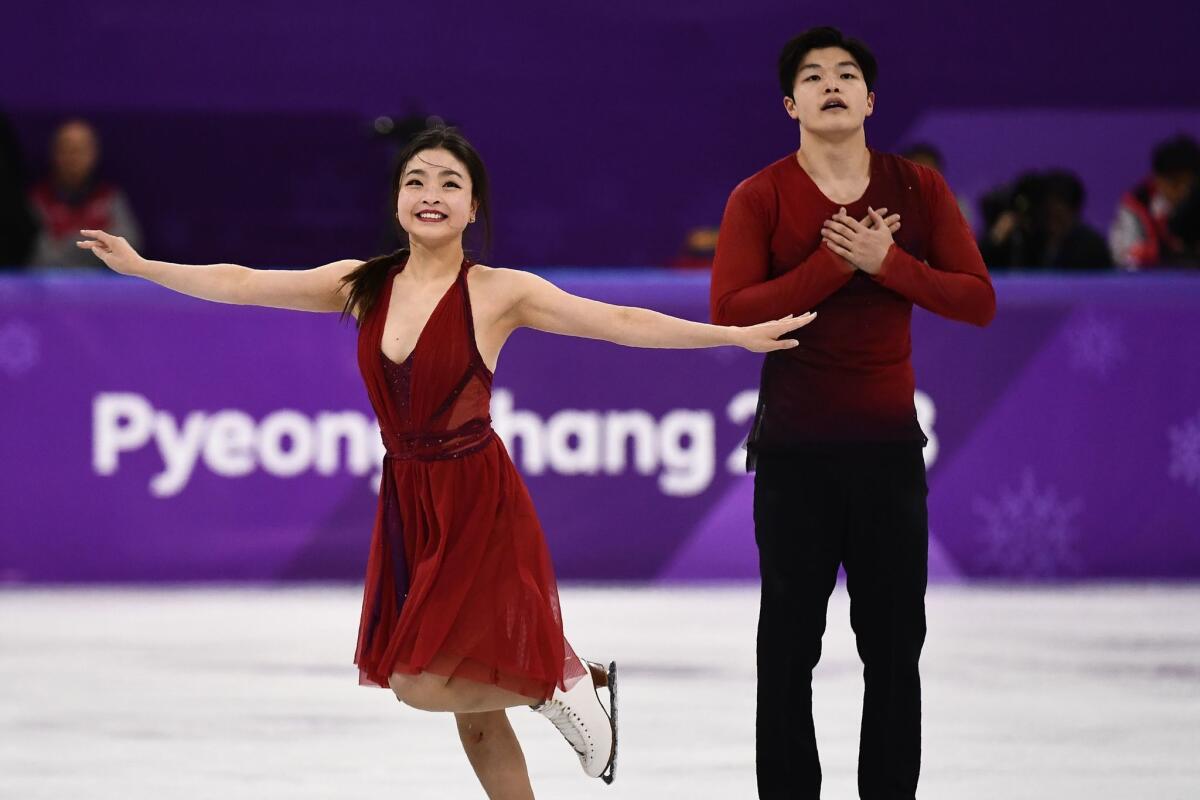
Scott Moir said his and partner Tessa Virtue’s free dance performance on Tuesday was personal, for each other, the best way they knew to honor the ice dance collaboration they’ve enjoyed for the better part of two decades.
By the time the Canadian couple completed their sultry routine to music from “Moulin Rouge,” the moment belonged not just to them, but to the ages.
Virtue and Moir held off an exquisitely enthralling performance by Gabriella Papadakis and Guillaume Cizeron of France to win the ice dance gold medal—their fifth in the sport--and set a record for the most Olympic medals won in figure skating.
The previous Winter Games record for figure skating medals was four, shared by Sweden’s Gillis Grafstrom in the 1920s and 1930s and Russia’s Evgeny Plushenko. V
irtue and Moir won ice dance gold in 2010 and ice dance silver in 2014 in addition to contributing to Canada’s team silver medal in 2014 and team gold medal here.
With three gold medals, Virtue and Moir tied Grafstrom, Irina Rodnina, and Sonja Henie for most gold medals won in figure skating. That’s elite company.
“We skated with each other in mind the whole way and we skated with our hearts,” Moir said after he and Virtue earned the second-highest scored free dance to compile 206.07 points and edge out the French duo’s total score of 205.28. “It’s extremely fulfilling.”
Another kind of history was made by the American brother and sister duo of Maia and Alex Shibutani, whose rise from fourth place after the short dance to third place gave them the distinction of being the first skaters of Asian descent to win an individual ice dance medal since the discipline was added to the Olympic program in 1976. The siblings had contributed to the U.S. team’s bronze-medal performance last week by skating both their short dance and free skate routines.
Maia, 23, and Alex, 26, switched places with American teammates Madison Hubbell and Zachary Donohue, who lost points on some sloppy twizzles (one-footed turns) and on a late stumble that Donohue couldn’t explain. The Shibutanis, whose heritage is Japanese, finished third with 192.59 points, to 187.69 for Hubbell and Donohue.
The third American couple, Redondo Beach native Madison Chock and partner Evan Bates, dropped from seventh to ninth after both fell on the entrance to a combination spin.
“We kind of knew right away, when we finished, that we had given it away,” Hubbell said. “It’s a pretty hard feeling. As much as the Olympics is about amazing dream moments, there’s a lot more Olympians that have this moment. And certainly it’s something that’s difficult, but as much as this is my dream, it was our dream to be here and we still got that dream.”
Maia Shibutani has spoken about persevering in the sport even though she never saw anyone who looked like her and her brother when they began skating in the New York area 13 years ago. She became emotional on Tuesday when she recalled the derision she and her brother have faced for skating together in a discipline that often requires skaters to tell a love story or to portray characters who are romantically involved.
“It’s incredibly special,” Maia said, “and along the way of our career there have been a lot people that have told us that maybe we shouldn’t do it, that siblings shouldn’t be a team. But we believed in ourselves and we accomplished this together, and I’m so proud of all the work that we’ve done.”
They had every reason to be proud after skating to “Paradise” by Coldplay at a good pace that built up to a dramatic ending. They are a better and more sophisticated duo than they were in finishing ninth at the 2014 Sochi Winter Games, and they’re only the second siblings to team up for an Olympic ice dance medal, after Isabelle and Paul Duchesnay won silver for France in 1992. . “It’s incredible. I don’t think anyone would have expected it of us,” Alex said. “I know no one expected it of us but we’ve always believed in ourselves and we’ve always dreamed that this was possible and we knew we had it in us.”
Virtue and Moir were the final skaters. Papadakis—whose costume had slipped off during the short dance but stayed intact on Tuesday—and Cizeron had set a monumental challenge with their program to Piano Sonata and Moonlight Sonata, forcing the Canadians to get a personal-best score to win. Virtue and more did that, earing 122.40 points and leaving Papadakis wistful.
“We knew it was possible and we really wanted it but we did our best we have nothing to regret,” she said of not having won gold.
Virtue and Moir left nothing undone in the sport. This likely was their competitive finale, though they said they’ll wait a while before making any announcements. If this is it, they left their fans and the skating world wanting more, an ideal way to depart.
“I am thrilled with this competition. That performance was really special and truly memorable,” Virtue said “The gold medal is the cherry on the cake.”
.
- Share via
Brita Sigourney of the U.S. takes bronze in ski halfpipe
Brita Sigourney won the brozne medal in the ski halfpipe Tuesday at Phoenix Snow Park.
The two-time Olympian scored 91.60 points in her third and final run to clinch the medal.
Maddie Bowman, the defending gold medalist from South Lake Tahoe, placed 11th in the final. She struggled through her runs, including crashing near the end of the third one after a solid performance.
Canada’s Cassie Sharpe (95.80) and France’s Marie Martinod (92.60) took gold and silver.
- Share via
Canada women beat Russia 5-0, will meet U.S. in hockey final
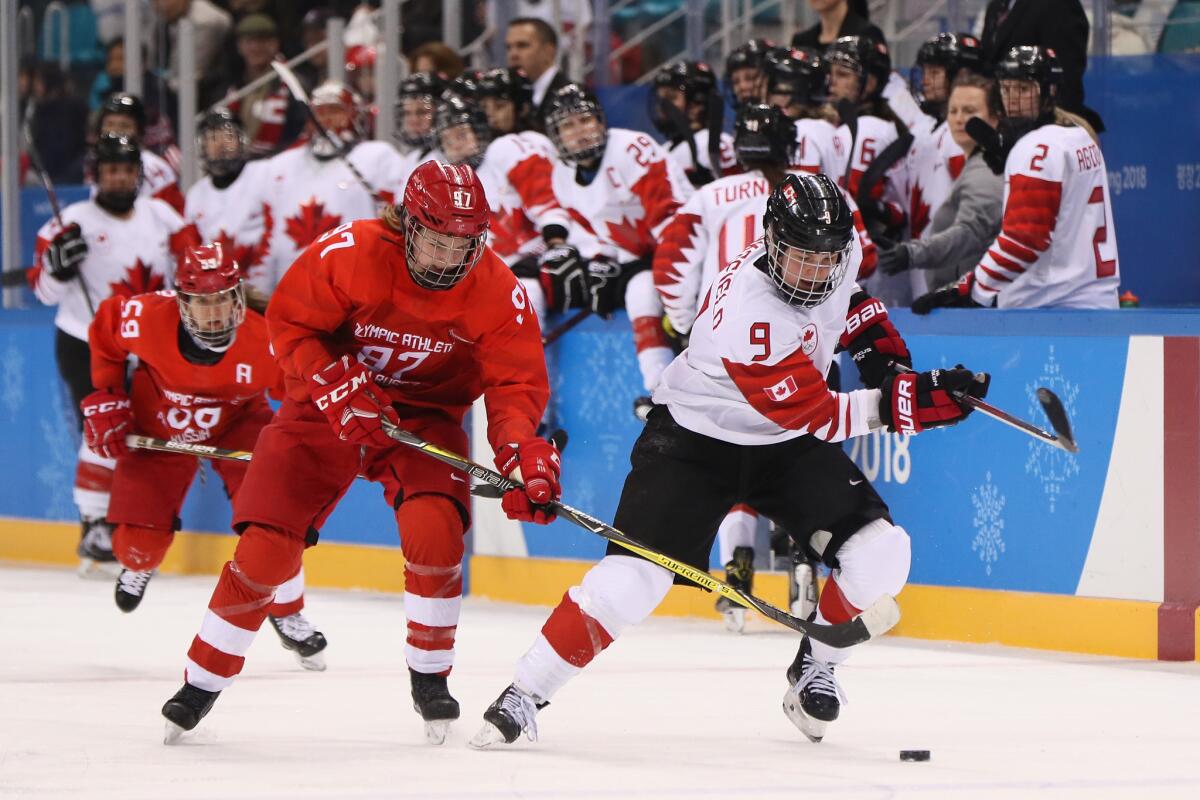
It’s part of the routine now, as much a staple of the Winter Games as the medal ceremonies, the doping scandals or the sequins on the figure skating costumes.
The United States playing Canada for the Olympic women’s hockey gold medal.
Jennifer Wakefield scored twice and Shannon Szabados stopped 14 shots on Monday night to lead the Canadians to a 5-0 victory over the Olympic Athletes from Russia and earn the four-time defending Olympic champions a spot in another gold medal game.
It will be the fifth time in six Winter Games since women’s hockey was added to the program that the North American neighbors have met in the final. No one else has ever skated away with an Olympic gold medal.
Canada outshot Russia 47-14 but struggled to pull away, scoring just once in each of the first two periods before Wakefield bounced one in off goalie Valeria Tarakanova’s right arm just two minutes into the third and then Emily Clark made it 4-0 just 31 seconds later.
Russian coach Alexei Chistyakov swapped his goalies, but it was too late. The Russians still have a chance for their first Olympic women’s hockey medal ever when they play Finland in the bronze medal match on Wednesday.
Marie Philip-Poulin and Rebecca Johnston also scored for Canada, which has won 24 in a row at the Olympics since losing the gold medal game in Nagano in 1998.
The United States advanced to the gold medal game with a 5-0 victory over Finland earlier Monday.
The Americans won the Four Nations Cup, third only to the Olympics and world championships in importance, beating Canada in three of the first four games in a Pyeongchang tuneup tour. But Canada has won the last four, with a 2-1 victory in the pool play finale on Thursday.
None of it matters, really.
The gold medal match is the game these two have been looking forward to since Canada rallied from a two-goal deficit and beat the Americans in overtime in Sochi four years ago.
And it’s the only thing right now that can help the 10 American holdovers from that team ease the pain of their 2014 collapse.
- Share via
Monday’s Winter Olympics TV schedule

Monday’s Winter Olympics TV schedule. All times Pacific.
6:30 a.m.: Ski Jumping (men’s team large hill). NBCSN
8 a.m.: Bobsled (two-man), Speedskating (men’s 500 meters, women’s team pursuit qualifying). NBCSN
9:30 a.m.: Curling (men, U.S. vs. Canada). NBCSN
Noon: Ski Jumping (men’s team large hill), Speedskating (men’s 500 meters, women’s team pursuit qualifying). NBC
12:30 p.m.: Hockey, teams TBD. NBCSN
2 p.m.: Curling (women, U.S. vs. China). CNBC
5 p.m.: Bobsled (two-man), Freestyle Skiing (women’s halfpipe final), Figure Skating (ice dance final). NBC
5 p.m.: Figure Skating (ice dance final, early groups). NBCSN
6:35 p.m.: Alpine Skiing (women’s downhill training). NBCSN
7:10 p.m.: Men’s Hockey (playoffs first round, teams TBD). NBCSN
9:05 p.m.: Freestyle Skiing (men’s halfpipe qualifying). NBC
9:30 p.m.: Curling (men, Canada vs. Japan). NBCSN
10:35 p.m.: Repeat of 5 p.m. broadcast. NBC
11:40 p.m.: Men’s Hockey (playoffs first round, teams TBD). NBCSN
2 a.m. (Tuesday morning): Curling (women, U.S. vs. South Korea). NBCSN
2:05 a.m. (Tuesday morning): Repeat of 5 p.m. broadcast. NBC
4 a.m. (Tuesday morning): Men’s Hockey (playoffs first round, teams TBD). USA
4:10 a.m. (Tuesday morning): Men’s Hockey (playoffs first round, teams TBD). NBCSN
- Share via
Mikaela Shiffrin drops downhill to focus on combined at Winter Olympics
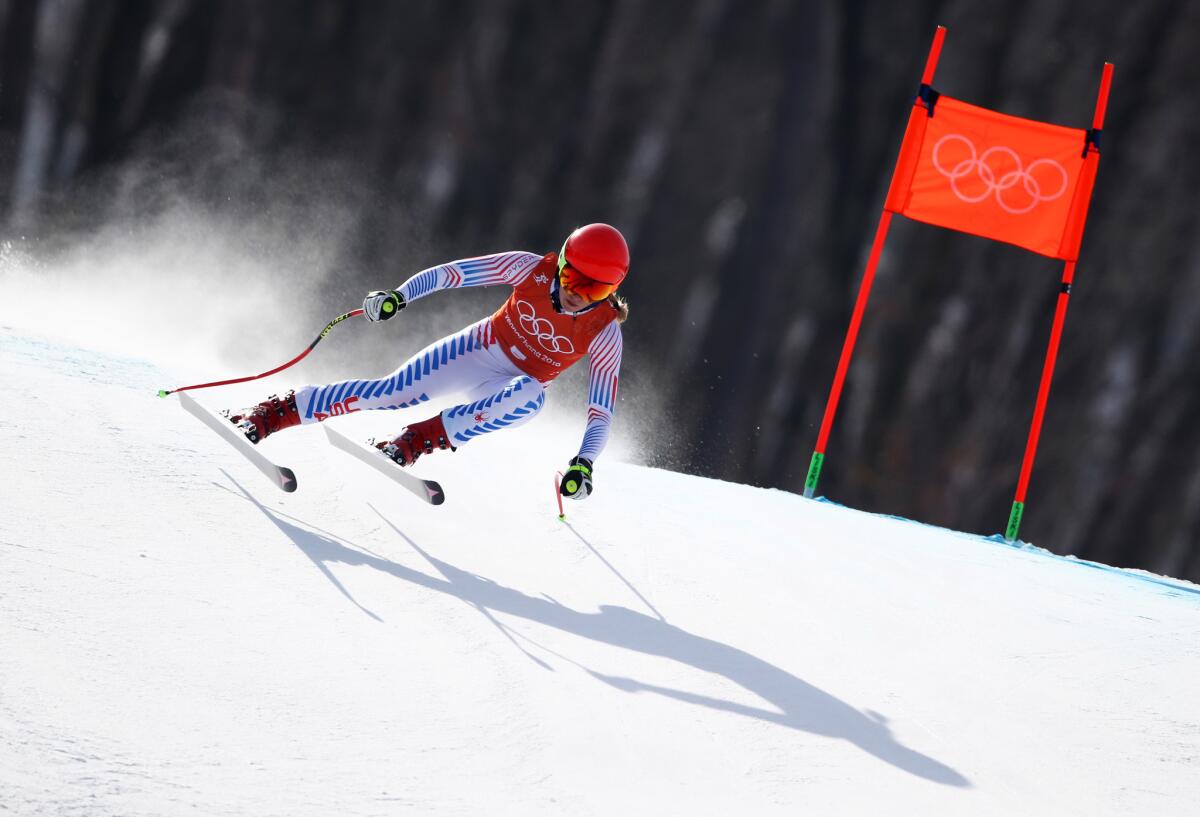
After another weather-related change to the Alpine skiing schedule at the Pyeongchang Olympics, American Mikaela Shiffrin has dropped Wednesday’s downhill.
With winds expected to increase later in the week, organizers shifted the women’s combined from Friday to Thursday.
Skipping the downhill allows Shiffrin to avoid back-to-back races and focus on the combined. She will contend for a gold medal in the event.
“As much as I wanted to compete in the Olympic downhill, with the schedule change it’s important for me to focus my energy on preparing for the combined,” Shiffrin said in a statement Monday.
Her pre-Games plan of attempting to medal in five events hasn’t gone as expected. After starting off with a gold medal in the giant slalom, she finished a surprising fourth in the slalom, her best event. She dropped the super-G after weather compacted the 11-event Alpine schedule.
Shiffrin finished 16th in Monday’s downhill training run at the Jeongseon Alpine Center. Teammate Lindsey Vonn, third in the training run, is the favorite in the race.
- Share via
Russian athletes win gold medal in men’s hockey in overtime
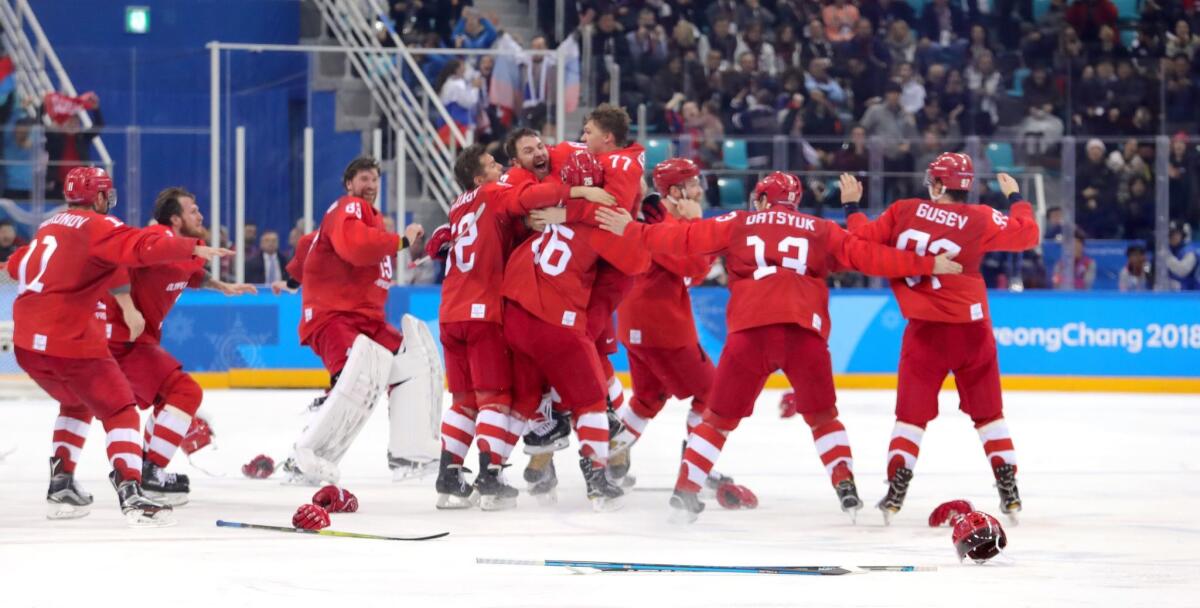
A power-play goal by Kirill Kaprizov in overtime has lifted the Olympic Athletes from Russian to the gold medal in men’s hockey with a 4-3 win over Germany at the Pyeongchang Olympics.
It’s the first gold in men’s hockey for Russians since 1992.
Kaprizov also had three assists Sunday. He scored on a one-timer from the right circle off a pass from Nikita Gusev.
Gusev also had two goals and two assists. He scored his second with 55.5 seconds left in regulation to force overtime.
Ilya Kovalchuk had a chance to win the game 6:30 in only to have his forehand stopped by a tremendous pad save by German goalie Danny aus den Birken.
The Germans still go home with the best medal they’ve ever won in hockey: silver.
- Share via
Wardrobe malfunction doesn’t derail French pair in ice dance; Canadian pair takes lead and Americans in contention
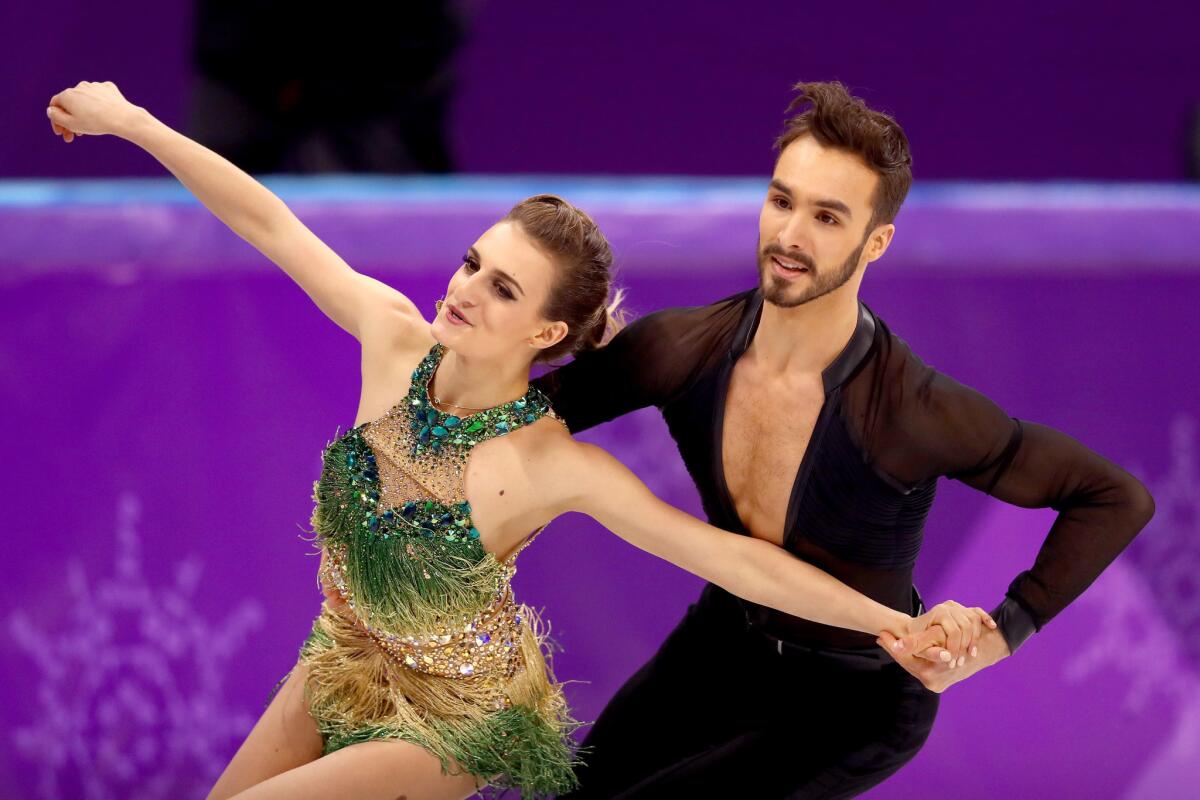
All that held Gabriella Papadakis’ costume together were a few frayed threads and the prayers of her partner, Guillaume Cizeron.
The top of her dress came loose while the French couple warmed up for the short dance portion of the ice dance competition on Monday at Gangneung Ice Arena but they had no time to fix it.
Her desperate efforts to keep it from slipping off hampered her movement and spoiled the stunning unison the two-time world champions usually display during their routine to samba and rhumba music.
“I think in the twizzles it kind of affected us the most,” Cizeron said, referring to the rapid, one-footed turns that ice dancers frequently perform, “because when you are rotating it is hard to keep your dress on when it’s open.”
Her costume eventually gave way and she experienced a wardrobe malfunction that exposed her breast, much to her embarrassment. That’s what most casual watchers will remember.
But it shouldn’t be forgotten that they managed to hold things together well enough artistically to stay within reach of a gold medal despite a world-record short dance performance by Canadians Tessa Virtue and Scott Moir, the 2010 Olympic champions and 2014 silver medalists.
Skating to samba, rhumba and cha-cha music, Virtue and Moir danced their way to 83.67 points to top the field leading into Tuesday’s free-dance finale. Papadakis and Cizeron scored 81.93 points despite their problems. “Two points can be caught up,” Cizeron said. “If we do our best, we have our chances to win.”
U.S. champions Madison Hubbell and Zachary Donohue are third with a personal-best 77.75 points in their Olympic debut, ahead of the American brother-sister duo of Maia and Alex Shibutani (77.73).
The third American entry, Madison Chock and Evan Bates, did well to rank seventh after a mishap on a lift during their warmup aggravated a loose bone fragment in Chock’s foot and caused her intense pain. They had a season-best 75.45 points.
Hubbell said she and Donohue planned to be aggressive with their samba-rhumba program, and they succeeded. “We wanted to be proud of ourselves, we wanted to be proud of the effort and show all of the work we did back home,” Hubbell said. “I was really inspired watching some of the other events, watching pairs and Adam [Rippon]. People just really have been going for it at these games. Even in the team event nobody held back, and that’s something the Olympics are about.”
An American couple has won an ice dance medal at three straight Olympics, and a fourth straight visit to the medal stand is distinctly possible. Tanith Belbin and Ben Agosto won silver at Turin in 2006, Meryl Davis and Charlie White won silver at Vancouver in 2010, and Davis and White won gold at Sochi in 2014.
Virtue and Moir, who also won a team silver medal at Sochi and a team gold medal here last week, surpassed their effort in the team event by more than four points with a sizzling routine.
“It’s as if you were watching a ballroom team compete, and the rhumba is a very sensual, sexual dance,” Virtue said. “The samba and cha-cha rhythms are fun. It’s an easy program to engage the audience, so we’re really trying to bring people in with this and hopefully have some fun.”
The Shibutanis shrugged at their score, clearly believing their marks didn’t reflect the quality of their performance, which improved upon the 75.46 points they had gotten for their short-dance performance in the team event. They also performed their free dance in the U.S. team’s bronze-medal effort.
“That was the skate that we wanted to have,” Maia Shibutani said. “Going into [Tuesday] we have three fantastic skates under our belt, and that gives us a lot of confidence to just go out there and enjoy it.”
Chock said she and Bates had altered their short program following their third-place finish at the U.S. championships last month, “to have our short dance be rejuvenated and have a fresh feel.” They were happy with the changes—and with her new dress, which had a bird theme and incorporated all five colors in the Olympic rings—but she found it difficult to ignore the pain in her foot, which has led her to get frequent cortisone injections.
“Considering everything, considering the stumble in the warmup and the pain that Maddie skated in, it’s incredible,” Bates said. “We’ll definitely take that performance and that score and look for a special performance [Tuesday].”
Papadakis and Cizeron are looking for a performance that’s special because of what they do, not what she’s wearing. “Tomorrow is a new day and we’ll do our best as always,,” he said. “here is nothing we could do about this. We just have to keep going.”
- Share via
U.S. women’s hockey team advances to the gold medal game
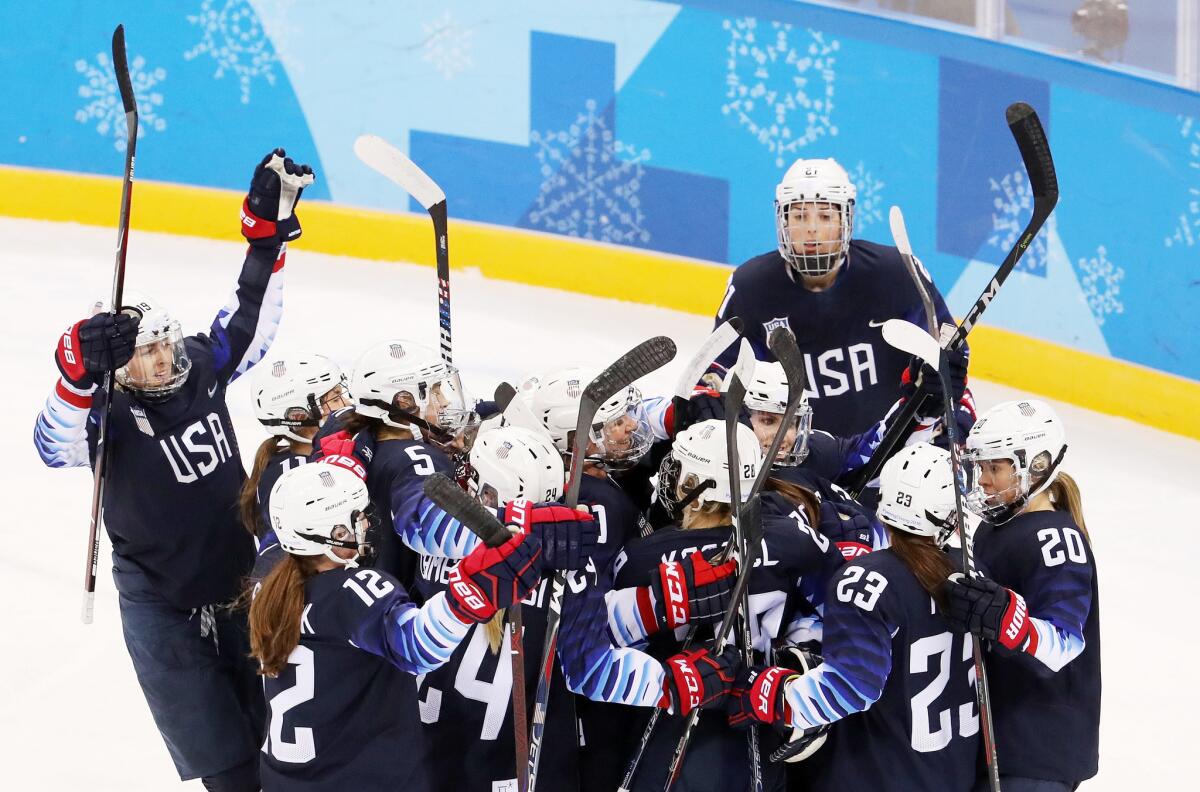
None of the last 10 days really mattered and that included Monday, when the United States cruised to a 5-0 victory over Finland in the semifinals of the women’s hockey tournament.
The 17 games played up to this point have served as something of a prolonged and gratuitous qualification phase for the inevitable gold-medal contest between the United States and Canada.
So long as Canada defeats the Olympics Athletes from Russia – in other words, Russia – the anticipated rematch of the previous two Olympic finals will take place Thursday at Gangneung Hockey Centre. Count on it happening. The Canadians already crushed the Russians in the opening round of this tournament, 5-0.
These are the fifth Olympics to include women’s hockey, but the sport as a whole remains painfully backward, as the national programs outside of the U.S.’s and Canada’s are in the athletic Stone Age.
Finland was the perfect example of that.
The Fins are the world’s third-ranked team but if they had as much as chance of upsetting the U.S. as they did of brokering world peace.
The Americans defeated the Fins in their Olympic opener, 3-1. This would be worse. Significantly worse.
All-world goaltender Noora Raty couldn’t save the Fins, who were overwhelmed in virtually every aspect of the game. The U.S. went ahead in the first period, 2-0, on goals by Gigi Marvin and Dani Cameranesi.
The Americans showed they weren’t here to play around, as a hip check by captain Meghan Duggan sent defender Ronja Savolainen head-first into the nearby walls. Savolainen crumbled to the ice and remained down for several minutes as her teammates crowded around her in concern.
Savolainen was escorted to the locker room, but later returned.
Duggan wasn’t penalized, eliciting a chorus of boos from the half-empty arena.
The Fins never retaliated and the Americans continued to do whatever they wanted. Joselyne Lamoureux-Davidson’s one-timer with 6:39 remaining in the second period extended the U.S. advantage to 3-0. Hilary Knight redirected a shot by Sidney Morin 34 seconds later to make it 4-0.
Cameranesi added a fifth goal in the third period.
Like that, the Americans advanced to the game they have waited four years to play.
The U.S.’s only gold medal at this tournament was won in 1998, the first year women’s hockey was contested at the Games.
The Americans dropped the final game to Canada in 2002, 2010 and again in 2014. The most recent of the defeats was also the most painful, as the U.S. blew a two-goal lead in the third period and choked in overtime to lose, 3-2.
Curiously, the U.S. has been as dominant at the world championships as the Canadians have been at the Olympics. The U.S. has won eight of the 10 world championships contested since 2005, including the last four.
The U.S. and Canada played each other in the last game of the group stage of this Olympic tournament. Canada won, 2-1, but it didn’t matter. Only the game Thursday counts.
- Share via
IOC faces tough questions after Russian curler tests positive for doping
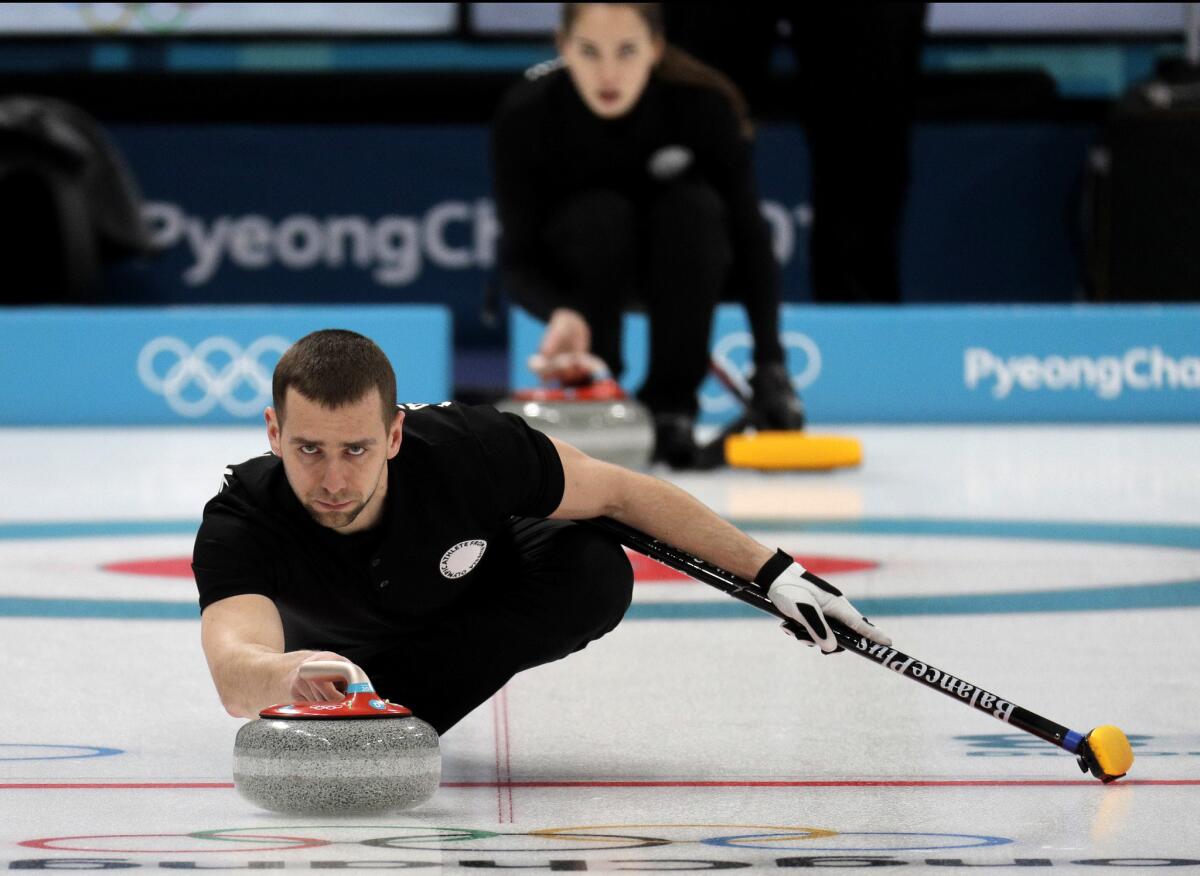
Amid reports that a male Russian curler has tested positive for doping, officials at the 2018 Winter Olympics find themselves facing tough questions about the integrity of these Games.
A member of the Russian women’s squad confirmed on Monday that team officials had informed them of the situation.
“It was the main coach who came to tell us the news and we actually just read the news because it was pretty late at night and we were all in our rooms,” curler Victoria Moiseeva told reporters. “We tried to fall asleep and it was a little hard.”
The situation is troublesome because, although Russia is banned from taking part as a nation, the International Olympic Committee made the controversial decision to let individual athletes from the nation compete if they met a series of criteria.
“It’s extremely disappointing for Russia if a case is proven,” IOC spokesman Mark Adams said. “On the other hand, what it does show is that we have a system that is effective.”
Alexander Krushelnitsky, who won the bronze medal in mixed-doubles curling with his wife, is suspected of having tested positive for meldonium, according to multiple news reports.
Meldonium has been in the news before – scores of Russian athletes, including tennis star Maria Sharapova, have been found with the drug in their systems.
The pharmaceutical was developed to increase blood flow and has been used for treatment of heart ailments. That also would make it beneficial to athletes as a performance enhancer.
“We will never reach a point where we have no doped athletes,” Adams said when asked if athletes from other countries should have confidence they are competing on a level playing field. “It’s like saying we’re going to do away with burglary or murder.”
Russia was banned from the Olympics after multiple investigations found systemic cheating among its athletes, coaches and officials. There was additional evidence that Russian lab workers had tampered with samples to mask positive results.
The IOC subsequently announced that individual athletes who could prove they had competed cleanly would be invited to join an “Olympic Athletes from Russia” squad that would compete under a neutral flag.
With 169 athletes ultimately invited, some anti-doping authorities – as well as athletes from other countries – questioned the decision.
The IOC has been monitoring the OAR squad in Pyeongchang, Adams said, explaining that officials have been “looking throughout the Games at actions and deportment of the team and its officials.”
Whenever drug testers detect a positive result from an “A” sample, they can test a separate “B” sample to confirm their initial finding. Results from that second examination were expected at some point Monday.
“We didn’t talk to [Krushelnitsky],” Moiseeva said. “We thought that there are no words to comfort now. We just tried to stay away, not because we’re afraid to say something.”
If one of its athletes is caught cheating, the OAR squad could be barred from taking part in the closing ceremony on Sunday.
Adams declined to speculate on further sanctions, saying only that the IOC would continue to watch the contingent.
“There’s running surveillance on that,” he said. “Everything will be taken into account.”
- Share via
Lindsey Vonn responds to social media attacks: ‘I haven’t changed my mind’
The social media onslaught against Lindsey Vonn doesn’t seem to be bothering the U.S. Alpine skiing star.
After Vonn failed to medal in the super-G last week, a slew of posts by supporters of President Trump, often using profane or threatening language, celebrated the result.
“I always try to remember that it’s people talking behind a computer and they’re going to say anything,” Vonn said Monday after her second downhill training run at the Jeongseon Alpine Center.
“There’s going to be people who hate me and hope I ski off a cliff and die. But that’s fine. I’m not going to do that. And, you know, I just take it for what it is. At some point you have to laugh and say, ‘This is completely ridiculous.’”
Her skiing didn’t draw the social media ire, but rather comments she made during an interview with CNN in December that were critical of the Trump administration. She also said she would “absolutely not” visit Trump’s White House if she won a gold medal.
Vonn had the third-fastest training time Monday — she didn’t go all-out — in advance of Wednesday’s final where she is the favorite.
She doesn’t plan to adjust her social media use — or political beliefs.
“I haven’t changed my mind,” Vonn said.
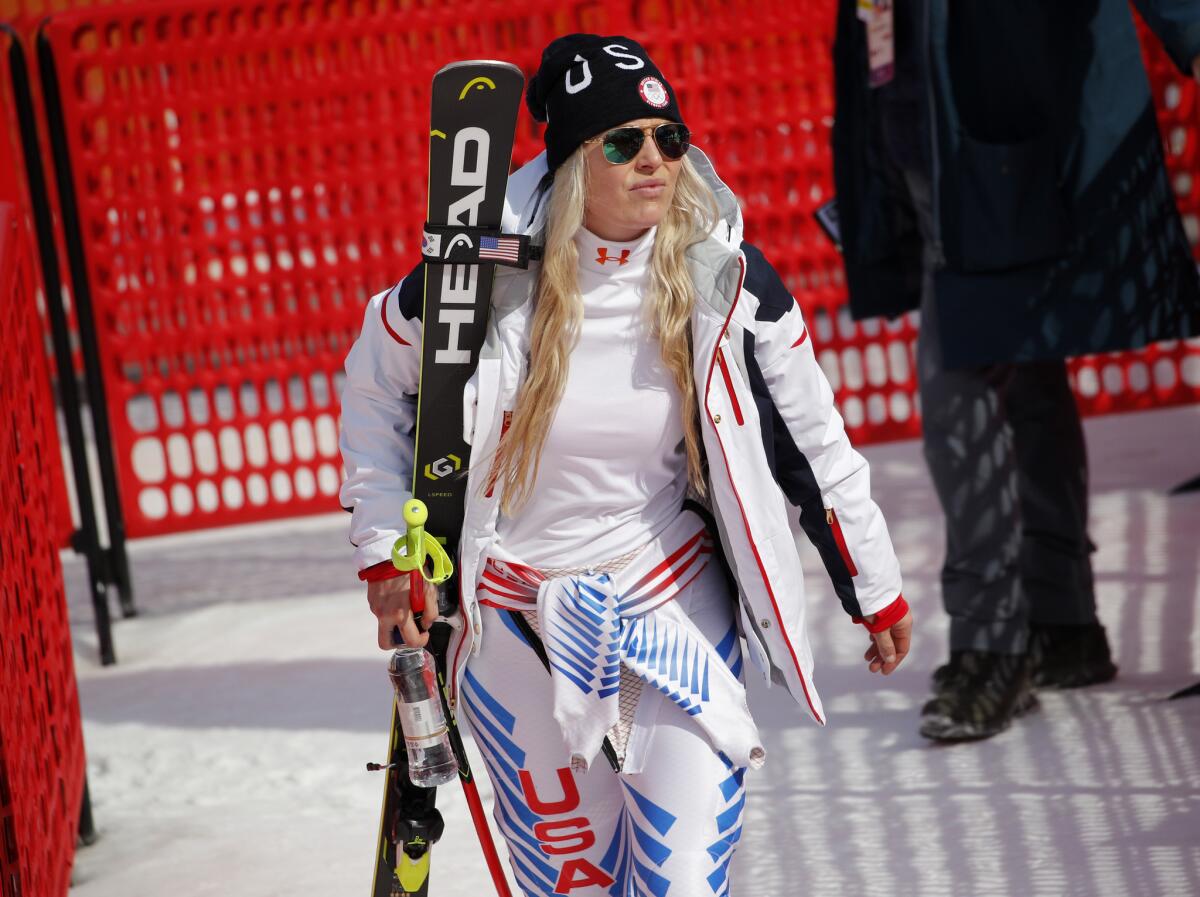
- Share via
Canadian pair take lead after short program in ice dance; three American pairs in medal contention
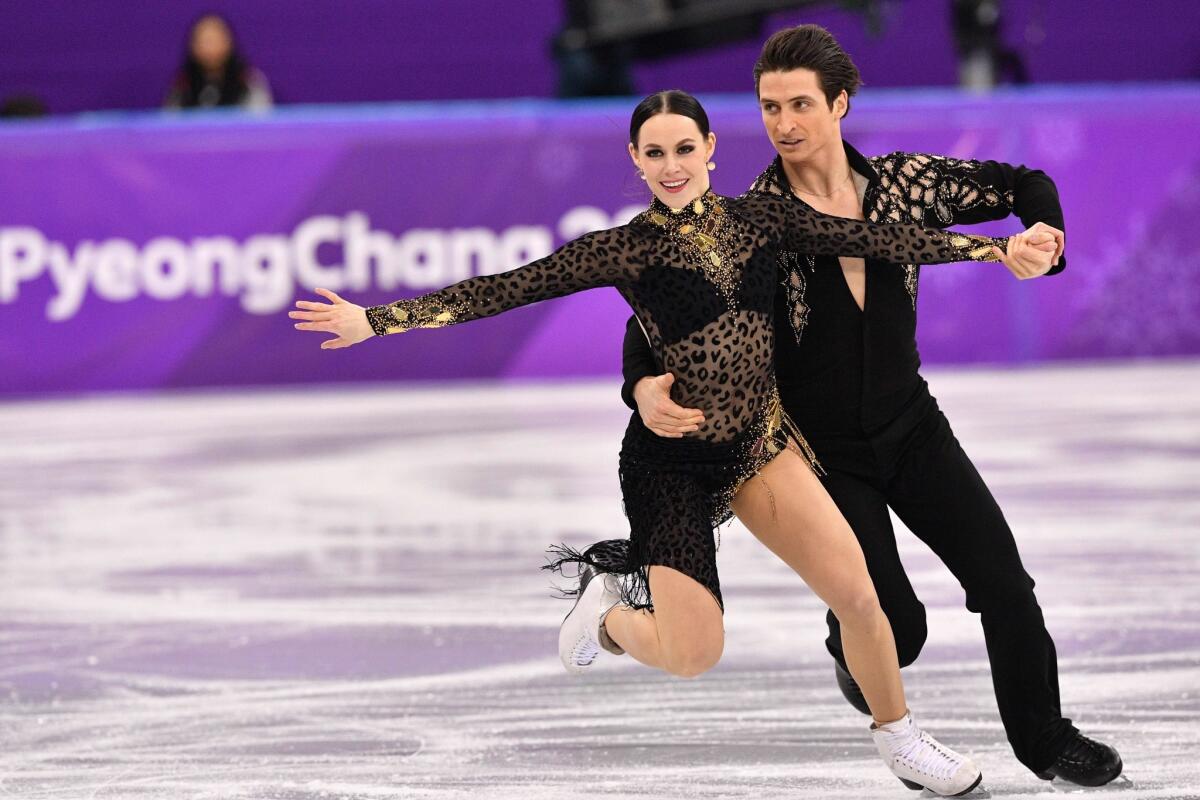
Tessa Virtue and Scott Moir came out of retirement to win more Olympic gold.
Only the free dance stands in their way.
The Canadian ice dancers broke their own record for a short program at the Pyeongchang Olympics on Monday, piling up 83.67 points with a harmonious, rock-inspired performance.
That score edged their own record set last year by nearly a point, and left them more than a point ahead of their training partners and biggest rivals, Gabriella Papadakis and Guillaume Cizeron.
The French couple appeared a bit thrown off by Papadakis’s costume, which came unhooked at the neck during their program. They held things together despite the wardrobe malfunction and scored 81.93 points, and now will rely on their stronger free dance Tuesday to track down the leaders.
U.S. champs Madison Hubbell and Zachary Donohue were third, two-hundredths of a point ahead of their compatriots, Maia and Alex Shibutani. The third American couple, Madison Chock and Evan Bates, was seventh and in medal contention despite an injury that she aggravated during warmups.
Virtue and Moir won Olympic gold at the 2010 Vancouver Games, then won silver four years later in Sochi, Russia. They stepped away from competition for two years, the taxing grind of more than 15 years spent working together having taken its toll, but returned to make another Olympic run.
They were nearly unstoppable last season, winning the world championship as if they had never been away, but were upset by Papadakis and Cizeron at the Grand Prix Final in December.
They proved Monday that they’re still the team to beat.
Performing to Latin-infused music by the Rolling Stones, Eagles and Santana, Virtue and Moir were in lock-stop from the moment they stepped on the ice. They received level-four marks across the board, highlighted by their dazzling midline step sequence to open the program, and nailed their rhumba sequence on which they were harshly graded in helping Canada win the team event.
The crowd, relatively sparse compared to other figure skating sessions, roared as the three-time world champions skated off to await their scores. The fans roared again when their record numbers were read, and the longest-tenured ice dance team in Canadian history smiled and hugged.
Papadakis and Cizeron followed them onto the ice and received mostly level-four marks, underscored by their in-step rhumba. The only miscue came on their closing straight line lift, perhaps because they were distracted by her emerald and blue dress revealing a bit too much.
Hubbell and Donohue proved their win last month at nationals, after years of frustration, was no fluke with a dramatic performance dragged down only by a small bobble on their synchronized twizzles.
The Shibutanis, who helped the U.S. win team bronze, overcame a shaky start to their performance with a strong second half, including a breathtaking rotational lift to finish.
Meanwhile, Chock and Bates had to push aside the uncertainty caused by her injury to put together a strong opening performance. Chock has a floating bone fragment in her right foot that she’s dealt with all season, and it caused some pain about 30 seconds before their warmup was complete.
She planned to see a doctor later Monday, but doesn’t expect to miss the free skate.
- Share via
U.S. men’s hockey team will face Slovakia in qualification round match to stay alive in Olympic tournament
The U.S. men’s hockey team, which finished third in its preliminary-round group in the Olympic tournament, will face Slovakia in a qualification round game Tuesday at 12:10 p.m. KST at Gangneung Hockey Centre. The winner will advance to a quarterfinal matchup against the Czech Republic here Wednesday.
The winner of each of the three groups and the team with the second-best record received byes to the quarterfinals. The Czechs won Group A, the Olympic Athletes from Russia won Group B, and Sweden won Group C. Canada had the best record among the second-place teams.
Slovakia finished fourth, one place behind the U.S., in preliminary-round play in Group B. The two teams met in the first round, with the U.S. winning 2-1 on a pair of power-play goals scored by Ryan Donato, one of four college players on the U.S. roster. That was the U.S. team’s only victory in the first round; Coach Tony Granato’s team lost to the Olympic Athletes from Russia, 4-0, and lost to Slovenia 3-2 in overtime.
In the other qualification round matchups, Slovenia will face Norway, with the winner to face the Olympic Athletes from Russia in the quarterfinals; Finland will face Korea, with the winner to face Canada in the quarterfinals, and Switzerland will face Germany for the right to face Sweden in the quarterfinals.
The semifinals will be played on Friday. The bronze medal match is scheduled for Saturday and the gold medal game is scheduled for Sunday.
- Share via
IOC comments on report that Russian curling medalist tested positive for banned substance
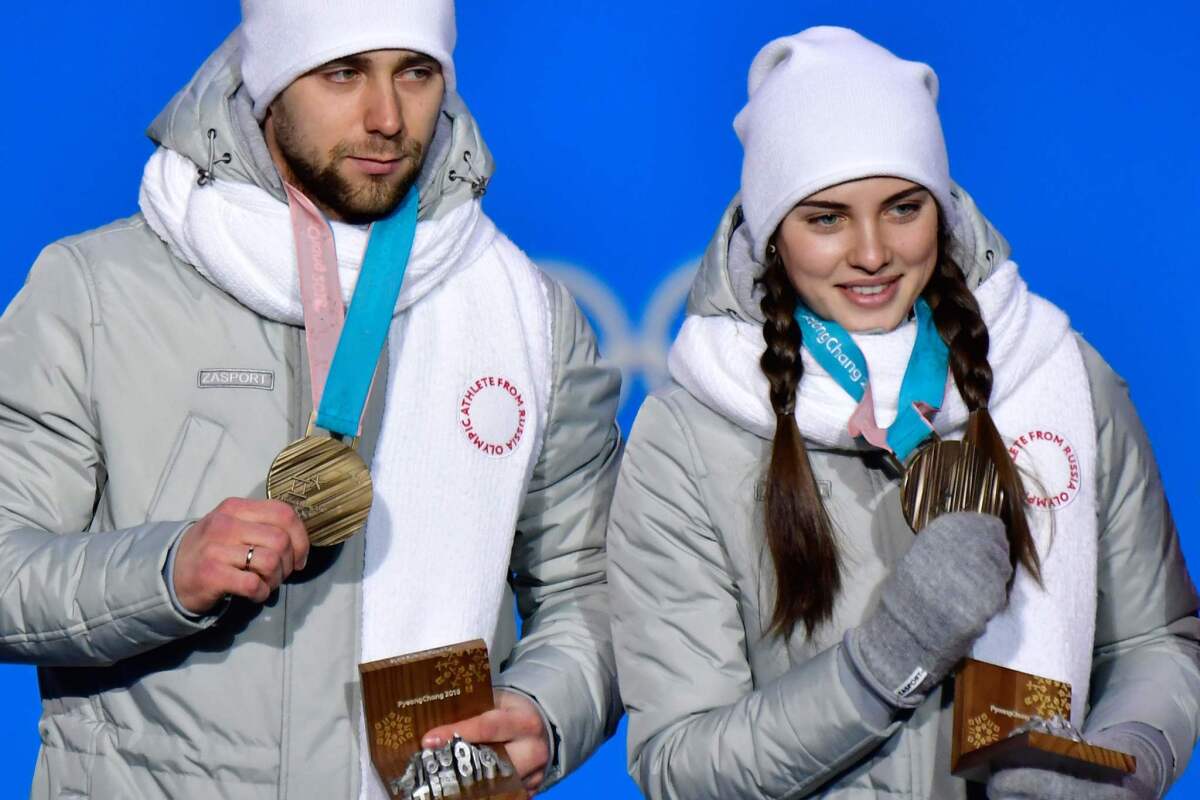
The International Olympic Committee on Sunday offered only brief comment on a news report that a Russian medalist had tested positive for a performance-enhancing drug at the 2018 Winter Games.
“On the one hand it is extremely disappointing when prohibited substances might have been used,” the IOC said in a statement, “but on the other hand it shows the effectiveness of the anti-doping system at the Games which protects the rights of all the clean athletes.”
Alexander Krushelnitsky, who won the bronze medal in mixed-doubles curling with his wife, is suspected of having tested positive for meldonium, Reuters said, citing an unnamed source.
Meldonium has been in the news before — numerous Russian athletes, including tennis star Maria Sharapova, have been found to have had the drug in their systems after testing.
The drug is designed to increase blood flow and has been used for treatment of heart ailments. It would also be beneficial to athletes as a performance enhancer.
In the wake of a widespread doping scandal, Russia was banned from taking part in the Pyeongchang Olympics as a nation.
All of the Russian athletes in Pyeongchang were invited to join a neutral “Olympic Athletes from Russia” squad after presenting evidence that they had not cheated. The IOC stated: “Only athletes for whom there was no suspicion were invited to the Games.”
- Share via
Sunday’s Winter Olympics TV schedule
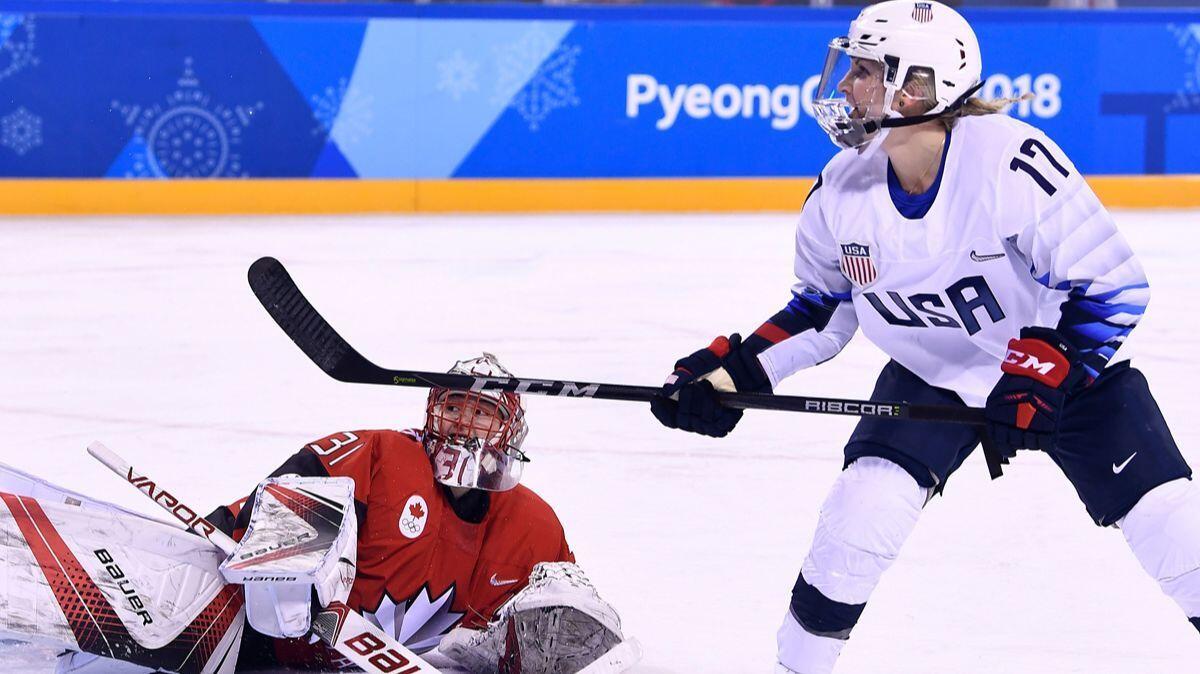
Sunday’s Winter Olympics TV schedule. All times Pacific.
6:30 a.m.: Bobsled (two-man). NBCSN
7:15 a.m.: Freestyle skiing (men’s aerials final). NBCSN
8:15 a.m.: Speedskating (women’s 500, men’s team pursuit qualifying). NBCSN
9 a.m.: Biathlon (men’s 15-kilometer mass start). NBCSN
10 a.m.: Cross-country skiing (men’s 40-meter relay). NBCSN
Noon: Biathlon (men’s 15-kilometer mass start), speedskating (men’s team pursuit qualifying), freestyle skiing (men’s aerials final). NBC
Noon: Hockey, teams TBD. NBCSN.
1 p.m.: Curling (men, U.S. vs. Norway). CNBC
4 p.m.: Bobsled (two-man), speedskating (women’s 500 meters), freestyle skiing (women’s halfpipe), figure skating (ice dance). NBC
5 p.m.: Figure skating (ice dance, early groups). NBCSN
7:15 p.m.: Freestyle skiing (men’s aerials final). NBCSN
8:10 p.m.: Women’s hockey (semifinals, U.S. vs. Finland). NBCSN
9:35 p.m.: Snowboarding (big air). NBC
10:30 p.m.: Curling (women, U.S. vs. Denmark). NBCSN
11:35 p.m.: Repeat of 4 p.m. broadcast. NBC
1:30 a.m. (Monday morning): Curling (men, U.S. vs. Canada). NBCSN
4:10 a.m. (Monday morning): Women’s hockey (semifinal, Canada vs. Olympic Athletes from Russia). NBCSN
- Share via
Defending gold medalist Ted Ligety finishes 15th in giant slalom
Ted Ligety’s battered body finally felt normal.
In the last four years, the most recognizable men’s Alpine skier in the U.S. underwent surgery to insert four screws in his broken left wrist, fix a torn anterior cruciate ligament in his right knee and repair three herniated discs in his back that caused persistent nerve pain down his left leg.
“I am the healthiest I have felt in I don’t know how many years,” Ligety said shortly after arriving at the Pyeongchang Olympics.
But the newfound health hasn’t translated into the usual success for the 33-year-old from Park City, Utah, in the twilight of his career. Nicknamed “Mr. GS” because of his prowess in the giant slalom, Ligety failed to reach the podium in the event Sunday at the Yongpyong Alpine Centre.
“I just didn’t attack the way I should’ve or could’ve,” he said.
Ligety couldn’t overcome an uncharacteristic first run down the course between stands of barren, scraggly trees. Yes, Austrian star Marcel Hirscher, coming off a gold medal in the combined event, set a blistering pace down the hill. But Ligety didn’t look like one of the greatest slalom skiers in history. He ranked 20th after the first run, 2.44 seconds behind Hirscher.
“I was really surprised when I saw the time,” Ligety said. “I didn’t feel like I crushed it, but I didn’t feel two and a half seconds back. … For me, I’m out of it.”
Despite minimal wind and temperatures that climbed above 30 degrees, 24 of the 110 competitors either crashed or were disqualified during the first session.
Ligety’s second run was marginally better, 0.17 seconds faster than his first try. He still trailed teammate Ryan Cochran-Siegle, who briefly took the lead by a half-second after blazing through the course.
As expected, Hirscher won gold, finishing 1.27 seconds ahead of Norway’s Henrik Kristoffersen. France’s Alexis Pinturault took bronze.
The early gap made a medal all but impossible for Ligety in the event that, more than any other, became synonymous with the winner of 25 career World Cup races. He won five World Cup titles in the giant slalom and captured the gold medal in the event at the Sochi Olympics in 2014. He is one of three U.S. Alpine skiers — Mikaela Shiffrin and Andrea Mead Lawrence are the others — with two career gold medals.
But Ligety, competing in his fourth Olympics, hasn’t won the giant slalom in a World Cup event since October 2015 in Solden, Austria. The injuries didn’t help.
Last month provided a glimmer of hope. He finished third in the event at Garmisch-Partenkirchen, Germany, in late January, his final race before the Olympics. Ligety’s performance had been mixed in Pyeongchang, placing fifth in the combined, 18th in the downhill and not finishing the super-G.
But the familiar course at the Yongpyong Alpine Center, where he won a World Cup giant slalom in 2006, seemed to be an advantage.
“It’s a hill that suits me,” Ligety said.
- Share via
Nick Goepper wins silver in ski slopestyle
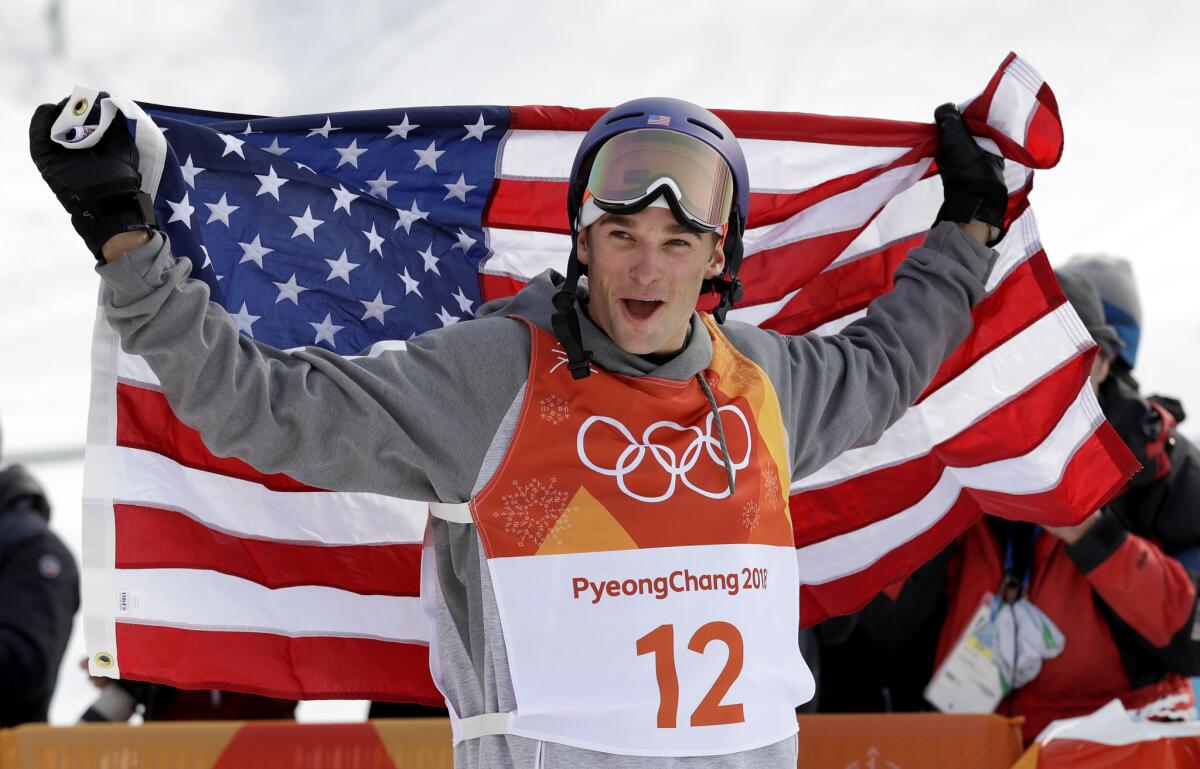
The American men knew it wasn’t going to be easy this time.
Four years ago, they dominated the Olympic ski slopestyle, finishing in the top three spots. But key injuries and some new faces figured to level the field at the 2018 Winter Olympics in Pyeongchang.
“There are so many countries so competitive and so good in slopestyle,” said Gus Kenworthy, the defending silver medalist.
That international talent showed up at the Phoenix Snow Park on Sunday afternoon as Oystein Braaten of Norway took the gold and Alex Beaulieu-Marchand of Canada won bronze.
The lone U.S. representative on the podium was Nick Goepper, who needed a dazzling final run to secure the silver.
As Braaten put it: “The level was so high … just being part of a final like this was amazing.”
Goepper seemed glad to at least improve on the bronze he won at the 2014 Sochi Games.
“I was thinking, this is it, this is my final chance,” he said. “I’m at my second Olympics. I want a medal.”
The sport of slopestyle has skiers navigating their way downhill through a series of obstacles and jumps. Judges watch for how they slide and twist on rails and flip through the air.
As Kenworthy noted, the rest of the world has had four more years to catch up since ski slopestyle made its Olympic debut in Sochi, Russia. The American squad also competed in Pyeongchang in less-than-optimum health.
The 2014 gold medalist, Joss Christensen, didn’t even make the team as he battled to recover from an ACL surgery. Kenworthy broke his thumb during practice last week.
By the time Saturday’s final began, the four-man American squad was cut in half as Olympic rookies McRae Williams — the defending world champion — and Alex Hall failed to advance past qualifying.
Braaten wasted little time in showing that he would contend for the gold, starting with a run of 95.00 and forcing everyone else in the field to chase.
“First run, I did what I planned to do, what I wanted to do as well as I could, and it held up against all the great runs today,” he said.
British skier James Woods, who won bronze in the last world championships, came close with a 91.00 on his second run. Beaulieu-Marchand then put up a 92.4.
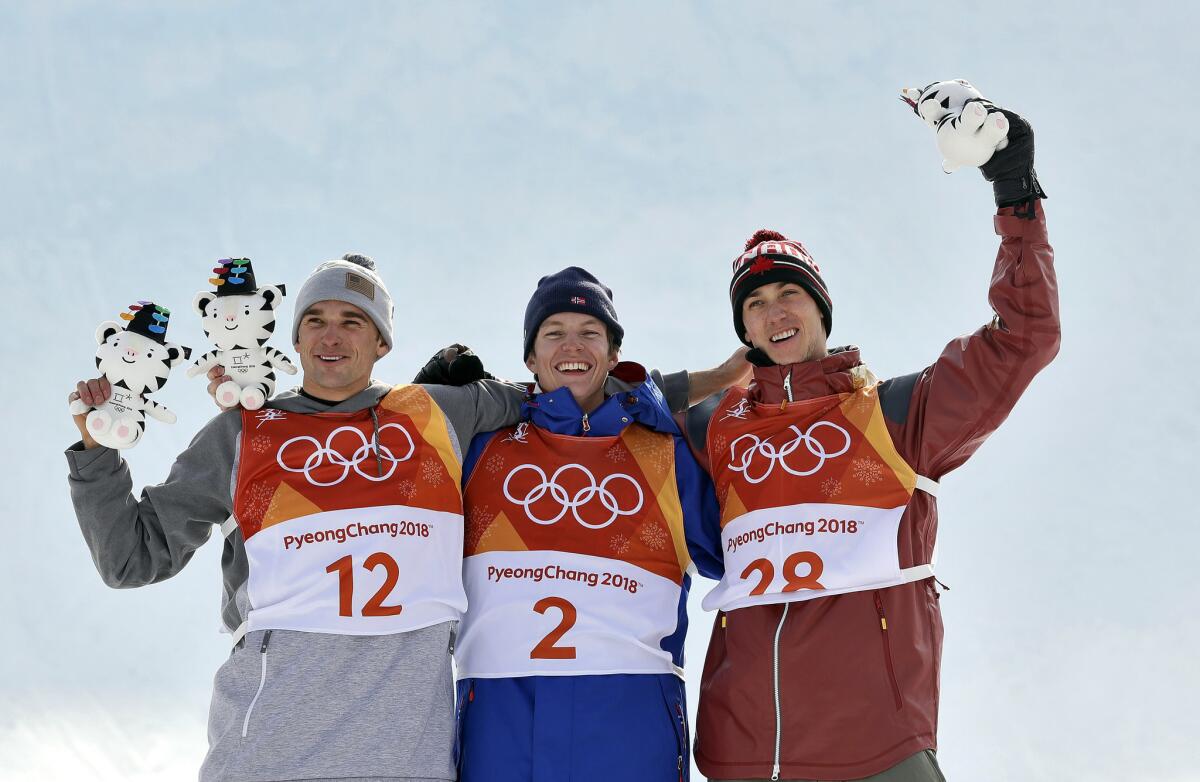
n the meantime, Kenworthy struggled. Coming into the competition, there had been some question about whether he might be distracted with all the media attention he had received since coming out as a gay athlete after Sochi.
“I’ve always been someone that’s had to compartmentalize my life because I was in the closet and I’ve always had fear of outing myself,” he said last week when asked about potential distractions. “I always had so much going on in my mind.”
Whatever the reason, he fell on his first two runs. Goepper fared only slightly better.
The Indiana native had faced some challenges of his own since 2014, dealing with what he described as mental health issues. He sounded upbeat in South Korea, saying: “I’m deeply in love with the sport and what it’s done for my life.”
Goepper put together a complete second run, but lingered in the middle of the pack. If anyone was going to knock off Braaten, it would have to be on the final try.
Woods came up short and Kenworthy couldn’t really mount a challenge, losing his balance at a key moment. As his score of 32.00 flashed across the jumbo screen, he shrugged and said, ‘It’s OK.”
The U.S. team finally enjoyed a bright spot as Goepper came through on his last attempt, sliding and spinning his way down the hill, throwing his arms in the air when he landed the final jump that would score 93.60
“I knew that caliber of run would put me up there in the top three,” he said.
It was the best the Americans could manage on this day.
- Share via
U.S. women’s team will employ a revolutionary strategy to beat Finland: ‘Score more goals’
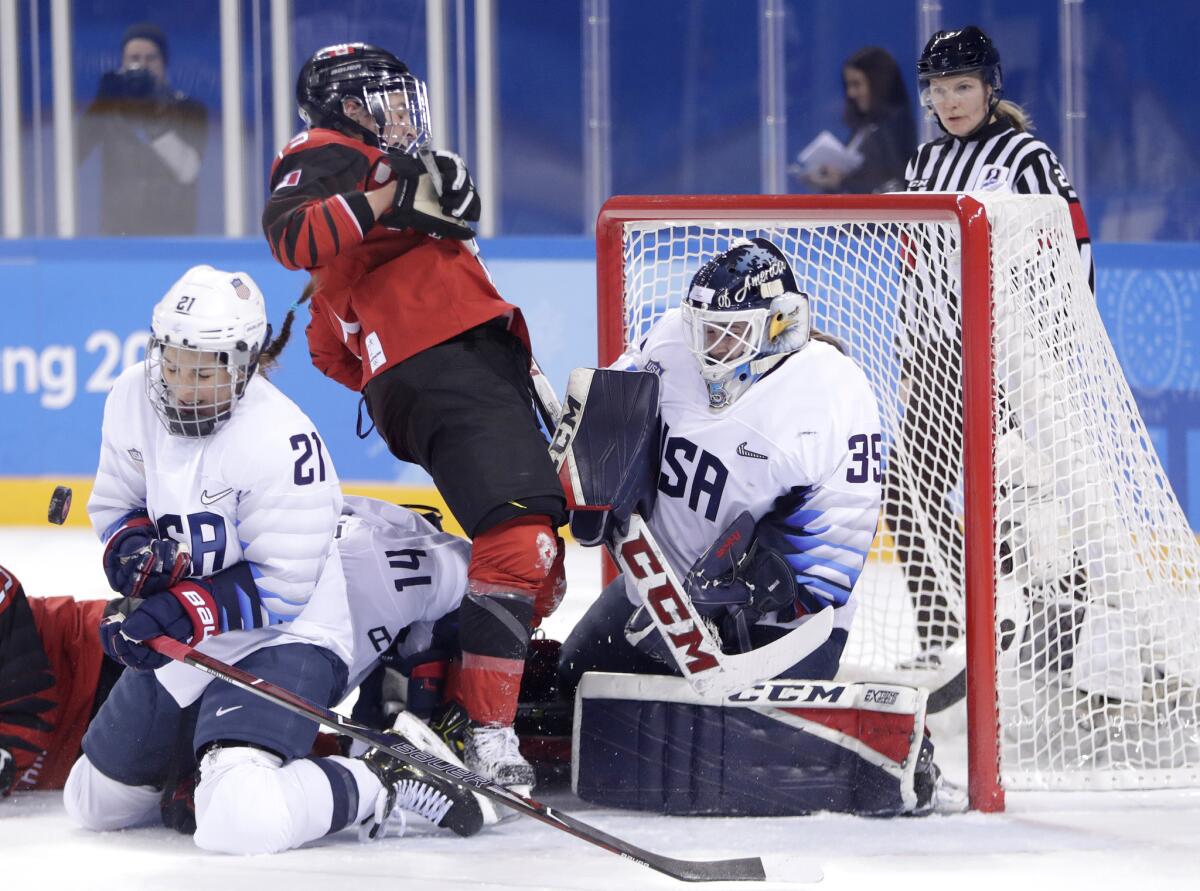
Don’t tell anyone, but here’s the revolutionary strategy the U.S. women’s hockey team has come up with in its quest to defeat Finland in the Olympic tournament semifinals on Monday and advance to the gold medal game.
“Score more goals than the other team,” forward Hilary Knight said Sunday. “It hasn’t changed.”
Getting the puck past Finland’s goaltender, University of Minnesota-trained Noora Raty, is never easy. When the teams met in the first round, the U.S. had to rally from a first-period 1-0 deficit and outshot Finland 42-24 but didn’t clinch its 3-1 victory until Dani Cameranesi scored into an empty net with 13 seconds left in the third period.
That was one of two victories the U.S. earned in its three preliminary-round games; it also lost to Canada, 2-1.
Canada will face the Olympic athletes from Russia in the other semifinal Monday night. The semifinal winners will play for gold Thursday. The U.S. won the first women’s hockey tournament in 1998 but hasn’t won since then and has lost to Canada in the last two gold-medal finals.
The U.S. women had their first practice on Sunday at Gangneung Hockey Centre and welcomed a chance to get accustomed to the boards and the ice. They focused on driving to the net, with an emphasis on creating chances for deflections and rebounds.
They’ve scored nine goals overall, with Jocelyne Lamoureux-Davidson and Kendall Coyne sharing the team lead with two each. Finland, which had one win and two losses in the first round, is led by Riikka Valila, a 44-year-old mother of three who scored twice in her team’s 7-2 rout of Sweden in the quarterfinals and has four goals overall.
“We haven’t been finishing, but I think it would be more frustrating if those opportunities weren’t there,” Knight said. “So just got to put the puck in the back of the net, and that’s what we’re going to try and do.
“It’s sort of a one-game tournament now. We need to win to advance to where we want to be. Can’t take Finland lightly. Every game is 50-50 going in, so just try to sway the odds in our favor during the time of play.”
Coach Robb Stauber has emphasized getting the puck to the net — and then into the net — during the last three or four practices. “Everything in tight, where the game’s won and lost,” he said. “It’s not too often you’re going to score from the point. If you get it through, you’re going to most likely score on a deflection or a redirect and some loose change. So most of those goals are going to come net-front.”
He estimated 80% of the team’s scoring chances have come within a 15-foot radius of the net. “We’ve hardly had any real clear looks, you know? That’s not a surprise, though, we’re not surprised by that,” he said. “We’ve spent the better parts of the practices doing exactly what we think is going to happen in the game. Seems like a decent plan, now we’ve got to execute and get the puck across the goal line.”
- Share via
Mikaela Shiffrin on slalom disappointment: ‘I don’t think I could have done it differently’
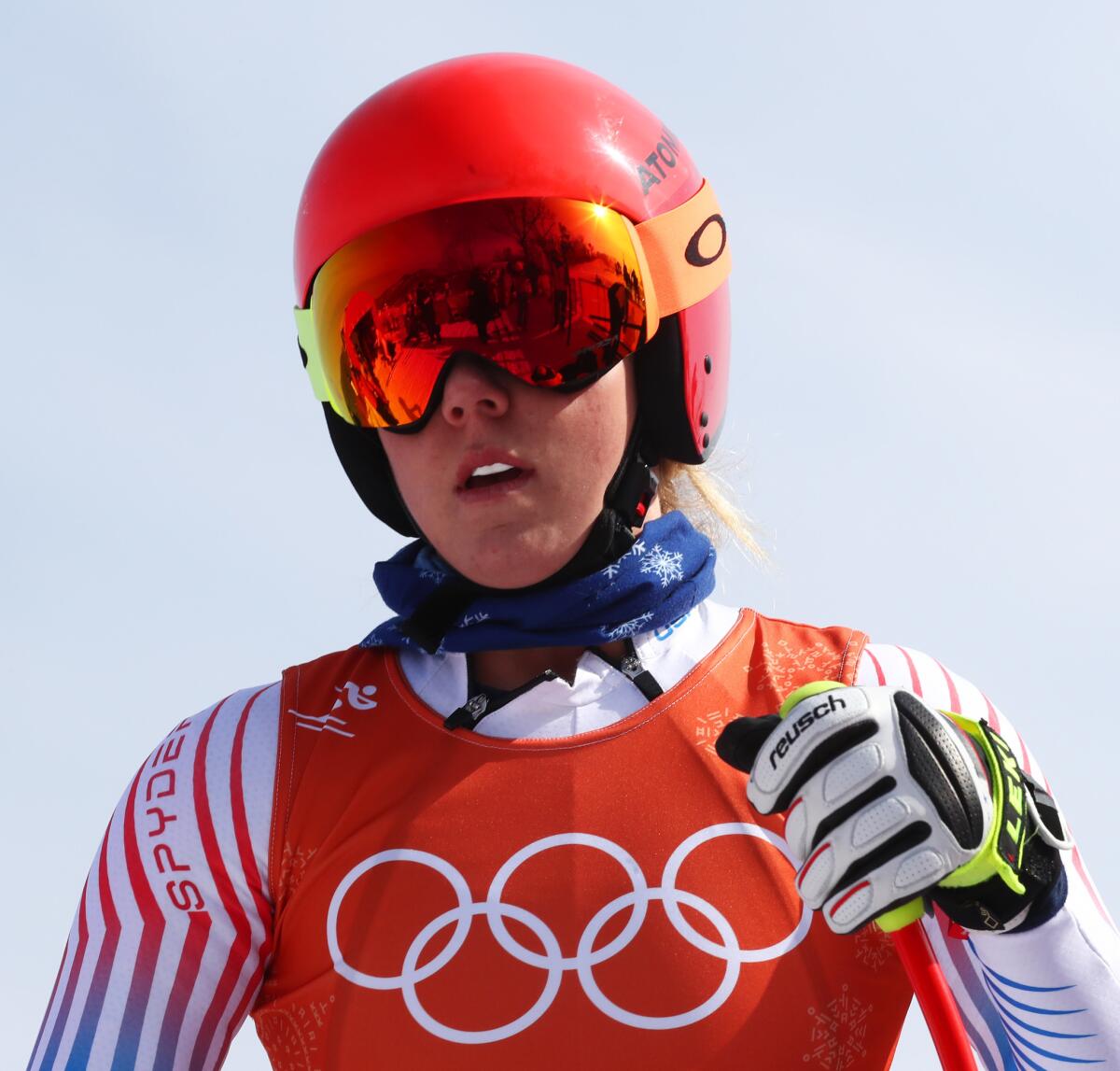
Less than 24 hours after Mikaela Shiffrin’s unexpected fourth-place finish in the slalom, the U.S. Alpine skiing star grappled with the disappointment in a 270-word post on Instagram.
“I’ve gone over it a thousand times in my head, and I don’t think I could have done it differently even if I got a second chance,” Shiffrin wrote Saturday. “So I wouldn’t take back my emotions or excitement after the [giant slalom] in order to have better shot at a [slalom] medal too. You know, it’s not necessarily the medalists who get the most out of the Olympics. It’s those who are willing to strip down to nothing and bear their soul for their love of the game. That is so much greater than Gold, Silver, or Bronze.”
Shiffrin, the top-ranked overall skier on the World Cup circuit this season, won the giant slalom in her first race at the Pyeongchang Games.
But she vomited before the start of the slalom Friday — she later attributed the upset stomach to nerves — and couldn’t medal in her best event.
“Some are going to leave here feeling like heroes, some will leave heartbroken, and some will have had moments when they felt both — because we care,” Shiffrin wrote. “That is real. That is life. It’s amazing and terrifying and wonderful and brutal and exciting and nerve racking and beautiful. And honestly, I’m just so grateful to be part of that.”
The 22-year-old remains a contender for medals in the downhill — training started Sunday — and combined events.
Another victory would make her the first U.S. Alpine skier of either gender to win three career gold medals at the Games.
- Share via
Lindsey Vonn assailed on Twitter after failing to medal in super-G at Pyeongchang Olympics
The backlash started minutes after Lindsey Vonn skidded to a stop past the finish line at the Jeongseon Alpine Center on Saturday and mouthed “I tried.”
The most successful women’s Alpine skier in history tied for sixth in the super-G at the Pyeongchang Olympics after a mistake during a turn late in her run.
Posts assailing Vonn and celebrating the unexpected result quickly flooded Twitter, most of them tied to comments she made about President Trump last year.
“Losers gonna lose.”
“Did God just give her a little nudge off course?”
“Hope you break a leg or two.”
“Happy to see a traitor of the USA defeated.”
Many of the tweets were profane, threatening or both. They cited karma; hoped she suffered an injury; wished she would lose again; used the #MAGA hashtag, short for Trump’s pledge to “Make America Great Again.”
What prompted such a vicious, gleeful response? During an interview with CNN in St. Moritz, Switzerland, in December, Vonn was asked how she would feel competing in the Olympics for a country led by Trump.
“I hope to represent the people of the United States, not the president,” Vonn answered. “I take the Olympics very seriously and what they mean and what they represent, what walking under our flag means in the opening ceremony. You know, I want to represent our country well, and I don’t think there are a lot of people currently in our government who do that.”
Would she accept an invitation to the White House if she won a gold medal?
“Absolutely not,” Vonn told CNN.
As the vitriol increased on Twitter in the hours after the race, some came to Vonn’s defense. They included Julie Foudy, the former soccer standout now covering the Winter Games for ESPN.
“I just spent last 20 min’s reading thru tweets directed” at Vonn, Foudy tweeted. “Sickened & disgusted once again by the lack of humanity that engulfs our country. She just raced her damn heart out & Trump supporters gloat/cheer/celebrate her inability to medal. Is this what we’ve become?”
Vonn seemed to take the social media storm in stride. After all, she waited eight years and fought through a series of injuries to return to the Olympics. Her 81 wins on the World Cup circuit are the most by any woman; she’s poised to break the all-time record of 86 for either gender. And her best event, the downhill, awaits Wednesday.
“It’s ok Julie,” Vonn tweeted in response. “Not everyone has to like me but my family loves me and I sleep well at night. I work hard and try to be the best person I can be. If they don’t like me their loss I guess... Thank you for the support.”
A few minutes later, she added: “Tomorrow is another day and another opportunity to become better. Goodnight.”
But the ugliness continued in the first response to her innocuous message.
“Time to hang it up.”
- Share via
Norovirus outbreak at Pyeongchang Olympics increases to 275 cases
Fourteen new cases of norovirus among staff and volunteers at the Pyeongchang Olympics were reported Saturday, the Korean Centers for Disease Control and Prevention said, raising the total to 275 people infected.
Of those diagnosed with the highly contagious illness, 53 remain quarantined while the rest have returned to work.
Most of the cases — 111 — have been at the Horeb Youth Center with the others in Pyeongchang (83) and Gangneung (81).
The outbreak has been traced to contaminated water used in food preparation at Youth Center.
- Share via
Saturday’s Winter Olympics TV schedule
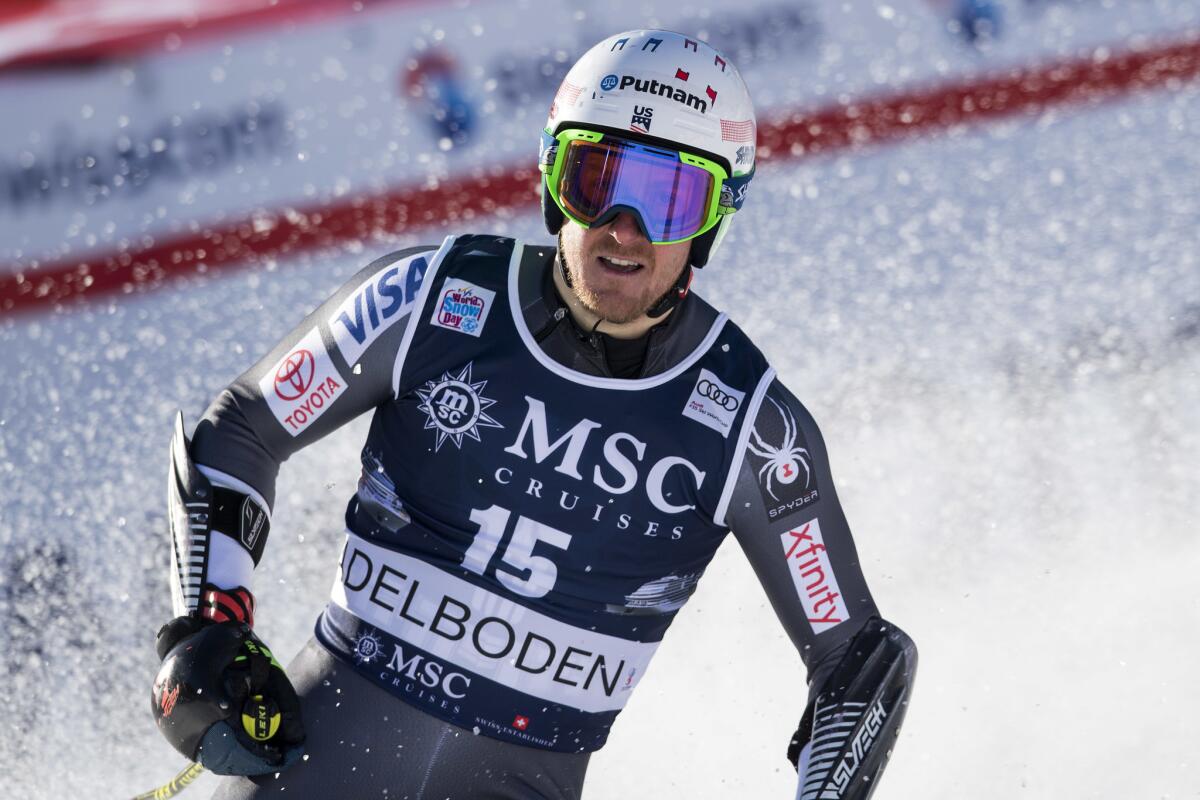
Saturday’s Winter Olympics TV schedule. All times Pacific.
6:30 a.m.: Freestyle skiing (men’s aerials qualifying). NBCSN
7:30 a.m.: Cross-country skiing (women’s 20-meter relay). NBCSN
8:30 a.m.: Biathlon (women’s 12.5-kilometer mass start). NBCSN
9:30 a.m.: Short-track speedskating (men’s 1,000 meters, women’s 1,500 meters). NBCSN
11:30 a.m.: Ski jumping (men’s individual large hill). NBCSN
Noon: Biathlon (women’s 12.5-kilometer mass start), freestyle skiing (men’s aerials qualifying), cross-country skiing (women’s 20-meter relay). NBC
12:30 p.m.: Hockey, teams TBD. NBCSN
2 p.m.: Curling (women, U.S. vs. Canada). CNBC
5 p.m.: Alpine skiing (men’s giant slalom), skeleton (women), ski jumping (men’s individual large hill final), short-track speedskating (men’s 1,000 meters, women’s 1,500 meters). NBC
5 p.m.: Freestyle skiing (men’s slopestyle qualifying). NBCSN
7:10 p.m.: Men’s hockey (Germany vs. Norway). NBCSN.
8:30 p.m.: Alpine Skiing (men’s giant slalom, final run). Freestyle skiing (men’s slopestyle qualifying). NBC
9:30 p.m.: Curling (men, U.S. vs. Japan). NBCSN
11 p.m.: Repeat of 5 p.m. broadcast. NBC.
11:40 p.m.: Men’s hockey (Czech Republic vs. Switzerland). NBCSN
2 a.m. (Sunday morning): Repeat of 5 p.m. broadcast. NBC
2 a.m. (Sunday morning): Curling (women, Canada vs. Switzerland). NBCSN
4 a.m. (Sunday morning): Men’s hockey (Canada vs. South Korea). USA
4:10 a.m. (Sunday morning): Men’s hockey (Sweden vs. Finland). NBCSN
- Share via
Lindsey Vonn ties for sixth in super-G at Winter Olympics
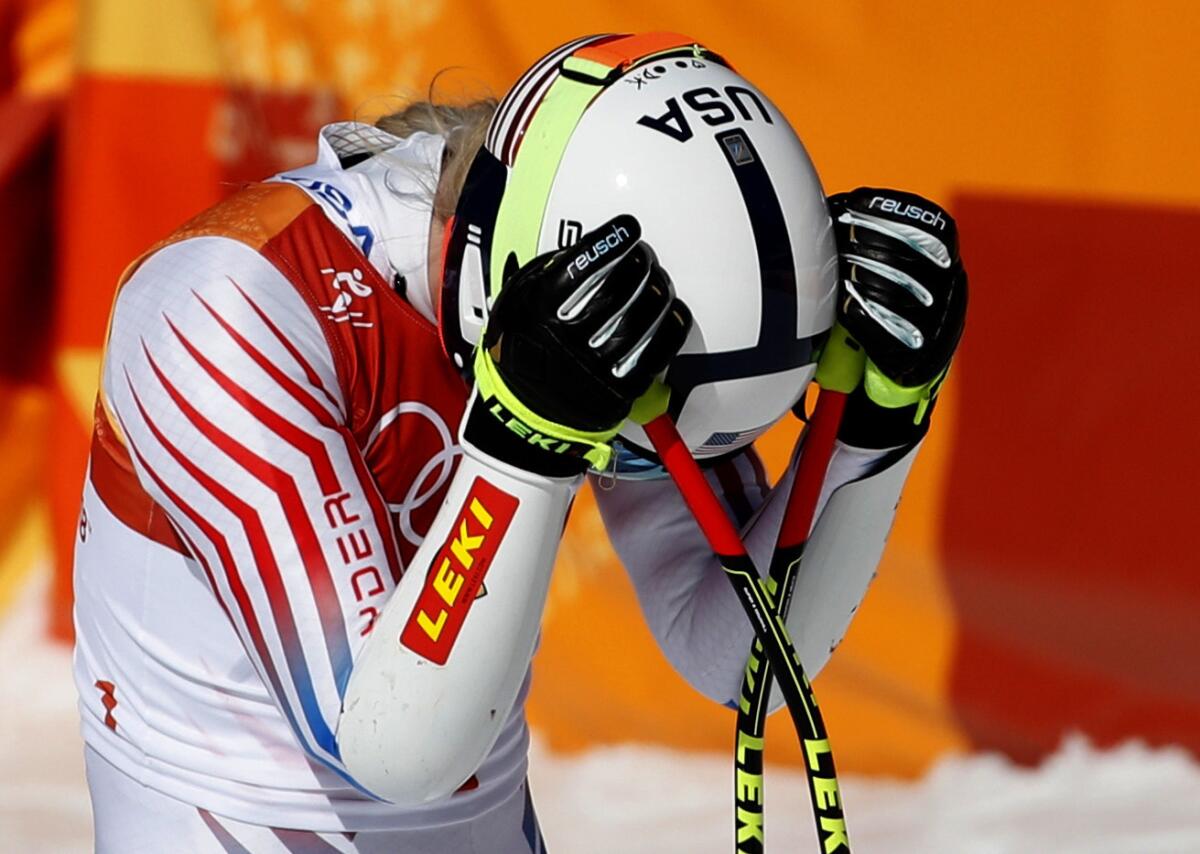
After an eight-year absence from the Olympics, Lindsey Vonn’s return ended in disappointment Saturday.
Vonn, one of the most successful Alpine skiers in history, finished tied for sixth in the super-G at the Pyeongchang Olympics.
“It didn’t quite turn out the way I hoped,” she said.
High winds delayed the race at the Jeongseon Alpine Center for an hour. Vonn started first, but went too wide on a turn near the end of the run in a mistake that likely kept her off the podium.
Vonn will compete in the downhill, her best event, Wednesday.
Ester Ledecka of the Czech Republic claimed the gold medal with a stunning run to finish on the podium for the first time in her career.
- Share via
Defending gold medalist Ted Ligety 20th after first run in giant slalom
Defending champion Ted Ligety is in 20th place after the first giant slalom session Sunday at the Yongpyong Alpine Center.
The disappointing run essentially ended medal hopes in the event for Ligety, whose former prowess earned him the nickname “Mr. GS.”
Ligety trails Austria’s Marcel Hirscher, the giant slalom leader, by 2.44 seconds.
“I just didn’t attack the way I should’ve or could’ve,” said Ligety, a four-time Olympian. “No explanation for that.”
Twenty-four of the 110 competitors either crashed or were disqualified during the first session.
The second runs are scheduled for later Sunday.
- Share via
Lindsey Vonn will not medal in the super-G event
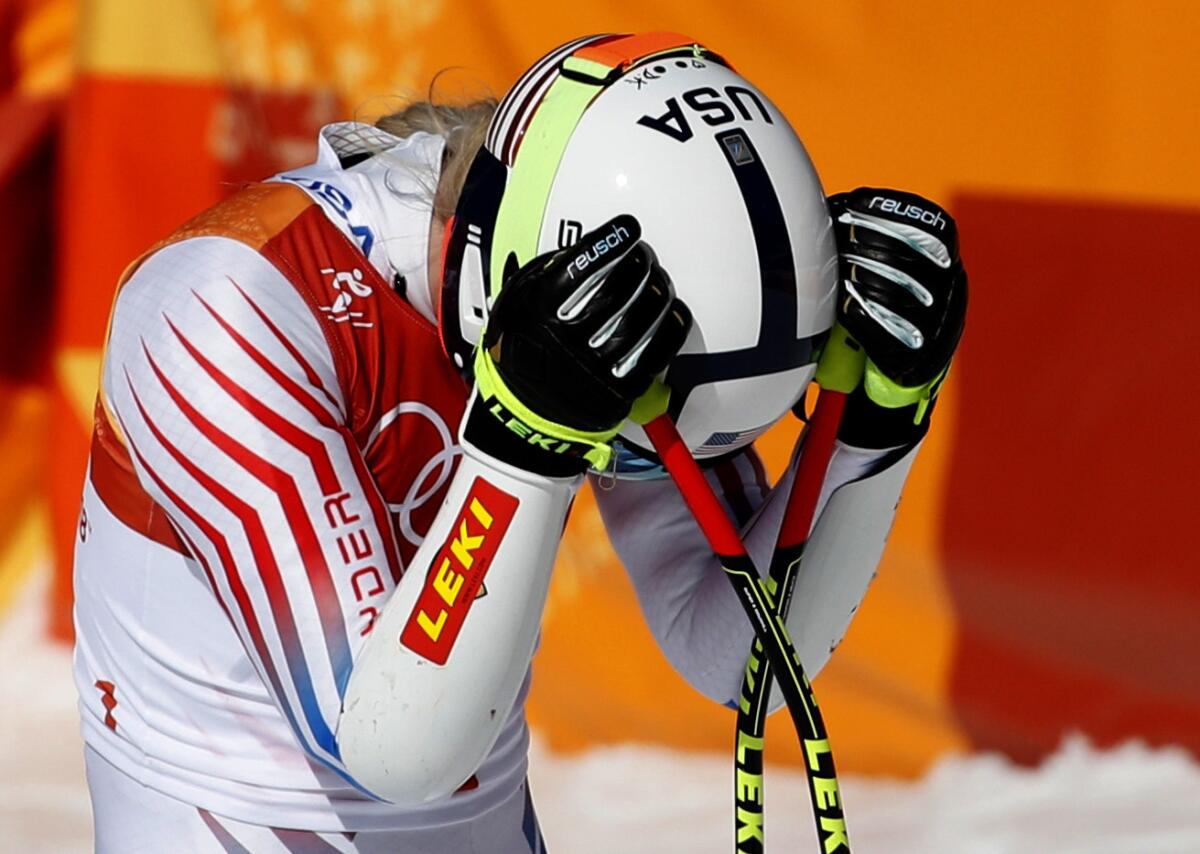
There will be no medal for American skier Lindsey Vonn in the Olympic super-G at the Pyeongchang Games.
She had a fast run going before a mistake near the bottom cost her valuable time. Tina Weirather of Liechtenstein leads after the opening eight racers.
Vonn will have another chance in the downhill.
At age 33, she is trying to become the oldest woman to win an Olympic Alpine skiing medal.
She won bronze in the super-G at the 2010 Vancouver Games — to go with her downhill gold — but missed the 2014 Sochi Olympics after surgery on her right knee.
- Share via
Hanyu wins gold again, Nathan Chen finishes fifth, Vincent Zhou sixth, Adam Rippon tenth
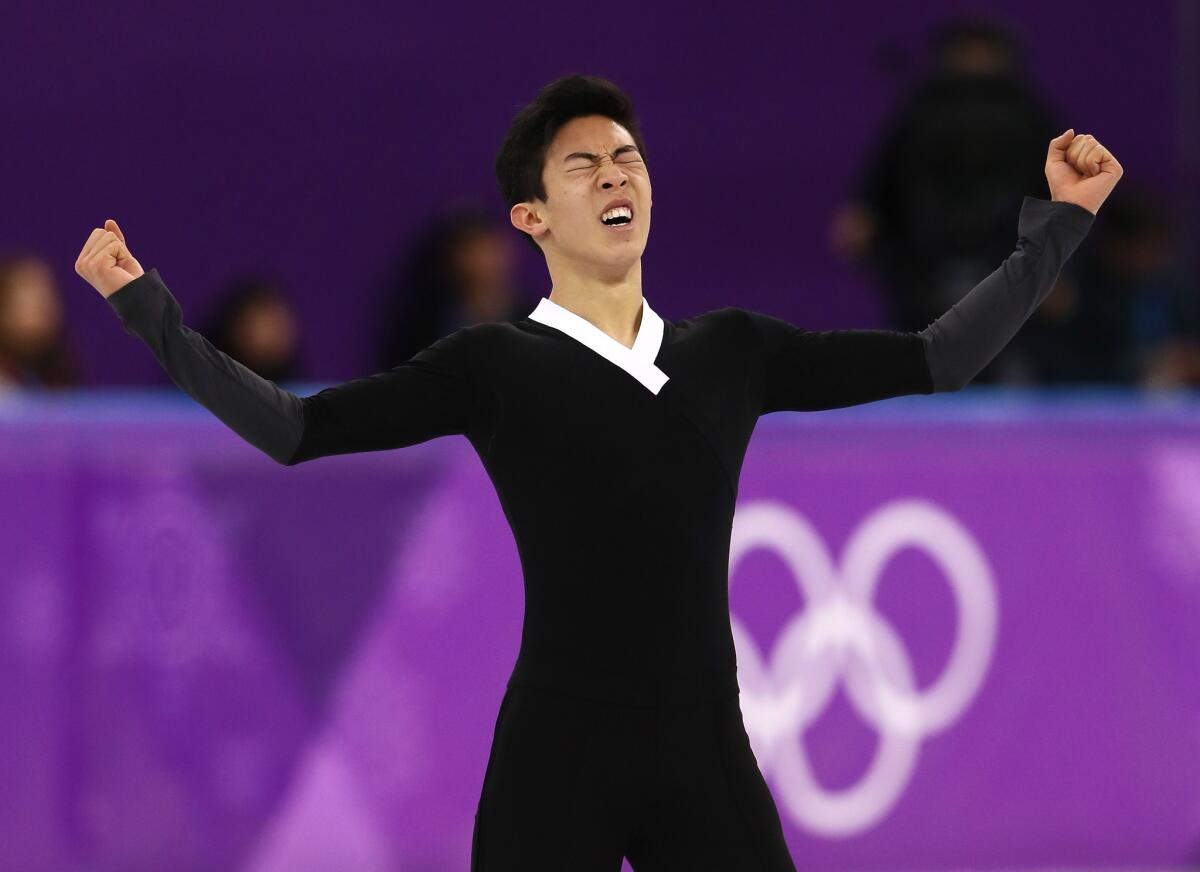
Japan’s Yuzuru Hanyu has become the first man to successfully defend his Olympic figure skating title since Dick Button in 1952. He held off countryman Shoma Uno, who won silver, and Spain’s Javier Fernandez, who took bronze, in Saturday’s free skate in Pyeongchang.
Fernandez and Hanyu share the same coach, Brian Orser.
American Nathan Chen surged from a fiasco of a short program, where he was 17th. He won the free skate to wind up fifth overall.
- Share via
Norovirus cases at Winter Olympics rise to 261; two Swiss skiers infected
The norovirus outbreak among staff and volunteers at the Pyeongchang Olympics isn’t going away.
Seventeen new cases were diagnosed Friday, according to the Korean Centers for Disease Control and Prevention. That brings the Games-long total to 261 staff members and volunteers who have contracted the highly contagious illness.
Two freestyle skiers from Switzerland have also come down with the illness, the first athletes at the Games known to have been diagnosed.
Though few details about the skiers have been made public, they were not staying in the Olympic Village.
“Particularly in winter sports, these things do happen,” International Olympic Committee spokesman Mark Adams said.
The broader outbreak has been traced to contaminated water used in food preparation at the Horeb Youth Center, the epicenter of the illness.
Forty-four staff members and volunteers remain quarantined.
- Share via
The story behind Yuzuru Hanyu and all those Pooh bears
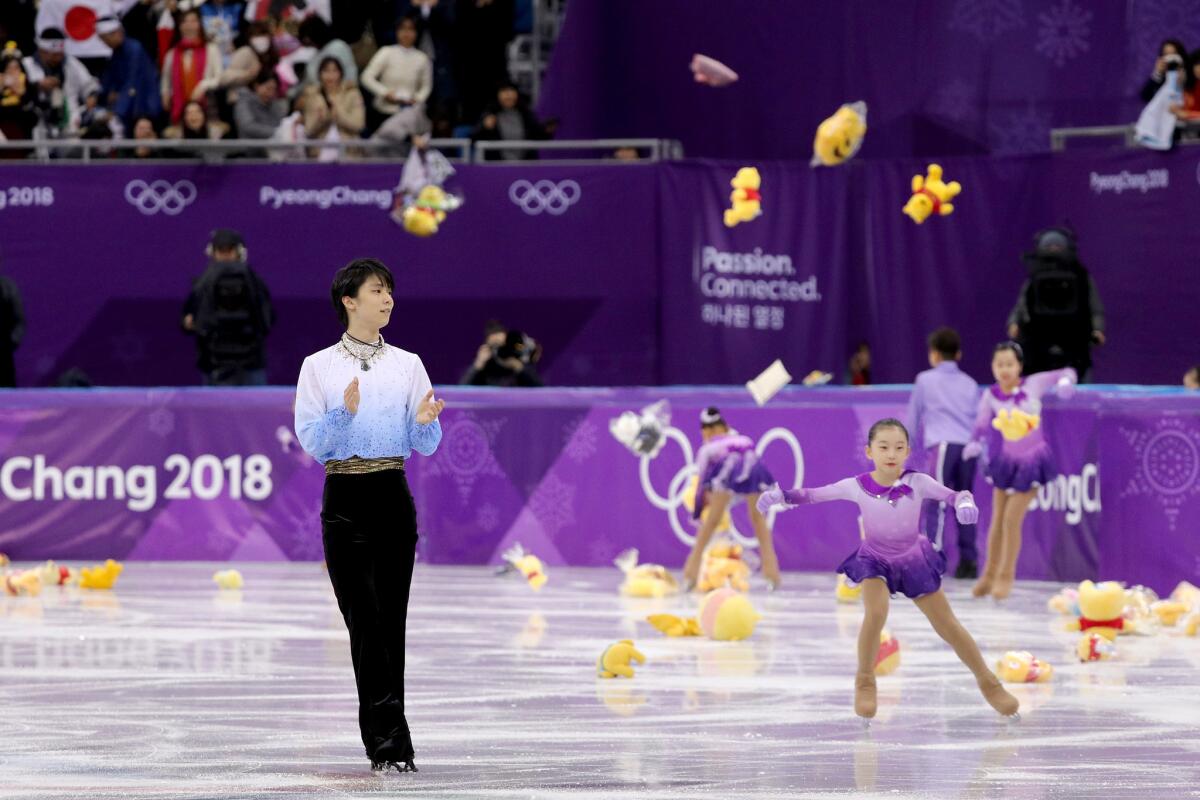
As enthralling as Yuzuru Hanyu’s short program was at the Pyeongchang Games, something almost just as mesmerizing happened after the Japanese figure skater’s routine.
The shower of Winnie the Pooh dolls raining down on the ice.
It was quite a sight to behold, but actually nothing unusual for the aftermath of a performance by the 23-year-old skater.
But why all the Pooh bears?
In 2010, Hanyu started bringing a tissue box covered with the cuddly character with him to competitions and news conferences. Kind of a good luck charm.
Since then, the whole thing has taken on a life of its own with the fans.
“I’ve skated after Yuzu actually a handful of times,” U.S. skater Nathan Chen said Thursday before the short program. “The only thing I can take away from it is, be prepared for the Pooh bears to rain down.”
And along the way, Hanyu won two world championships and a gold medal at the 2014 Sochi Olympics, so he’s not likely to ask anyone to stop throwing the plush toys.
“I know that Yuzuru is very, very superstitious, and I believe it’s part of the superstition,” Hanyu’s coach, Brian Orser, said in 2014.
According to NBC Sports, at least 10 sweepers were required to remove all the Pooh bears off the ice after Hanyu’s routine at the 2015 world championships. And it looked like close to twice that number of children on skates were out there Thursday night gathering all the stuffed toys, which Hanyu usually donates to local charities.
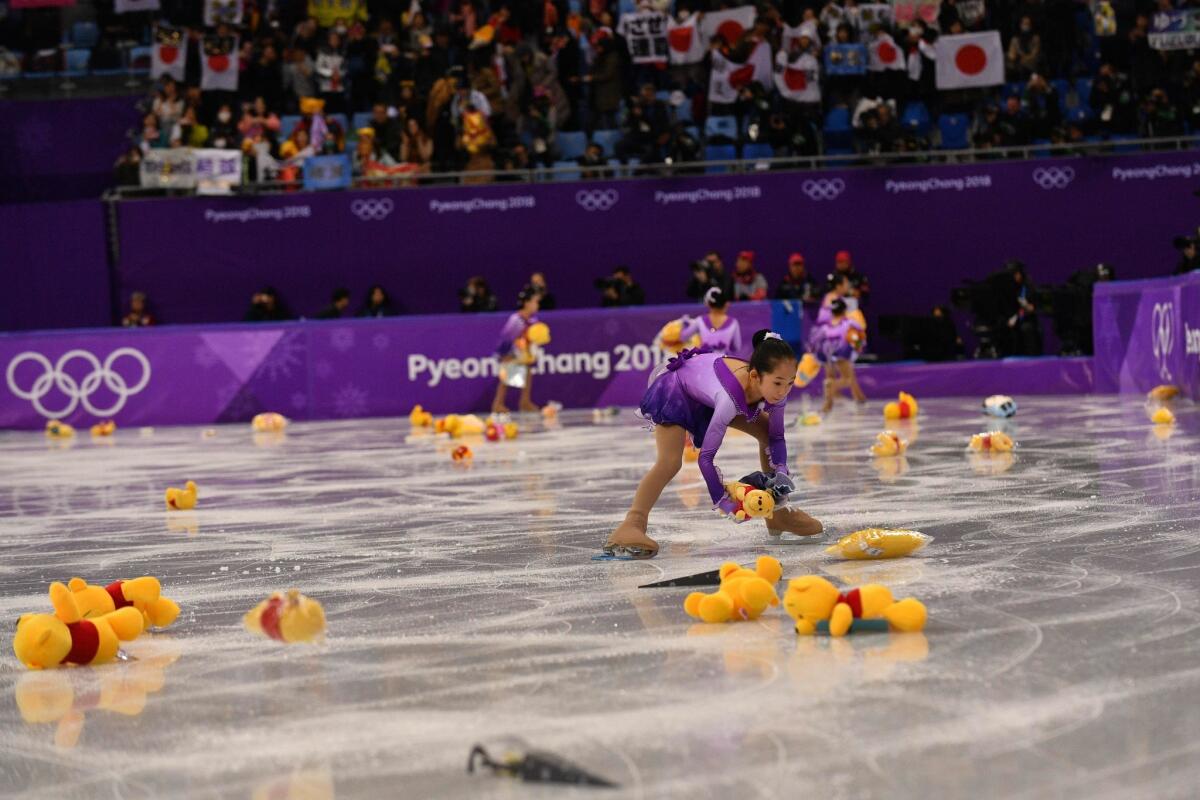
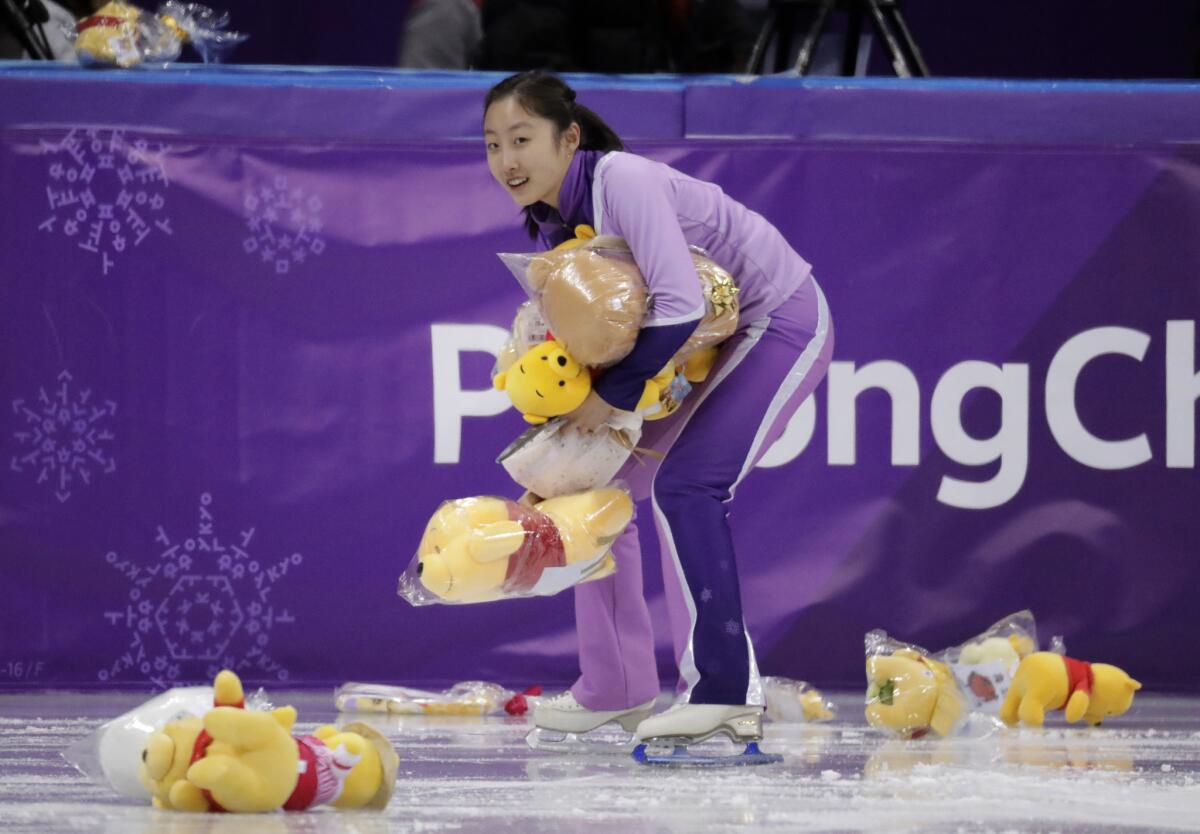
“You go backstage and there are bags and bags and bags,” Orser said in 2016.
Hanyu earned a 111.68 in the short program and leads the field going into Saturday’s free skate finale. Another performance like Thursday’s and he could walk away with another gold medal — and a lot more Pooh.
- Share via
German speed skater Claudia Pechstein, 45, is ready to race toward another Winter Olympics
Despite missing out on a chance to become the oldest woman to win a gold medal at the Winter Games, seven-time Olympian Claudia Pechstein of Germany isn’t yet ready to hang up her speedskates.
Pechstein, who was six days short of her 46th birthday on Friday when she faded and finished a distant eighth in the women’s 5,000-meter race with a time of 7:05.43 , said she intends to continue competing through the 2022 Beijing Games. “Why not?” she said, laughing.
Why not, indeed. Pechstein, who has won five gold medals, two silvers and two bronzes and set the Olympic record in the 5,000 since 2002, said she had been training well before Friday’s 12 1/2-lap race. In addition, she has had success on the Gangneung Oval, having won a silver medal here last year in a World Cup 5,000-meter race to become the oldest women’s speedskater to win a World Cup medal.
“The lap times up to six, seven laps were OK. I don’t know why, now, it’s not possible to make much more pressure,” said Pechstein, who missed the 2010 Winter Games while serving a two-year ban for irregularities in her blood profile, a ban she has continued to fight to get overturned. “Normally in training I have no problems. I can go 10, 15 laps with really good lap times. I don’t know why now. But the next chance is in four years to get the medal at the Olympics.”
The winner on Friday was Esmee Visser of the Netherlands, who was 4 years old when Pechstein won her first medal at the 1992 Albertville Games. Visser’s winning time was 6 minutes, 50.23 seconds, allowing her to end the two-Olympics winning streak of Martina Sablikova of the Czech Republic. Sablikova was second in 6:51.85, with Natalia Voronina of the Olympic Athletes from Russia third in 6:53.98. Visser, 22 years and 20 days old, is the second-youngest winner of this event; Pechstein was the youngest, three days past her 22nd birthday, when she triumphed at Lillehammer in 1994.
The lone American entrant, Carlijn Schoutens, was 11th with a time of 7:13.28.
Pechstein, who finished ninth in the 3,000 last Saturday, was asked if she ever feels her age. She seemed to think it was a ridiculous question.
“No, no, no, no. Not yet,” she said. “I don’t think about my age. You?”
Many of the rest of us do, though.
- Share via
Friday’s Winter Olympics TV schedule
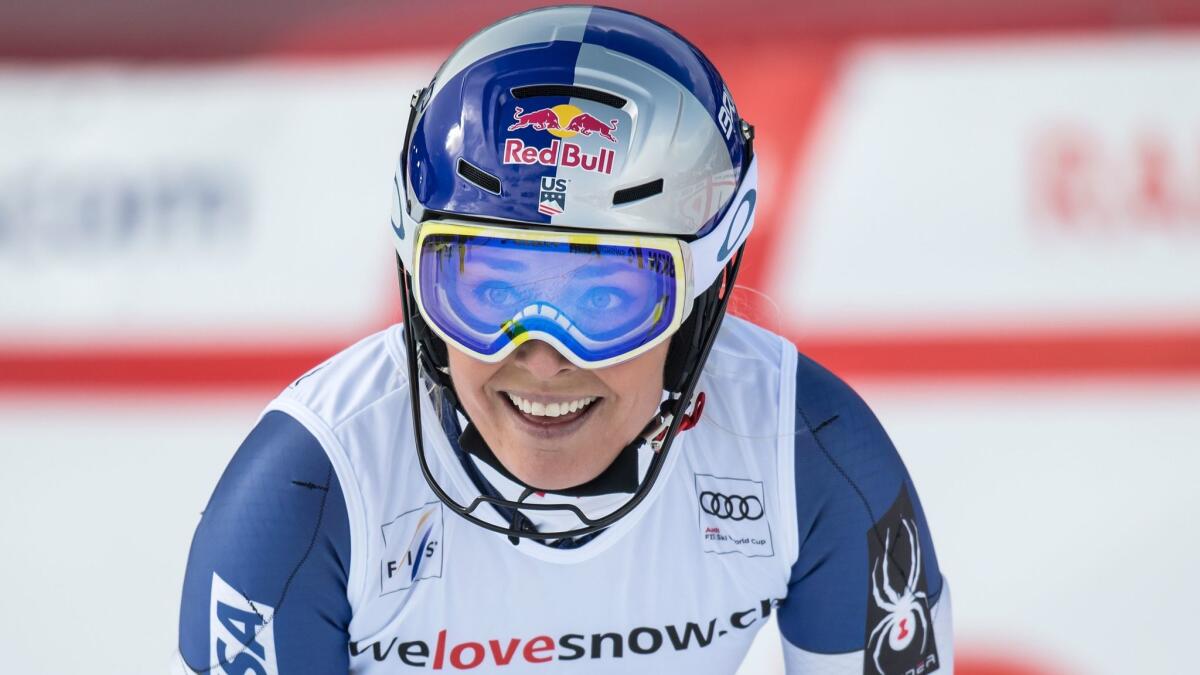
Friday’s Winter Olympics TV schedule. All times Pacific.
6:30 a.m.: Skeleton (women, runs 1 and 2). NBCSN
7:45 a.m.: Speedskating (women’s 5,000 meters), Ski jumping (men’s individual large hill qualifying). NBCSN
10:15 a.m.: Medal ceremonies from various events. NBCSN
11 a.m.: Curling (women, South Korea vs. Switzerland). NBCSN
Noon: Speedskating (women’s 5,000 meters), Cross-country skiing (men’s 15-kilometer freestyle), Ski jumping (men’s individual large hill qualifying). NBC.
2 p.m. Hockey, teams TBD. NBCSN
2 p.m.: Curling (men, U.S. vs. Denmark). CNBC
5 p.m.: Figure skating (men’s free skate), Alpine skiing (women’s super-G), Freestyle skiing (women’s aerials), Skeleton (women, runs 1 and 2). NBC
5 p.m.: Figure skating (men’s free skate, early groups). NBCSN.
7 p.m.: Women’s Hockey (quarterfinals, TBD). CNBC
7:10 p.m.: Men’s hockey (Canada vs, Czech Republic). NBCSN
9:30 p.m.: Curling (women, U.S. vs. Olympic Athletes from Russian). NBCSN
9:35 p.m.: Freestyle skiing (women’s slopestyle), Figure skating (men’s free skate). NBC.
11:30 p.m.: Women’s hockey (quarterfinals, TBD). USA
11:35 p.m.: Repeat of 5 p.m. broadcast. NBC
11:40 p.m.: Men’s hockey (Switzerland vs. South Korea). NBCSN
2 a.m. (Saturday morning): Curling (men, Canada vs. Sweden). NBCSN
2 a.m. (Saturday morning): Curling (men, Switzerland vs. Norway). USA
3:35 a.m. (Saturday morning): Repeat of 5 p.m. broadcast. NBC
4:10 a.m. (Saturday morning): Men’s hockey (U.S. vs. Olympics Athletes from Russia). NBCSN.
4:10 a.m.: (Saturday morning): Men’s hockey (Slovenia vs. Slovakia). USA.
- Share via
Ryan Donato helps the U.S. take a key step forward in win over Slovakia
There wasn’t anything too fancy or technical about what the U.S. men’s hockey team needed to do Friday afternoon.
After a disappointing overtime loss to start the 2018 Winter Olympics, the Americans knew they had to give a full 60 minutes’ effort against Slovakia.
“We just continued to keep our foot on the gas,” forward Jordan Greenway said. “We didn’t let up in the third period.”
That meant chasing down loose pucks and working their way to the front of the net. It meant playing defense and killing a crucial penalty.
- Share via
Mikaela Shiffrin suffers stomach problems and then fails to medal in slalom
The brown smudge in the snow lay amid a tangle of orange safety netting at the top of the Yongpyong Alpine Center’s slalom course.
Minutes before Mikaela Shiffrin’s first run Friday in her best event, one where a gold medal seemed to be a foregone conclusion, the U.S. Alpine skiing sensation vomited.
The pre-race upset stomach would be the first of many things that didn’t go as planned for Shiffrin, a day after her long-awaited debut at the Pyeongchang Olympics ended with a gold medal in the giant slalom.
- Share via
Yuzuru Hanyu wins men’s short program with a magical routine
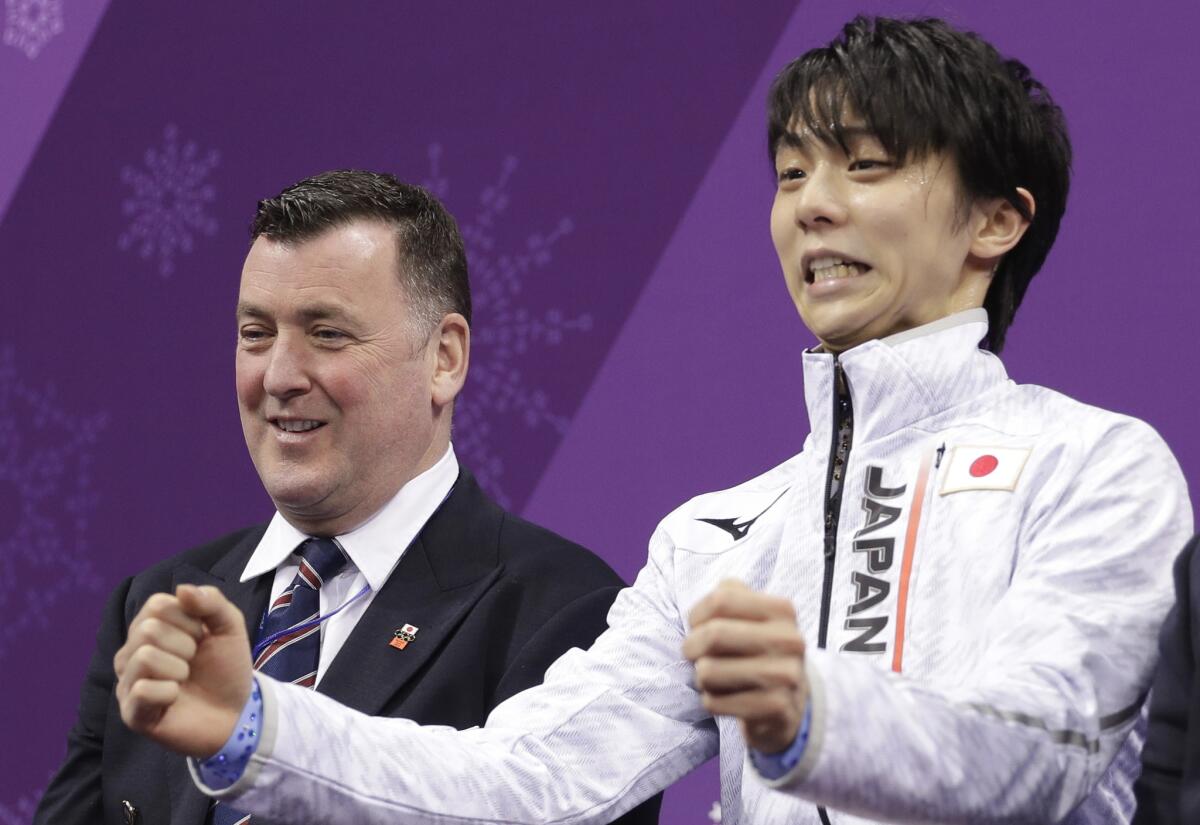
What bad ankle?
Japan’s Yuzuru Hanyu put to rest any doubts about his injured ankle with an amazing performance in men’s figure skating short program from the Gangneung Ice Arena.
Hanyu, skating first in the final group of skaters, set an Olympic record with a dazzling performance that earned a 111.68 from the judges.
His main rival, Spain’s Javier Fernandez, didn’t let Hanyu open too comfortable of a lead though, with a strong skate that the judges gave 107.58 points.
Japan’s Shoma Uno finished third with 104.17 points.
The top American favorite Nathan Chen faltered badly in the short program and will the free skate in 17th place after a routine that featured multiple falls.
American Adam Rippon continued his great skating run and enters tomorrow’s free skate in 7th place with an outside shot at the podium.
- Share via
Mikaela Shiffrin finishes fourth in slalom at Pyeongchang Olympics
Mikaela Shiffrin is human after all.
The U.S. Alpine skiing sensation failed to medal her best event Friday, finishing fourth in the slalom at the Pyeongchang Olympics.
A day after opening her Games with a gold medal in the giant slalom at the Yongpyong Alpine Center, Shiffrin entered the slalom as the heavy favorite. She won the event four years ago in Sochi at age 18, becoming the youngest Olympic slalom medalist in history, and is the world’s top-ranked competitor in the event.
The gold medal seemed to be a foregone conclusion as the 22-year-old Shiffrin chased history at these Games.
Instead, Sweden’s Frida Hansdotter won the gold, Switzerland’s Wendy Holdener won silver and Austria’s Katharina Gallhuber captured bronze.
Minutes before her first run, Shiffrin vomited on the snow near a tangle of orange safety netting.
“It was kind of sudden. It almost felt like a virus kind of puking, less about nerves,” Shiffrin said between races.
She didn’t look like her usual self, finishing the first run almost a half-second behind leader Holdener in 49.37 seconds.
Shiffrin’s didn’t fare better in the second run, as her time increased to 49.66 seconds.
She is trying to become the first female U.S. Alpine skier to win three medals in one Olympics and the first U.S. Alpine skier of either gender with three career gold medals.
After winning the giant slalom Thursday, Shiffrin kept a conservative schedule. She took a nap, had dinner, then accepted her gold medal from Liechtenstein’s Princess Nora during a ceremony at the Pyeongchang Medals Plaza.
Shiffrin skipped the usual commitments for U.S. gold medalists -- sitting down for a one-on-one interview with NBC, celebrating at the U.S. house, a follow-up news conference at the Main Press Center -- because of her ambitious program that still includes the downhill and combined.
Still, the medal ceremony kept her up until about 10 p.m. rather than going to bed at 8:30 p.m. as usual.
“It certainly was not normal preparation, but I knew going into these Olympics it’s not normal races and not normal preparation,” Shiffrin said.
And it didn’t lead to a normal result.
- Share via
Adam Rippon says he’s a ‘hot mess’
If you knew me you would know that I’m a hot mess, and there’s nothing more distracting than being me
— Adam Rippon, after the men’s short program on Thursday night
- Share via
Men’s figure skating live: Japan’s Yuzuru Hanyu jumps into first with historic skate

What bad ankle?
Japan’s Yukuru Hanyu put to rest any doubts about his injured ankle with an amazing performance in men’s figure skating short program from the Gangneung Ice Arena.
Hanyu, skating first in the final group of skaters, set an Olympic record with a dazzling performance which earned a 111.68 from the judges.
His main rival, Spain’s Javier Fernandez didn’t let Hanyu open too comfortable of a lead thought, with a strong skate that the judges gave 107.58 points.
Japan’s Shoma Uno finished third with 104.17 points.
The top American favorite Nathan Chen faltered badly in the short program and will the free skate in 17th place after a routine that featured multiple falls.
American Adam Rippon continued his great skating run and enters tomorrow’s free skate in 7th place with an outside shot at the podium.
- Share via
Gus Kenworthy takes a jab at Vice President Mike Pence

Call it a good news-bad news scenario for Gus Kenworthy.
The outspoken freestyle skier broke his thumb in training on Thursday.
He tweeted out a picture of his X-ray, along with one of his freshly casted hand and included this quip: “It won’t stop me from competing (obvi) but it does prevent me from shaking Pence’s hand so Silver linings!”
Kenworthy, who came out as gay about two years after his silver medal win at the Sochi Games, has been openly critical of President Trump and Vice President Mike Pence, who was in South Korea for the start of the games.
Kenworthy has previously said he would not go to the White House as part of the traditional visit the U.S. Olympic team makes after the Olympics.
- Share via
Mikaela Shiffrin in fourth place after first slalom run at Pyeongchang Olympics
Mikaela Shiffrin entered Friday’s slalom competition at the Pyeongchang Olympics as the heavy favorite, the defending gold medalist and the world’s top-ranked skier in the event.
But the slalom is off to an uncharacteristic start for the 22-year-old.
A day after winning gold in the giant slalom, Shiffrin is 0.48 seconds off the lead and in fourth place after her first run through the slalom course at the Yongpyong Alpine Center.
She vomited just before starting.
“It was kind of sudden. It almost felt like a virus kind of puking, less about nerves,” Shiffrin said. “It’s nice to have that first run out of the way. Nothing was tricky, you just have to move quickly like always.”
Switzerland’s Wendy Holdener had the fastest time during the first run, completing the course in 48.89 seconds.
Shiffrin stuck to a conservative schedule after Thursday’s victory. She took a nap, had dinner, accepted her gold medal from Liechtenstein’s Princess Nora at the Pyeongchang Medals Plaza, then turned in for the night.
Shiffrin skipped the usual commitments for U.S. gold medalists -- sitting down for a one-on-one interview with NBC, visiting the U.S. house, the follow-up news conference -- because of her ambitious program that includes the downhill and combined.
- Share via
Austrian Markus Schairer heading home after breaking his neck in snowboardcross event
Markus Schairer of Austria is heading home for treatment after breaking his neck in a frightening crash during the Olympic men’s snowboardcross quarterfinals.
Schairer, 30, lost control in the air on the final jump of the treacherous downhill course on Thursday. He slammed into the snow on his back, sending his goggles flying. He was able to get to his feet before being taken for a medical exam.
The Austrian Olympic Committee says Schairer fractured the fifth vertebrae in his neck. It says there is no indication the 30-year-old Schairer experienced any neurological impairment or long-term damage.
- Share via
Norovirus outbreak at Pyeongchang Olympics increases to 244 cases
The norovirus outbreak among staff and volunteers at the Pyeongchang Olympics has increased to 244 cases, the Korean Centers for Disease Control said Thursday.
Investigators traced the outbreak to contaminated water used in food preparation at the Horeb Youth Center.
Fifty-six people remain under quarantine. The rest have returned to work.
The Horeb Youth Center had 108 cases with an additional 77 cases in the coastal city of Gangneung and 59 cases in the mountain cluster around Pyeongchang.
- Share via
Radio personality fired after making vulgar comments about 17-year-old Olympian Chloe Kim
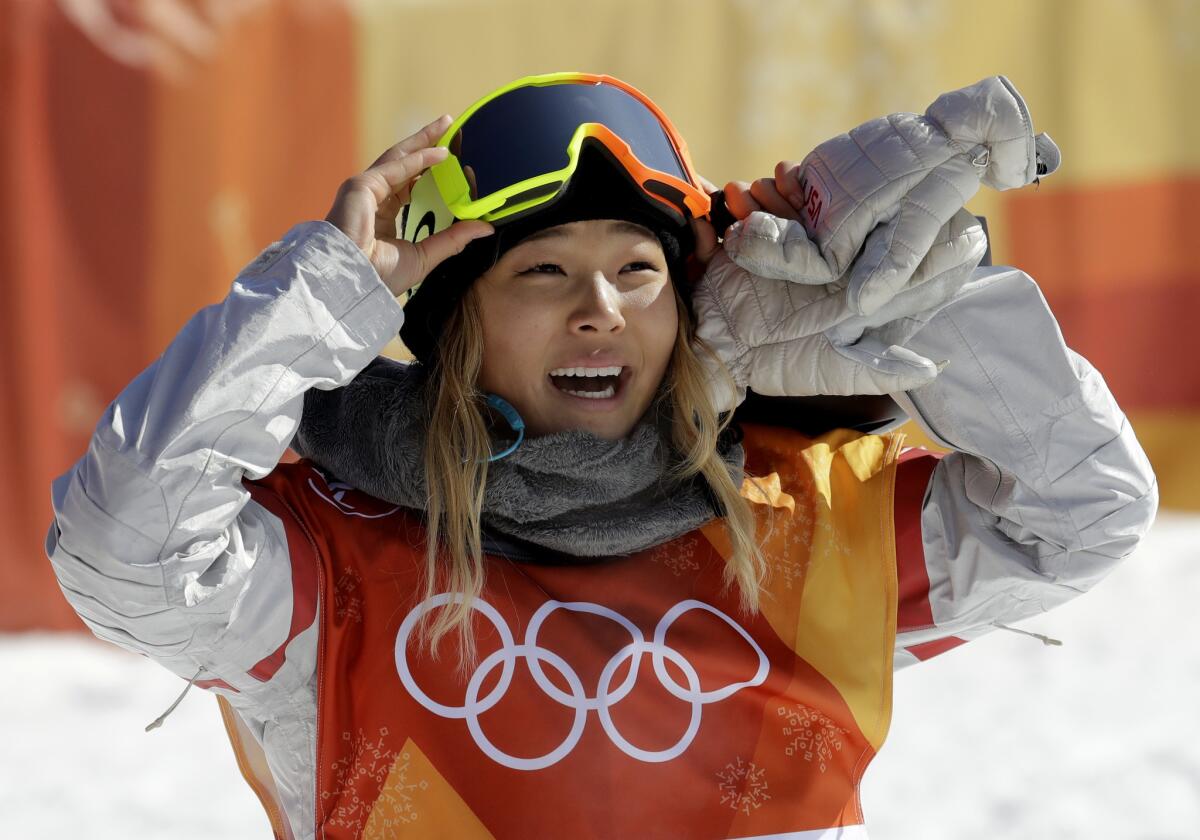
Radio host Patrick Connor was fired from a San Francisco area station after he made inappropriate comments about 17-year-old Olympic snowboarder Chloe Kim on a Barstool Radio SiriusXM show.
Connor hosted a show called “The Shower Hour with P-Con” weekday mornings on KNBR. He also is a co-host of the new Barstool Radio show “Dialed-In with Dallas Braden.”
Kim, a 5-foot-3 Southern California snowboarder whose parents are Korean immigrants, won the gold medal in halfpipe on Monday. In doing so, she became the first woman in Olympic history to land consecutive 1080s — two triple rotations.
On Wednesday’s broadcast of “Dialed-In,” Connor took a discussion about Kim’s accomplishments in a vulgar direction.
“Her 18th birthday is April 23, and the countdown is on, baby,” Connor said.
Connor continued: “She’s fine as hell! If she was 18, you wouldn’t be ashamed to say that she’s a little hot piece of … . And she is. She is adorable. I’m a huge Chloe Kim fan.”
Connor later apologized on Twitter.
KNBR program director Jeremiah Crowe stated Wednesday: “Be advised that Patrick Connor is no longer with Cumulus Media. Neither KNBR, nor Cumulus Media condone the comments made by Patrick Connor on his SiriusXM program.”
Connor is still a part of the Barstool Radio show, although he was told by Braden on-air Wednesday that he will be off the show if he does not behave appropriately. “That is not who we are,” Braden said of Connor’s comments. “That is not where this show comes from.”
- Share via
NBC’s Bode Miller apologizes for suggesting a skier’s marriage has negatively affected her performance
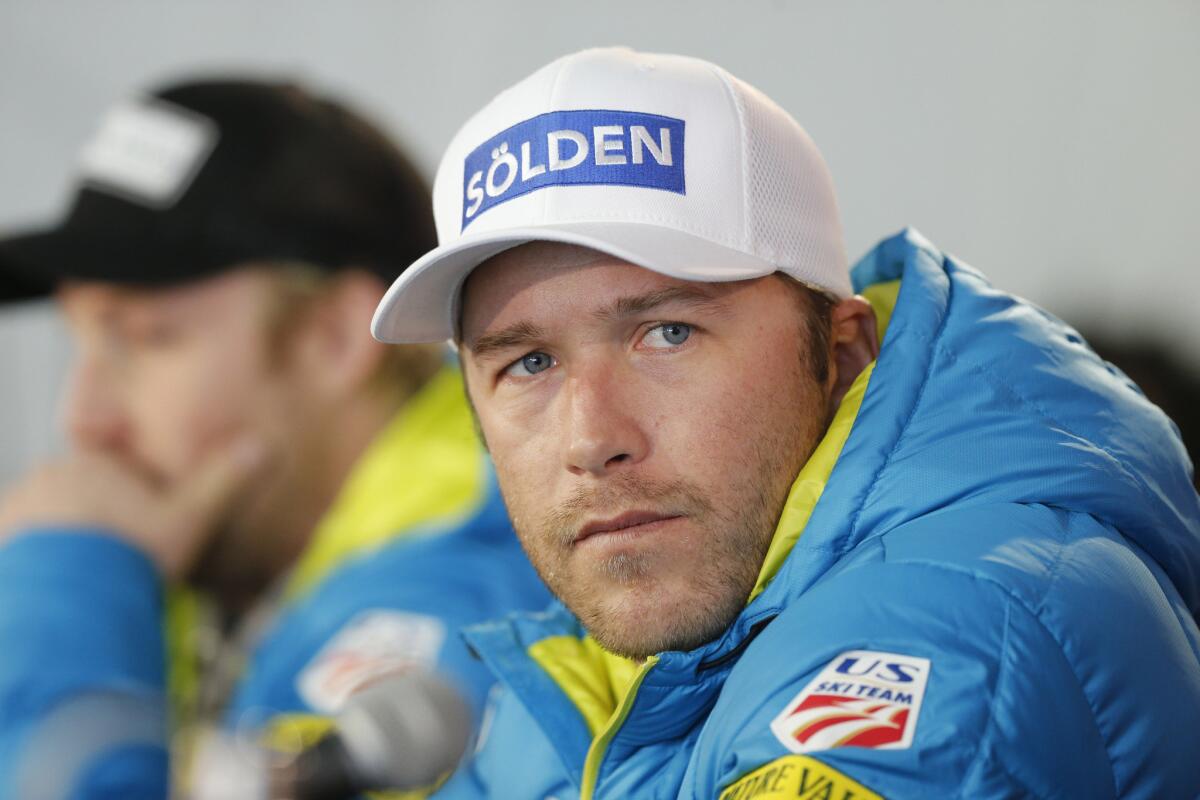
NBC Olympics ski analyst Bode Miller found himself apologizing on-air Thursday for stating earlier in the broadcast that a female skier’s recent struggles were somehow linked to her recent marriage.
Austrian skier Anna Veith won Olympic gold in the super-G during the 2014 Sochi Games and claimed the world title in that event and giant slalom the following year. But she has struggled since multiple knee injuries caused her to miss the 2015-16 season and much of the following season.
As she was competing in the giant slalom in Pyeongchang, NBC announcer Dan Hicks mentioned that Veith “hasn’t been the same” since the knee injuries.
Miller replied: “The knee is certainly an issue. I want to point out she also got married. And it’s historically very challenging to race on World Cup with a family or after being married.”
“Not to blame the spouses,” the six-time Olympic medalist continued with a slight chuckle, “but I just want to toss that out there, that it could be her husband’s fault.”
About an hour later, during the broadcast of the men’s downhill event, Miller apologized for his comment, which aired in the U.S. on Wednesday.
“That was an ill-advised attempt at a joke,” Miller said. “I was an athlete that competed after marriage and I know how beneficial it is. I know the support team you need. I relied on my friends and family. And if you have the luxury of relying on a spouse I know they are inevitably your biggest supporter. And on Valentine’s Day I didn’t mean to throw spouses under the bus. Certainly, I’m going to be hearing it from my wife, I know.”
Miller followed up on Twitter, explaining what he meant to say with his original comment. “To be clear I was not seriously blaming Anna Veith’s lack of results on her husband,” he tweeted. “It’s a changing of priorities that is historically hard, male or female.”
He added: “I had the love and support of my wife while I was racing and I know it can be a huge asset.”
- Share via
Lowell Bailey fails to medal in men’s 20-kilometer individual biathlon
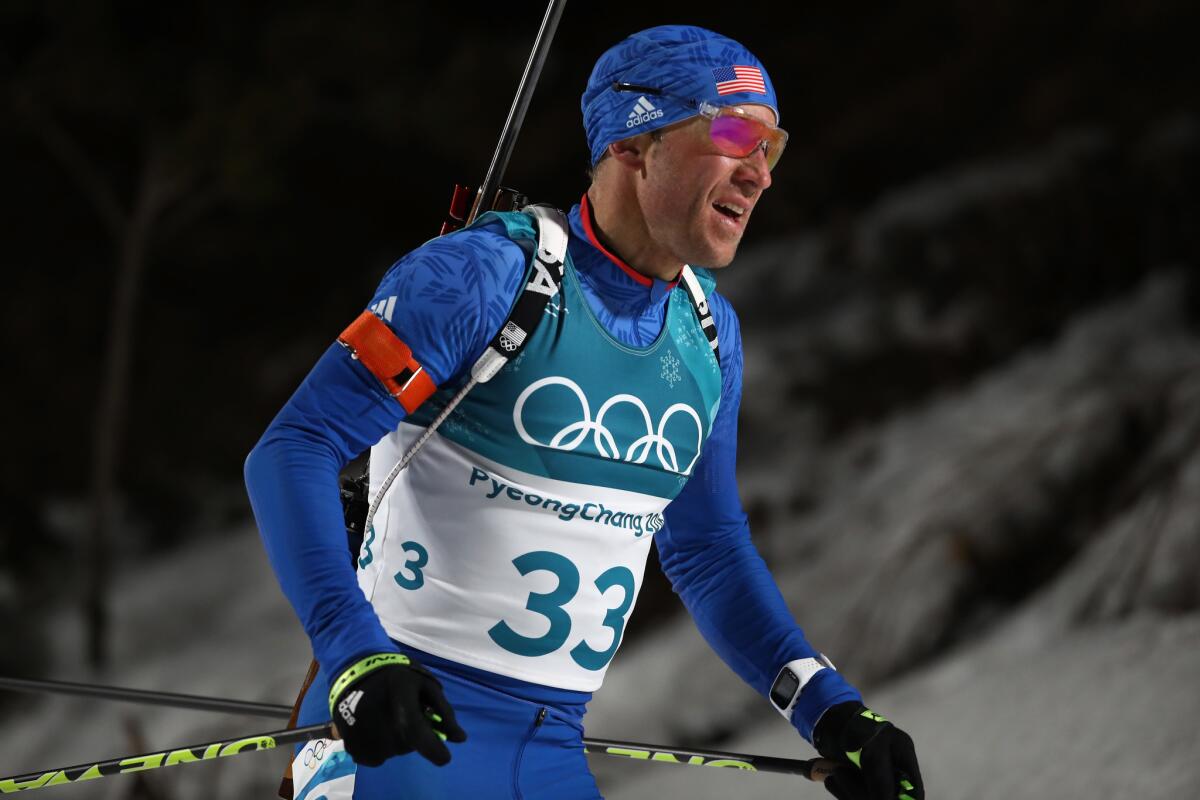
There would be no gutsy finish for Lowell Bailey. Not this time.
The only American to win a world championship in the sport of biathlon fell short of the podium in the third try of his final Olympics.
Bailey finished 51st in the 20-kilometer individual at the 2018 Winter Games in Pyeongchang, just days after similar results in the 10-kilometer sprint and the 12.5-kilometer pursuit.
Competing in the Olympics for a fourth time, the 36-year-old was hoping for the kind of surprise end that earned him a 20-kilometer title at the 2017 world championships. But finding consistent speed has been a problem of late, and his normally dependable marksmanship has deserted him in South Korea.
Among the other Americans in the Thursday night race, Tim Burke finished 41st and Sean Doherty was 44th, meaning that biathlon remains the only winter sport in which the U.S. has never medaled.
Bailey had previously announced that he would retire after this season and move to Montana to oversee a new biathlon training camp.
“I’ve put my heart and soul into this sport for a long time,” he said earlier in the week. “And I’ve really put everything I have into this Olympics.”
- Share via
Thursday’s Winter Olympics TV schedule
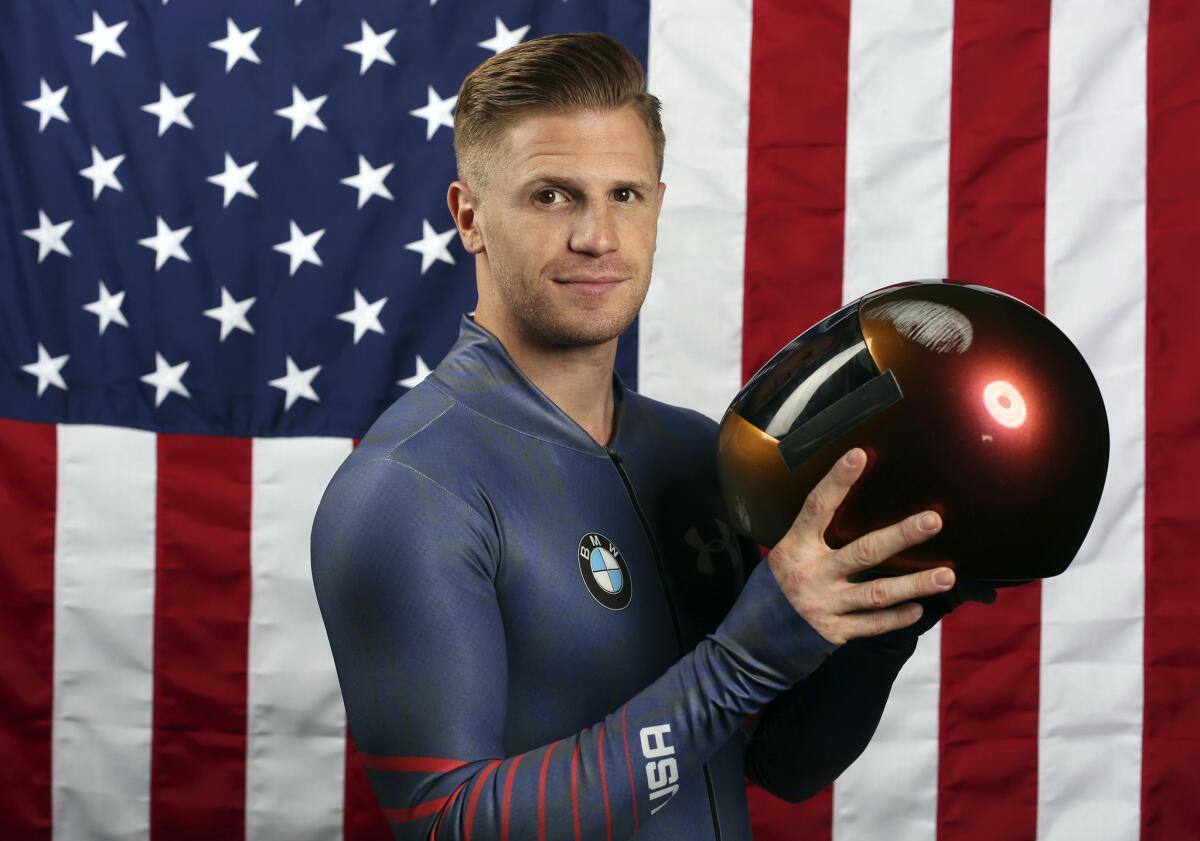
Thursday’s Winter Olympics TV schedule. All times Pacific.
6:30 a.m.: Luge (relay). Speedskating (men’s 10,000 meters). NBCSN
9 a.m.: Biathlon (men’s 20-kilometer individual). NBCSN
11 a.m.: Curling (men, U.S. vs. Italy). NBCSN
Noon: Cross-Country Skiing (women’s 10-kilometer freestyle). Speedskating (men’s 10,000 meters). NBC
2 p.m.: Hockey (teams TBD). NBCSN
2 p.m.: Curling (women, U.S. vs. Switzerland). USA
5 p.m.: Freestyle Skiing (women’s aerials qualifying), Skeleton (men’s skeleton, final runs), Alpine Skiing (men’s super-G), Snowboarding (women’s Snowboardcross), Figure Skating (men’s short program). NBC
5 p.m.: Figure Skating (men’s short program, early groups). NBCSN.
7 p.m. Men’s Hockey (U.S. vs. Slovakia). CNBC
8 p.m.: Curling (men, U.S. vs. Sweden), NBCSN
10 p.m.: Cross-Country Skiing (men’s 15-kilometer). NBCSN
10:05 p.m.: Luge (relay). Biathlon (men’s 20-kilometer individual). NBC
11:35 p.m.: Repeat of 5 p.m. broadcast. NBC
11:40 p.m.: Men’s Hockey (Olympic Athletes from Russia vs. Slovenia). NBCSN
2 a.m. (Friday morning): Curling (women, Sweden vs. Olympic Athletes from Russia). NBCSN
4 a.m. Friday morning): Men’s Hockey (Finland vs. Norway). USA
4:05 a.m. (Friday morning): Highlights from Thursday. NBC
4:10 a.m. (Friday morning): Men’s Hockey (Sweden vs. Germany). NBCSN
- Share via
Mikaela Shiffrin wins gold in giant slalom at Winter Olympics
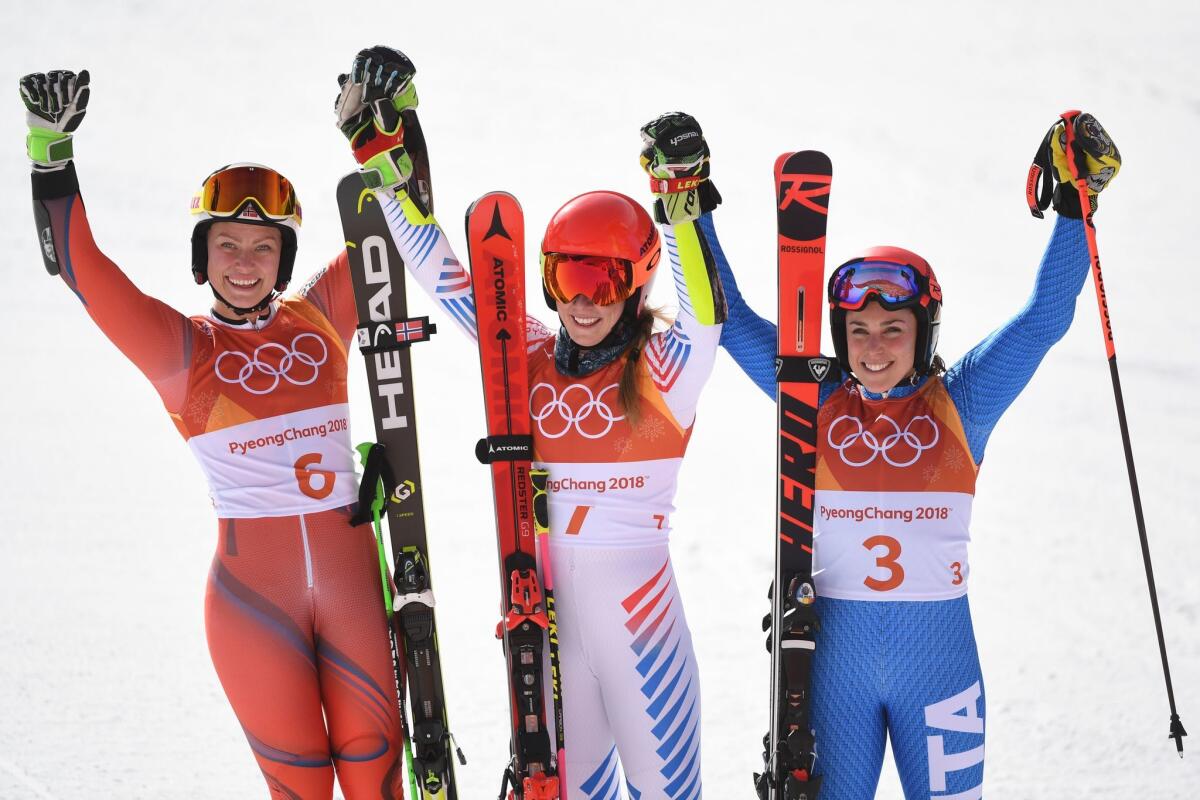
For three days, Mikaela Shiffrin waited as Siberian wind howled through the Taebaek Mountains.
Temporary buildings erected for the Winter Olympics buckled. The wind chill plunged below zero. Debris whipped through the streets. And in a narrow valley named after a dragon, navigating the 1,250-meter Rainbow 1 course at the Yongpyong Alpine Center became a perilous exercise.
The wind forced the postponement of Shiffrin’s first race at the Games once, then twice. The world’s top-ranked Alpine skier jokingly wondered if she’d ever get the chance to compete.
Finally, the wind quieted Thursday. Temperatures climbed into the mid-20s. The sky cleared. As supporters blew horns and clanged cowbells under blinding sunshine, Shiffrin embarked on her much-anticipated quest to make history.
The 22-year-old from Vail, Colo., blitzed through her second run in the giant slalom to win the gold medal by almost a half-second.
“There’s moments when I think, ‘Oh my gosh, what am I going to do?’ and there’s moments where I feel like, ‘No problem,’” Shiffrin said. “I don’t know when it was, at some point today after the first run I thought, like, ‘I can really win this.’ I just tried to hang on to that feeling.”
She will contend for as many as three additional medals in the next week. If the plan works, Shiffrin would be the first U.S. woman to win three Alpine medals in a single Olympics.
After crossing the finish line, she leaned toward the snow, sucked in a breath, then broke into a wide smile as the sparse crowd roared.
“She attacked both runs,” said France’s Tessa Worley, the world’s second-ranked competitor in the event who came in seventh. “It is a good way to do things. … She wanted this medal.”
Norway’s Ragnhild Mowinckel finished second, and Italy’s Federica Brignone placed third.
Shiffrin’s aspirations, however, extend far beyond the lone medal.
She entered the Games having struggled in recent weeks, blaming the uncharacteristic difficulties, which included two seventh-place finishes, on too many races too close together. She arrived in South Korea almost two weeks ago to rest and recover and, after the short break, feels back to her usual grinning, dominant, unflappable self.
That’s a frightening development for other Alpine competitors.
“I have to refocus my energy, but to come to the Olympics after some tough races on the World Cup circuit and, you know, to charge like that,” Shiffrin said, “I risked it on the second run. It’s super-cool.”
She is the heavy favorite to defend her gold medal in the slalom, her best event, Friday. She’s a medal contender in the combined. And, if she has the energy, she could compete in the downhill.
But not the super-G. Shiffrin won’t take part in that event on Saturday because of the adjusted schedule.
“She will have raced and trained — or tried to race — for six days in a row,” her mother and coach Eileen Shiffrin said. “She has to have a day off.”
Sound daunting? Shiffrin is accustomed to breaking ground. She has dominated the World Cup circuit this season, amassing almost twice as many overall points as second-place Wendy Holdener of Switzerland. That included winning five consecutive races — the longest streak in 20 years — in December and January. Shiffrin has already collected 41 World Cup victories — Sweden’s Ingemar Stenmark’s 86 career wins are the most by either gender.
The packed schedule in Pyeongchang — even more challenging after wind led to the reshuffled program — might transform Shiffrin into the U.S. face of these Games.
Even though Shiffrin hadn’t won a giant slalom since Jan. 6 in Kranjska Gora, Slovenia, she delivered the competition’s second-fastest time in her first run through the course Thursday. Her easy confidence afterward hinted at what awaited the other skiers in the final run.
“I also feel like I can go a little bit harder,” Shiffrin said between races. “There’s nothing to hold back.”
She was right.
UPDATE
Feb. 15, 7:10 a.m.: This article was updated with Shiffrin’s decision not to compete in Saturday’s super-G race.
- Share via
Shaun White: ‘I have grown and changed as a person’
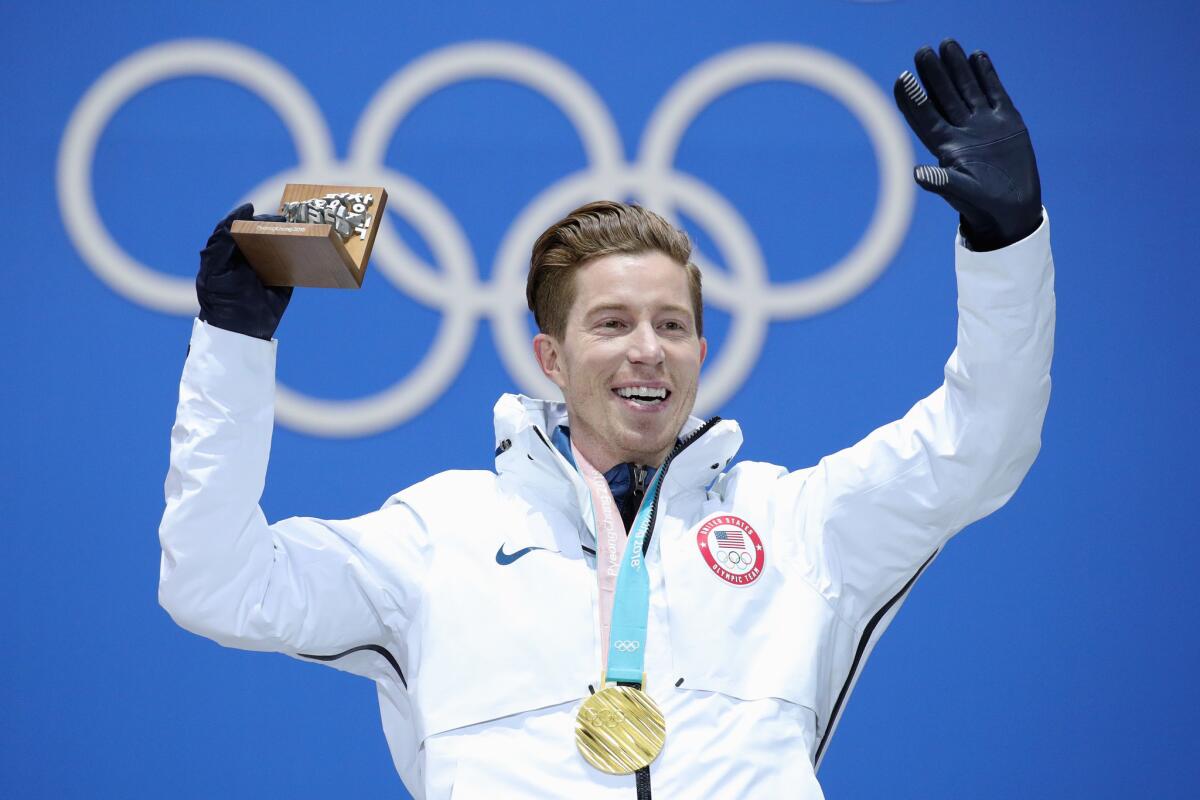
Hours after winning the men’s halfpipe at the 2018 Winter Olympics, Shaun White faced questions about a sexual harassment suit filed by Lena Zawaideh, a former drummer in his band. The claim, which dates to 2016, has returned to the news this week.
“Honestly, I’m here to talk about the Olympics, not gossip,” White told reporters.
“I am who I am, and I’m proud of who I am,” he continued. “And my friends, you know, love me and vouch for me, and I think that stands on its own.”
When a reporter tried to follow up, U.S. Ski & Snowboard official Nick Alexakos interrupted, saying: “I think we’re here to talk about the gold medal.… If you don’t have another question, why don’t you go ahead and pass the mike.”
Later in the day, during an appearance on NBC’s “Today” show, White apologized for using “gossip” in reference to the lawsuit, saying it was “a poor choice of words to describe such a sensitive subject” and that he is “truly sorry.”
In an email to the media, Zawaideh’s attorney took exception, stating: “Mr. White’s comments, on the world stage, directly impugn the character of Ms. Zawaideh. No woman wants to be called a ‘gossip’ or a liar by the harasser.”
White responded to the renewed criticism through his representatives later in the day.
“Representing Team USA at the Olympics in a sport that I love is a true honor and I was thrilled to win Gold. I regret my behavior many years ago and am sorry that I made anyone — particularly someone I considered a friend — uncomfortable. I have grown and changed as a person, as we all grow and change, and am proud of who I am today,” read the statement emailed to the media.
According to the lawsuit, White repeatedly sexually harassed Zawaideh, forced her to watch pornography and told her how to dress and get her hair cut.
The suit also alleged that on separate occasions, White grabbed Zawaideh’s backside, tried to kiss her and shoved a bottle of vodka into her mouth and forced her to drink from it.
The parties settled for an undisclosed amount in May.
- Share via
Shiffrin in good spot for a medal in women’s giant slalom
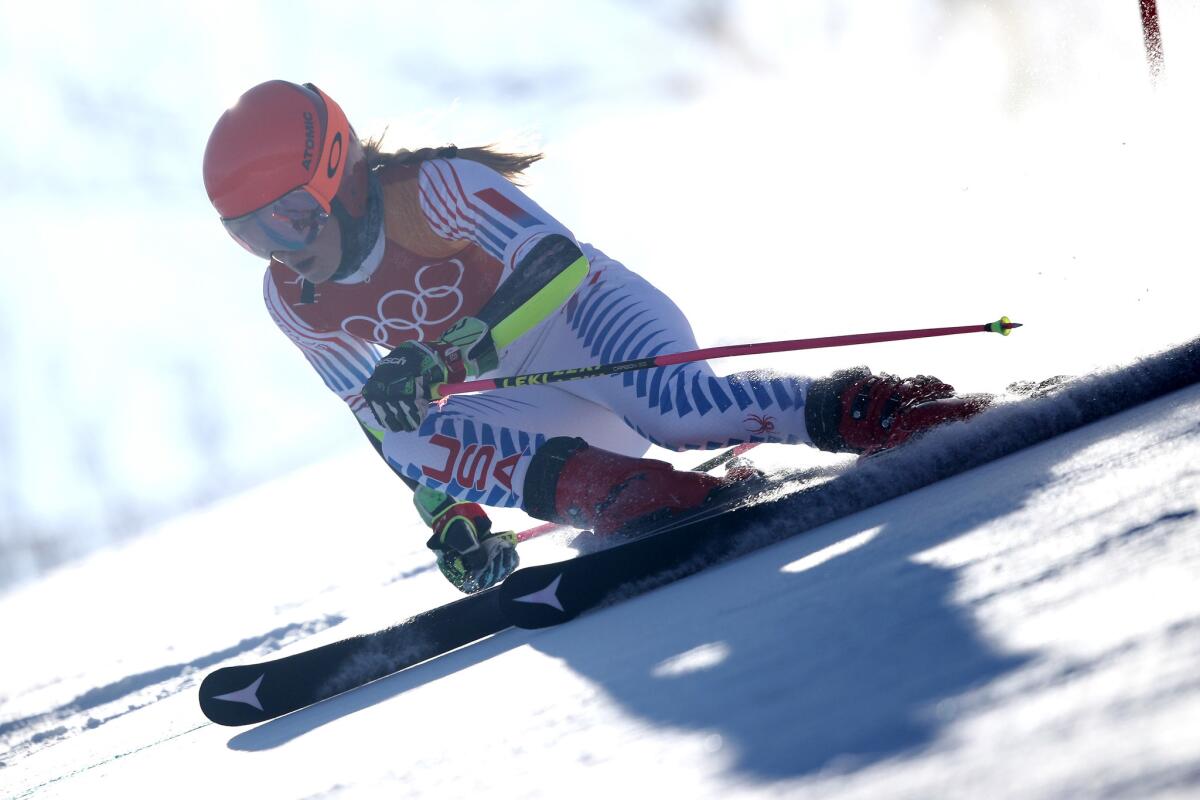
Mikaela Shiffrin is in prime position heading into the final run of the Olympic giant slalom, trailing Manuela Moelgg of Italy by 0.20 seconds.
The American standout attacked the tight course on a fast first run to give herself a chance at a gold medal as she kicks off her Pyeongchang Games. Only a handful of lower-ranked skiers remain on the course.
The top 30 finishers from the first run go in reverse order for the final run, with their times combined to determine the winner. Shiffrin will go second-to-last Thursday afternoon in South Korea.
The 22-year-old finished fifth in the giant slalom at the 2014 Sochi Games. She’s the defending Olympic slalom champion.
- Share via
Mikaela Shiffrin second after initial giant slalom run at Winter Olympics
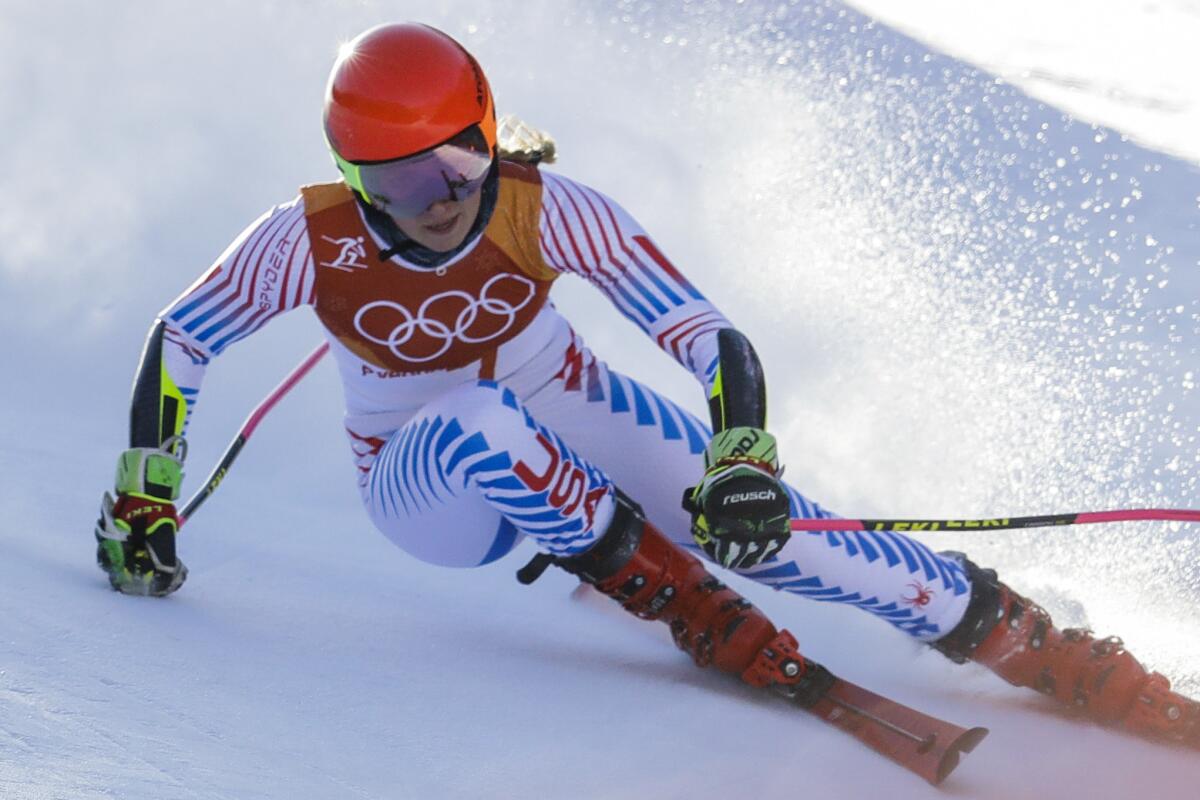
Mikaela Shiffrin finally debuted at the Pyeongchang Olympics on Thursday after two postponements this week because of high winds.
The U.S. Alpine skiing star has the second-fastest time after her initial run in the giant slalom under a calm, cloudless sky at the Yongpyong Alpine Center.
The second runs are scheduled for later Thursday in South Korea.
Shiffrin, ranked third in the World Cup in the event this year, was pleased with the clean run that left her 0.20 seconds behind Italy’s Manuela Moelgg.
“I also feel like I can go a little bit harder,” she said. “There’s nothing to hold back for the second run…. I’m excited to see what I can do.”
The giant slalom was originally scheduled for Monday, but it was one of three Alpine races pushed back because of the winds.
Shiffrin will compete Friday in the slalom, her best event and one in which she’s a heavy gold medal favorite.
- Share via
Lindsey Vonn is looking for love at the Olympics
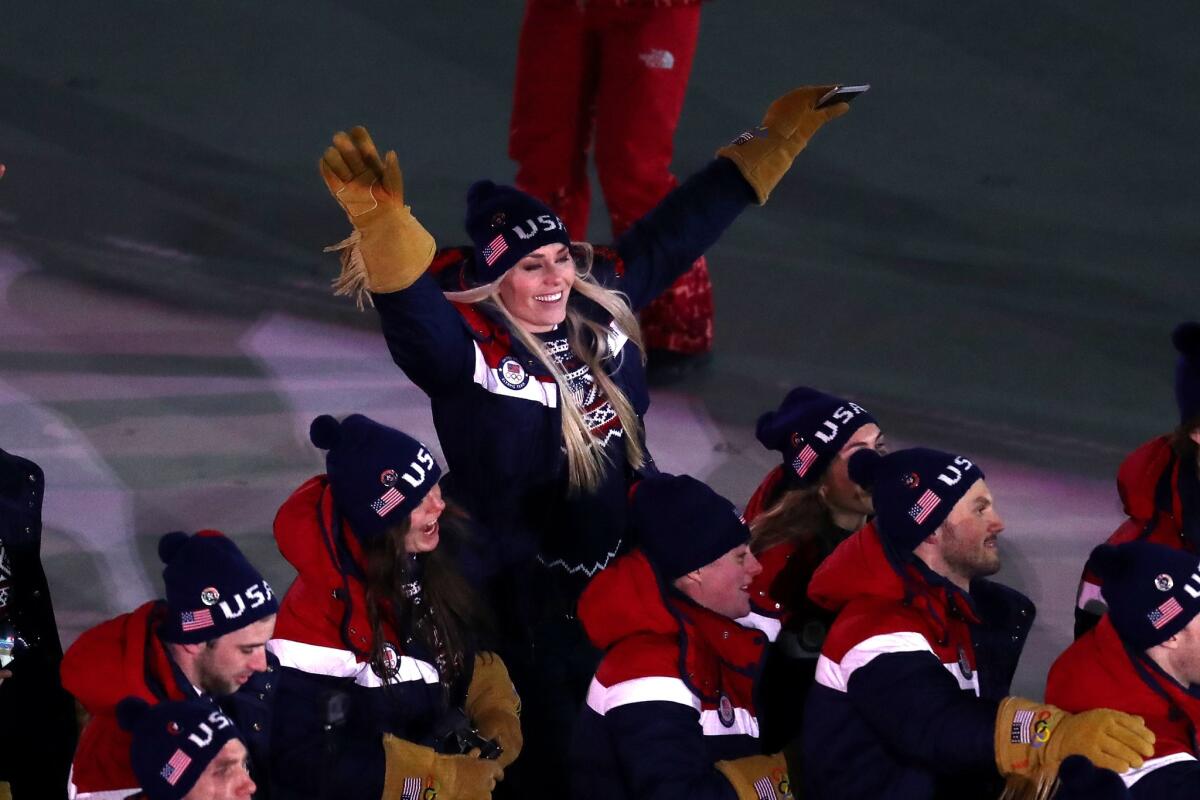
U.S. skier Lindsey Vonn is still two days away from her first evet at the Pyeongchang Games.
And it’s Valentine’s Day.
And she’s single.
Apparently all that led her to send out a playful tweet on Wednesday.
She got plenty of responses, and replied to several of them.
Even Indy car driver Conor Daly took his shot.
Vonn’s first scheduled event is the super-G on Friday.
- Share via
Wednesday’s Winter Olympics TV schedule
Wednesday’s Winter Olympics TV schedule. All times Pacific.
6:30 a.m.: Skeleton (women’s training runs), luge (doubles). NBCSN
8:30 a.m.: Biathlon (women’s 15-kilometer individual). NBCSN
10:15 a.m.: Curling (women, Denmark vs. Sweden). NBCSN
Noon: Luge (doubles), Nordic combined (men’s individual normal hill). NBC
1:15 p.m.: Medal ceremonies from various events. NBCSN
2 p.m.: Men’s hockey, teams TBD, NBCSN
2 p.m.: Curling (women, U.S. vs. Japan). CNBC
5 p.m.: Skeleton (men’s), Speedskating (women’s 1,000 meters), Alpine skiing (women’s giant slalom, first run), figure skating (pairs’ final round). NBC
5:30 p.m.: Figure skating (pairs’ final round, early groups). NBCSN
7 p.m.: Men’s hockey (Finland vs. Germany). CNBC
7:10 p.m.: Women’s hockey (U.S. vs. Canada). NBCSN
9:05 p.m.: Alpine Skiing (women’s giant slalom, second run). Snowboarding (men’s snowboardcross), skeleton (men’s, second run of four). NBC
9:30 p.m.: Curling (women, U.S. vs. Britain). NBCSN
11:05 p.m.: Repeat of 5 p.m. broadcast. NBC
11:30 p.m.: Women’s hockey (Finland vs. Olympic Athletes from Russia). USA
11:40 p.m.: Men’s hockey (Norway vs. Sweden). NBCSN
2 a.m. (Thursday morning): Cross-country skiing (women’s 10 kilometer). NBCSN
2 a.m. (Thursday morning): Curling (women, Canada vs, Norway). USA
2:35 a.m. (Thursday morning): Repeat of 5 p.m. broadcast. NBC
4:10 a.m. (Thursday morning): Men’s hockey (Switzerland vs. Canada), NBCSN
4:10 a.m. (Thursday morning): Men’s hockey (Czech Republic vs. South Korea), USA
- Share via
Shani Davis deserves a better sendoff, but he won’t put the controversy on ice
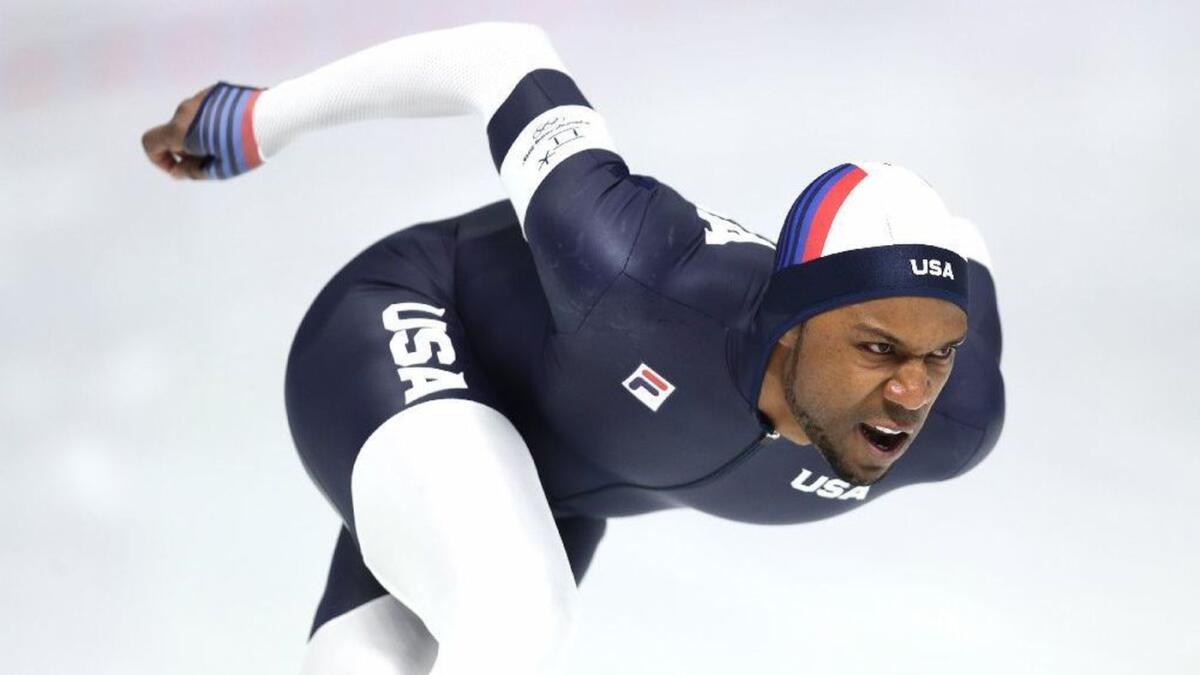
In his latest brouhaha, which is over the flag-bearing responsibilities at the opening ceremony, Davis remains the designated “bad guy” and it’s entirely his fault. He could de-escalate the situation — or, at very least, shift the course of the discussion — but his pride won’t allow it.
- Share via
Shaun White addresses sexual harassment suit, flag flap and rebounding from slump
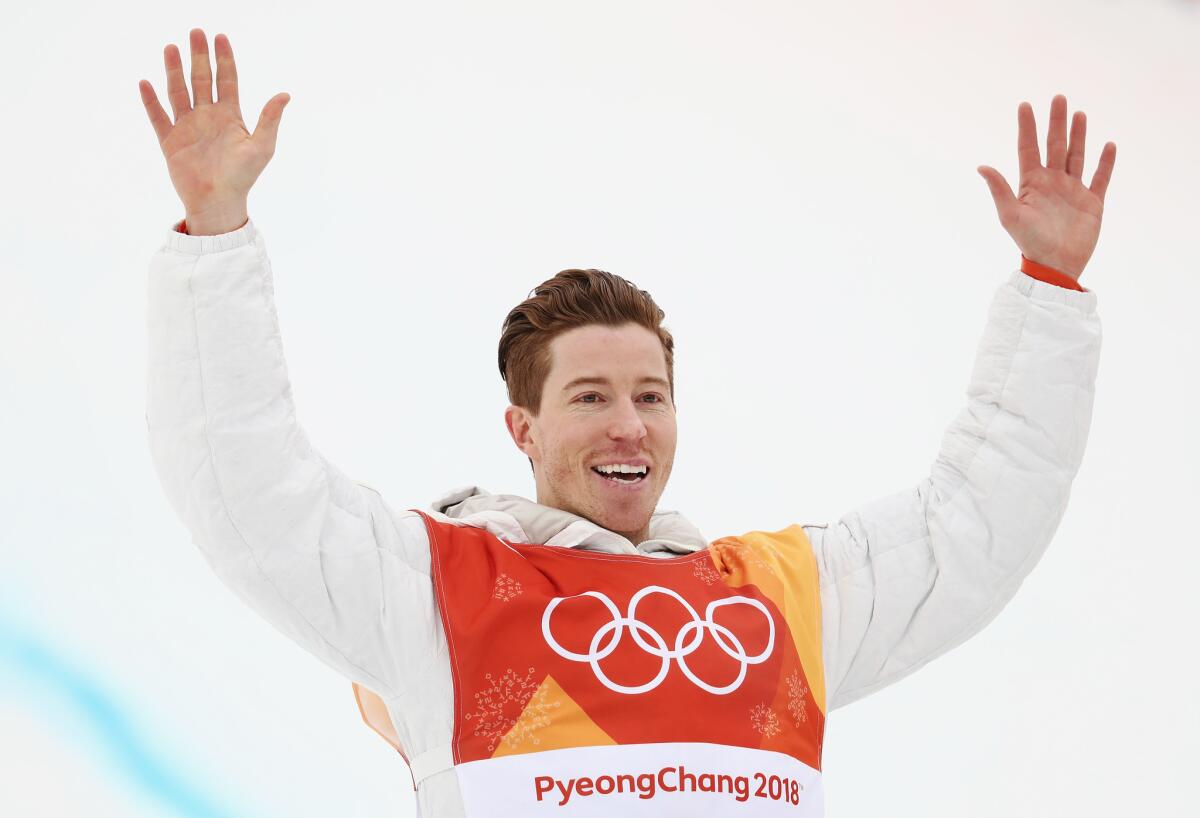
Shaun White’s victory news conference in Pyeongchang, South Korea, on Wednesday evening wasn’t all golden and good news.
Hours after winning the men’s halfpipe at these 2018 Winter Olympics, White talked about the emotions of rebounding from a slump and a bad crash to capture the third gold medal of his career. He talked about his third run of the day, when he landed back-to-back 1440s for the first time in his life.
“I just dug deep and made it happen,” he said.
But there were also questions about a sexual harassment suit filed by Lena Zawaideh, a former drummer in his band. The claim, which dates to 2016, has come back into the news this week.
“Honestly, I’m here to talk about the Olympics, not gossip,” White said.
“I am who I am, and I’m proud of who I am,” he continued. “And my friends, you know, love me and vouch for me, and I think that stands on its own.”
When a reporter tried to follow up, U.S. Ski & Snowboard official Nick Alexakos interrupted, saying: “I think we’re here to talk about the gold medal. … If you don’t have another question, why don’t you go ahead and pass the mike.”
Later in the day, during an appearance on NBC’s “Today” show, White apologized for using the word “gossip” in reference to the lawsuit, saying he used “a poor choice of words to describe such a sensitive subject” and he’s “truly sorry.”
According to the lawsuit, White repeatedly sexually harassed Zawaideh, forced her to watch pornography and told her how to dress and get her hair cut.
The suit also alleged that on separate occasions, White grabbed Zawaideh’s backside, tried to kiss her and shoved a bottle of vodka into her mouth and forced her to drink from it.
The lawsuit was settled for an undisclosed amount in May.
Also on Wednesday, White responded to social media debate about an incident immediately after his winning run when someone handed him an American flag and he let it drag along the snow behind him.
“I was trying to put my gloves on and hold the flag and get my board,” he said. “I definitely didn’t mean any disrespect.”
The Associated Press contributed to this report.
1 p.m.: This article was updated with background information on the 2016 lawsuit against White.
- Share via
U.S. Alpine skier Tommy Biesemeyer out of Games with ankle injury
U.S. Alpine skier Tommy Biesemeyer injured his right ankle during training Wednesday and won’t be able to compete in the downhill.
Teammate Ryan Cochran-Siegle will take Biesemeyer’s place in the downhill Thursday at the Jeongseon Alpine Center.
“I wonder why this happens,” Biesemeyer said in a statement. “It is hard to not think if there is a deeper meaning to it all. You are supposed to be optimistic in times like these and say something like, ‘I will come back stronger than ever.’ But I just can’t bring myself to do it.”
Biesemeyer, 29, would’ve been competing in his first Olympics.
- Share via
Shaun White earns gold medal with epic finish in halfpipe
One of the eateries in this tiny hamlet in the Taebaek Mountains serves hamburgers. One is named after Shaun White.
Its namesake tried one the other day. “It was a magical moment,” he said.
Not quite as magical as what happened just up the hill in Phoenix Snow Park on Wednesday in the finals of the snowboard halfpipe at the Winter Olympics.
It wasn’t that Shaun White won the gold medal; he’s done that twice before. It was where, when, why. And how.
“He’s a psycho,” said fellow American Jake Pates, who finished eighth and was trying to put into words what he just witnessed. “He’s really, really, really good, man. And he can turn it on when he has to, land it when it means something. I think the dude thrives on pressure, honestly. History shows that dude does good when it’s turned up.”
Here’s how much it got turned up:
White, a 31-year-old from Carlsbad, scored 94.25 on his first of three runs to take an early lead, only for Japan’s Ayumu Hirano to do what only he has in snowboarding history and land back-to-back 1440s (four revolutions) for a 95.25. White, figuring he needed to match Hirano, tried back-to-back 1440s in his second run and couldn’t hang onto the landing.
That left him with one run, the last of the competition, and this fate: Do something he never had, or settle for silver.
“Some people are gamers, some aren’t,” said coach J.J. Thomas, the 2002 bronze medalist. “He’s a relentless competitor. He thrives under the pressure. That’s what it takes. He almost needs the pressure to perform.”
White spent the moments before the final run riding loops on the chairlift.
“Anything to distract from this pressure-cooker situation,” White said. “I don’t know. I sat there and looked down at the pipe. I said, ‘I know you got this, you’ve been working on this all your life.’ I dropped in and let all of those cares and worries go away and truly believed in myself.
“I knew I had it in me to do it. And I did it.”
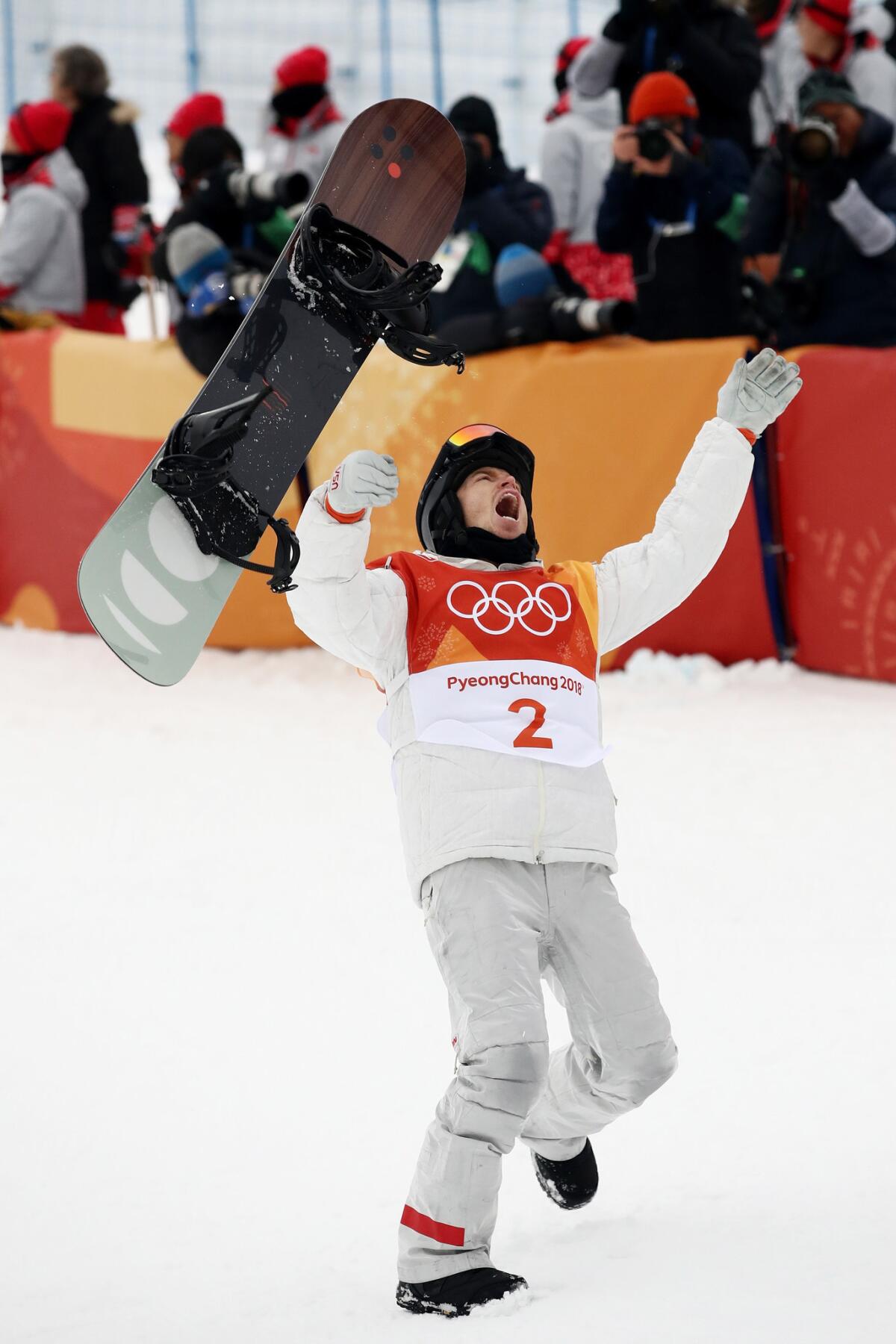
- Share via
Lindsey Vonn uses Twitter to look for a Valentine’s Day date

Chalk it up to the time change from Pyeongchang, South Korea to back home in the States, but U.S. skier Lindsey Vonn forgot that today is Valentine’s Day.
So she did what many would do to find a date on Feb. 14, she went online. Vonn tweeted a request for a date for Valentine’s Day to her almost million followers on Twitter.
- Share via
Mikaela Shiffrin’s Pyeongchang Olympics debut delayed again because of high wind
Mikaela Shiffrin’s debut at the Pyeongchang Olympics will have to wait at least another day, as high winds continued to throw the Alpine skiing schedule into disarray.
The slalom — where Shiffrin is the heavy favorite — was postponed Wednesday after four weather-related delays at the Yongpyong Alpine Center.
The event has been rescheduled for Friday.
“Everyone’s a little bummed out when a day like this happens,” U.S. women’s Alpine coach Paul Kristofic said. “But they do happen to us so we’re quite used to it.”
Temperatures were in the high 20s Wednesday — much warmer than previous days — but winds gusted at more than 20 mph at the base of the course.
Kristofic said winds were forecast to increase throughout the day, creating problems with visibility, safety and the fairness of the race.
Earlier this week, wind forced the postponement of the men’s downhill and women’s giant slalom. Only the men’s combined event — won by Austria’s Marcel Hirscher on Tuesday — has been contested in the 11-race Alpine schedule.
The wind is expected to decrease Thursday, when the women’s giant slalom, featuring Shiffrin, and men’s downhill are scheduled. Friday will also be busy, with the men’s super-giant slalom running in addition to the women’s slalom.
- Share via
Speedskater Maame Biney, cut down in the 500, must wait another four years for her Olympic glory
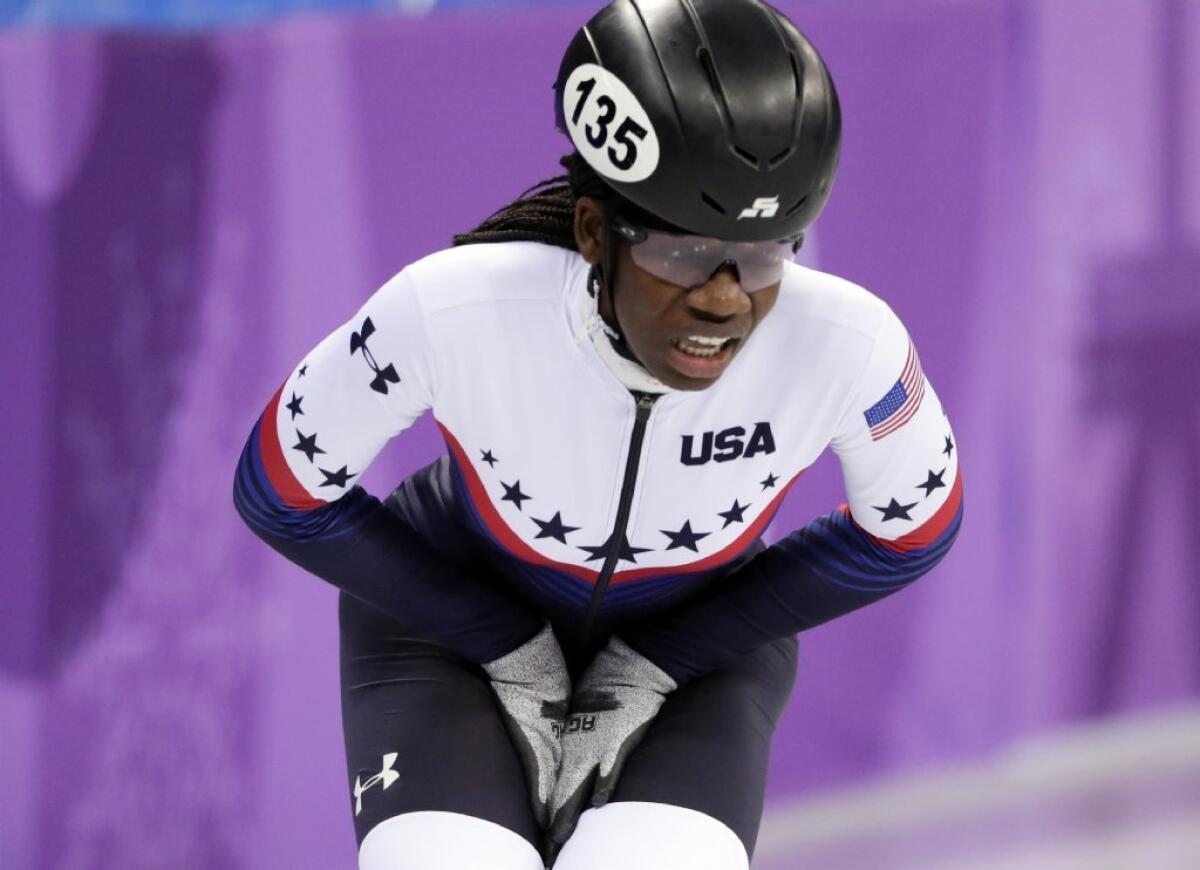
The reservoir of tears that welled up in the eyes of Maame Biney started to roll down her cheeks.
“I just have to wait four more years to be able to get back to this big stage, so I can’t wait until those four years,” she said, brushing aside a tear on the left side of face.
There will be no gold in Biney in her first Olympics — or medal of any color. The always-smiling 18-year-old short track speedskater was eliminated from her signature race in the 500 meters in the quarterfinal round Tuesday night in Gangneung Ice Arena, finishing last in her four-woman heat.
The first African American woman to make a U.S. Olympic speedskating team, Biney failed to respond after the opposition managed to neutralize her greatest weapon — her quick start. Biney used an explosive start to dominate the U.S. Olympic trials but was introduced to a new level of the sport here. Heading into the first turn, she was bumped by Sofia Prosvirnova of Russia. Biney dropped to the back of the field.
Prosvirnova won the race in 43.466 seconds. Biney was a distant fourth in 44.772 seconds.
“I usually don’t get bumped in the start,” Biney said. “It was a big shock to me. I needed to figure out how to get my rhythm back, but I didn’t.”
In the event final staged later that night, Arianna Fontana of Italy claimed the gold medal.
Biney’s Olympics aren’t over. She will race in the 1,500 meters but isn’t expected to contend for a medal.
- Share via
Shaun White goes big in halfpipe qualifying
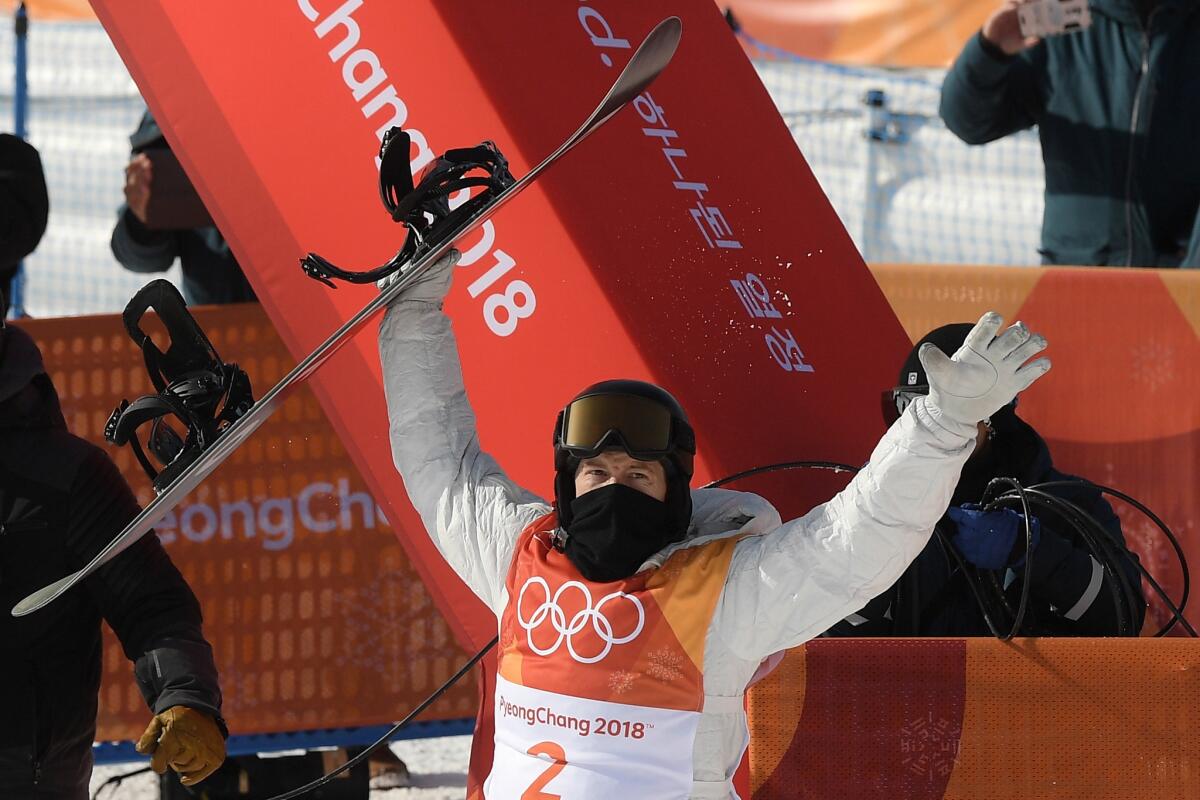
Shaun White thought his day was pretty much over.
Sure, the U.S. snowboarder had one more qualifying run left on the halfpipe, but after posting a 93.75 on his first run White wasn’t planning on doing anything too spectacular the second time through.
But then the two-time gold medalist in the event watched as Japan’s Ayumu Hirano put up a 95.25 and Australia’s Scotty James a 96.75 in their second runs.
So White went ahead and did this.
“I started seeing everybody putting in these great runs and I figured I would just kind of step it up and they motivated me to send it,” said White, whose second-run score of 98.50 was the best of the qualifying round.
“It’s like I knew I had it in me and I watched these young guys completing these amazing runs and it fired me up,” White said.
“I just wanted to show this is what I’ve been doing my entire life and I’m here to put it down.”
White gets the coveted last run of the afternoon in Wednesday’s finals.
- Share via
American Emily Sweeney thrown off sled in luge crash
American luger Emily Sweeney avoided serious injury in a frightening crash that knocked her out of the Pyeongchang Olympics on Tuesday during the final heat of the competition.
The diagnosis was that Sweeney had only some bumps and bruises.”I’m OK,” Sweeney said.
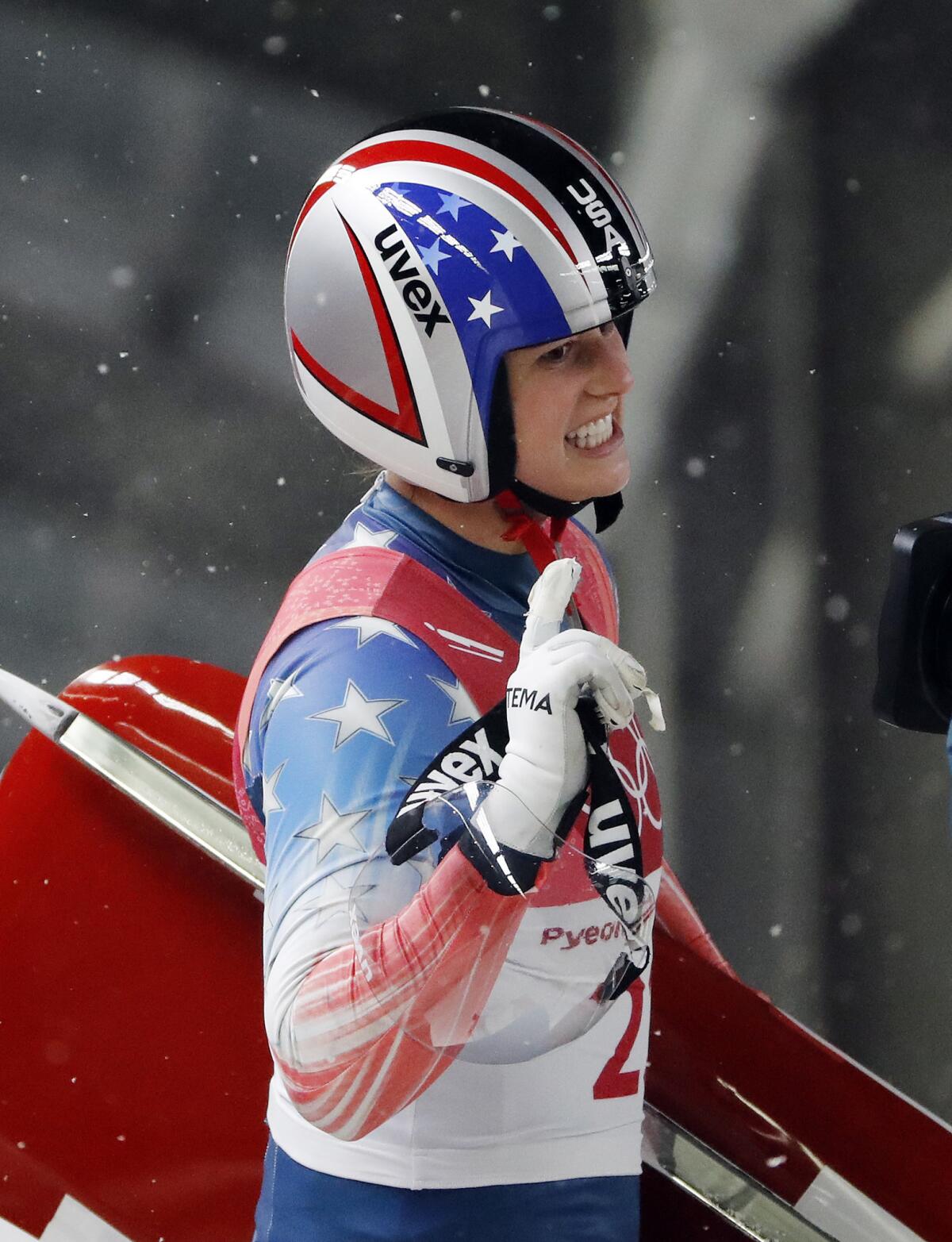
Sweeney lost control around Curve 9, the track’s most treacherous spot, and then began careening all over the track. She wound up sliding feet-first up one curve toward the track roof before getting thrown from her sled and eventually tumbling to a stop.
Many in the crowd looked at the monitors, horrified. The stands were filled with raucously cheering fans who immediately went silent, waiting for a sign that Sweeney would be all right.
It took several minutes for Sweeney to get to her feet, then several more before she could finally start a slow walk to the finish area — surrounded by team and on-site medical personnel.
“I’ve never been so relieved than when I saw her getting up and walking,” said American teammate Summer Britcher, choking back tears.
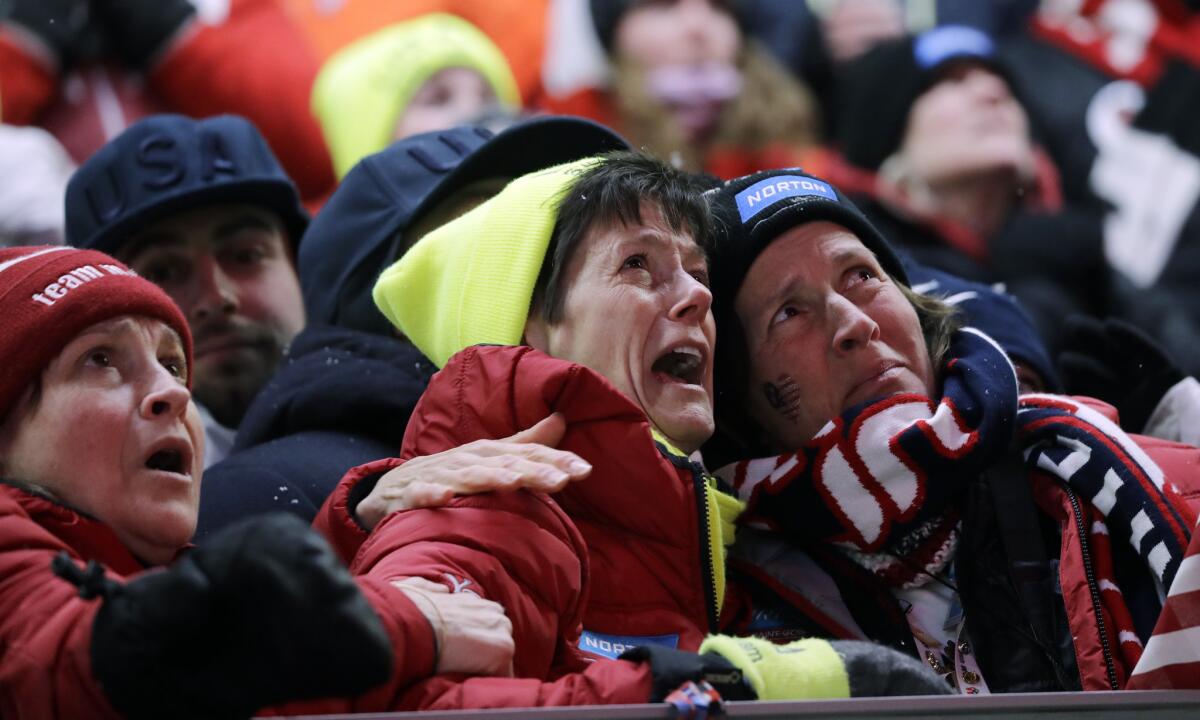
This was the first Olympics for Sweeney.
Curve 9 has been a problem for sliders throughout the early portion of the Olympics, causing many to skid, lose control and lose time. Crashes, however, have not come as often as they did in the 2006 and 2010 Games, both of which left athletes openly complaining about track safety.
Later in the final run, Britcher lost control at the start and collided with some walls — but got down the track without crashing or serious injury.
- Share via
Maame Biney fails to advance in 500-meter short-track speedskating
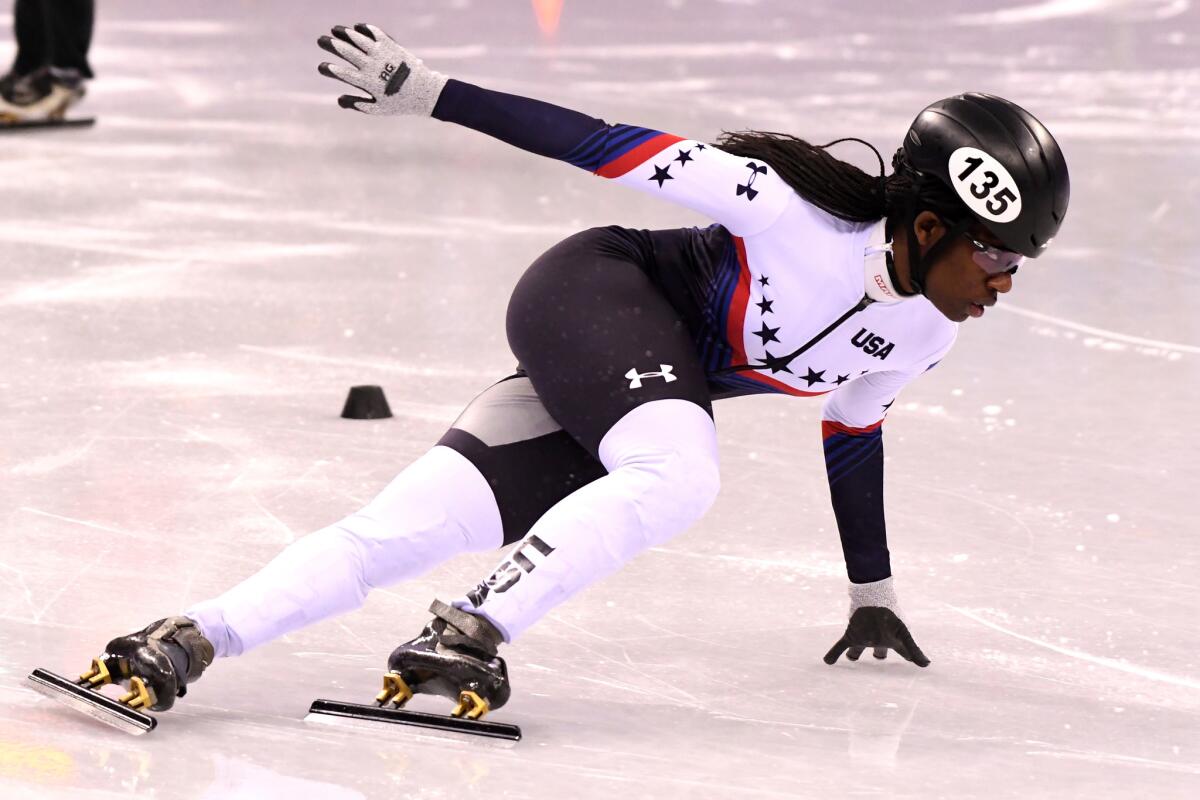
American teenager Maame Biney has been eliminated from the 500 meters in short-track speedskating.
Biney landed in a tough quarterfinal that included former world champion Fan Kexin of China. The 18-year-old from Virginia trailed throughout after trying to go for the lead early and getting crowded out by Fan and Sofia Prosvirnova of the Olympic Athletes from Russia. She finished fourth in her heat with a time of 44.772 seconds.
Only the top two in each heat advance to the semifinals later. Biney still has another event left in Pyeongchang, as she also qualified for the 1,500 meters
Tough luck also befell medal contender Marianne St-Gelais of Canada, who was penalized for impeding shortly after the start of her heat and left the ice.
Among those moving on are Arianna Fontana of Italy, Elise Christie of Britain, Kim Boutin of Canada and crowd favorite Choi Min-jeong of South Korea. Choi survived a three-way photo finish for second and the crowd cheered wildly when she advanced.